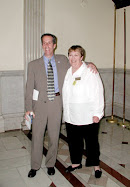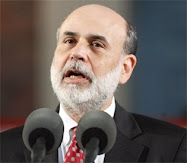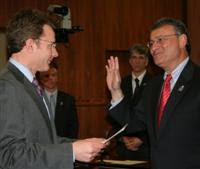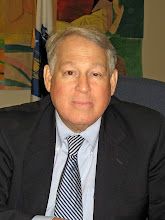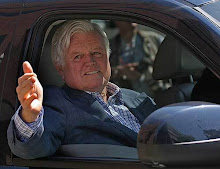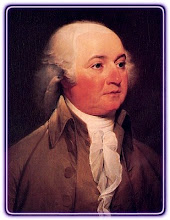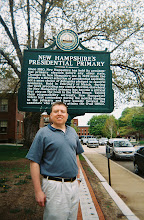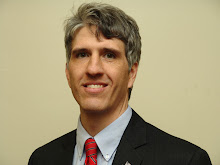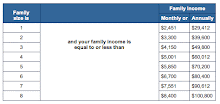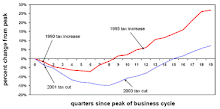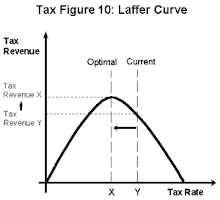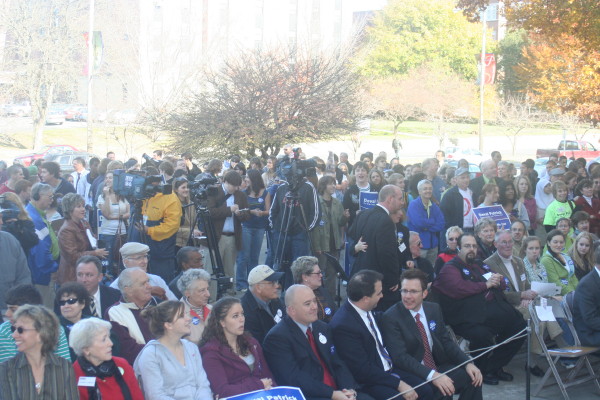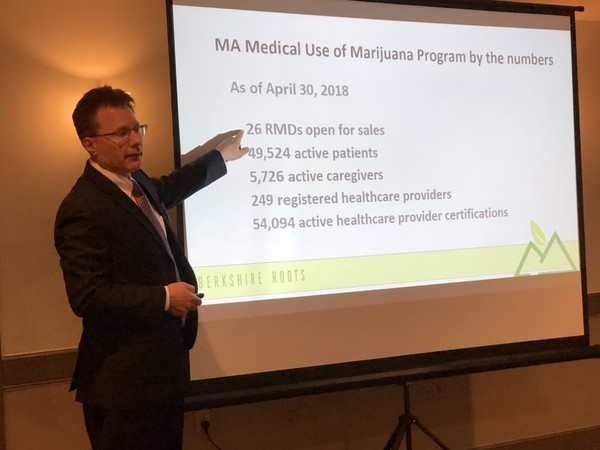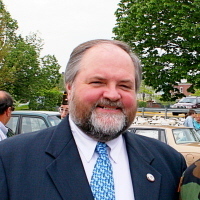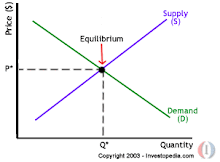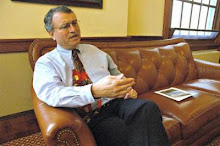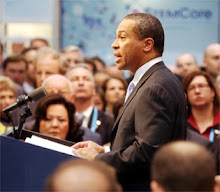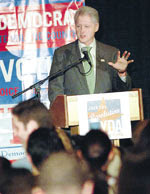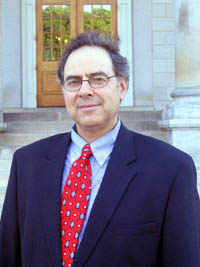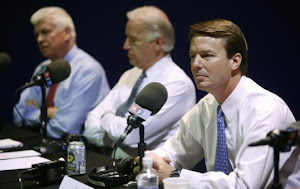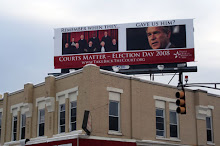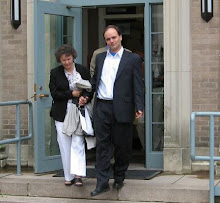December 14, 2022
I read an iBerkshires.com news story about Lenox State Representative Smitty Pignatelli's meeting with the middle school children at the W.E.B. DuBois Middle School in Great Barrington, Massachusetts. The following is my spoof of Smitty Pignatelli's exchange with the 10- to 13-year-old children.
A child asks Smitty Pignatelli about W.E.B. DuBois, who their middle school is named after. Smitty told the children that while W.E.B. DuBois started the NAACP and was a distinguished Sociologist who covered racial issues in American society, W.E.B. DuBois was a registered Communist who openly praised Stalin and Chairman Mao, who each killed millions upon millions more innocent people than Hitler did in the Holocaust. A child asked Smitty Pignatelli if her middle school would still be named after W.E.B. DuBois if W.E.B. DuBois also openly praised Adolf Hiter, too. Smitty Pignatelli told the students that "All Animals are Equal, but some Animals are more Equal than Others!"
A child asked Smitty Pignatelli why he has always voted against Sunshine Laws on Beacon Hill over the past 20 years. Smitty Pignatelli said that if he voted for transparency in Massachusetts State Government then the corrupt career politicians in Boston wouldn't be able to "Cook the Books" anymore. A child asked Smitty Pignatelli if it would be a good idea to not use Creative Accounting schemes to underfund public education by over $1 billion per fiscal year. Smitty Pignatelli replied that it is not about equity, but rather it is about indoctrinating children with propaganda, such as omitting W.E.B. DuBois' support of mass murdering Communist Dictators who killed well over 100 million innocent Peoples.
A child asked Smitty Pignatelli why he always votes himself huge public pay raises as high as 40 percent, while state taxpayers are overtaxed. Smitty Pignatelli replied that he is a proud corrupt career politician in Boston who hopes to stay in office for 42 years until the year 2044 when he will turn 85 years old.
A child asked Smitty Pignatelli why he writes op-eds in the newspaper about Berkshire County's economic struggles such as decades of population loss and the loss of hundreds if not thousands of living wage jobs over the years without looking at himself in the proverbial mirror. Smitty Pignatelli replied that he never takes accountability for his failed public record because he has always voted for increasing state spending, while the tax base continually shrinks in the beautiful Berkshires. A child asked Smitty Pignatelli if his public record in Boston is really the worst of both worlds. Smitty Pignatelli replied that he hopes nobody will write a textbook on bad economics with his photograph on the cover.
A child asked Smitty Pignatelli if he is enjoying his 5 monthslong taxpayer-funded vacation. Smitty Pignatelli replied that the people and taxpayers are a lot better off when he is getting paid for doing nothing than when he is doing nothing but DISSERVICES on Beacon Hill.
A child asked Smitty Pignatelli why Beacon Hill lawmakers are still sitting on billions of dollars is state surplus funds instead of using the funds to help people heat their homes, pay for healthcare insurance, buy groceries, fill up their cars' gas tanks with gas to drive to work, and so on. Smitty Pignatelli replied that Beacon Hill lawmakers only spend money to enrich themselves and their wealthy campaign donors at the public trough.
A child asked Smitty Pignatelli why Beacon Hill lawmakers give Boston area big businesses a little less than $18 billion per fiscal year in state tax breaks, which does nothing for Western Massachusetts. Smitty Pignatelli replied that he is nothing more than a rubber stamp for Boston's corrupt and secretive State House leaders.
A child asked Smitty Pignatelli if he regrets voting for two State House Speakers named Tom Finneran and Sal DiMasi who would later become Convicted Felons. Smitty Pignatelli replied that he supports all forms of corruption and secrecy on Beacon Hill.
The children then gave Smitty Pignatelli the middle finger as he exited the W.E.B. DuBois Middle School.
Jonathan A. Melle
-----
December 17, 2022
Happy Holidays, Erin Leahy at Act on Mass,
I hope that you and your loved ones will have a very Happy Holiday Season. I look forward to your next Saturday Scoop political email about Beacon Hill politics on January 7th, 2023. A new state legislative session will begin a few weeks from now with the first elected woman Governor of Massachusetts, Maura Healey. When I was a student at Pittsfield High School 30 years ago, Jane Swift was my Berkshire County State Senator, and she later became a Lieutenant Governor and then an Acting Governor of Massachusetts one decade later. In between, my dad, Bob, was an elected Berkshire County Commissioner from 1997 - mid-2000.
My predictions for Beacon Hill politics in 2023 are that the 200 State Legislators will happily receive up to three state legislative public pay raises plus public perks. Most of these corrupt career politicians in Boston will happily make over $100,000 per year in public pay plus perks. Governor Maura Healey will propose her long awaited economic development legislation that will spend billions of state dollars on infrastructure along with special interest-backed pork barrel projects. Beacon Hill lawmakers will propose its fiscal year 2024 state budget that will giveaway well over $18 billion in state tax breaks per fiscal year to Boston's big businesses who contribute big bucks to the state politicians' campaign coffers. The state budget will be passed after the July 1st, 2023, deadline. Beacon Hill Officials will continue to operate in secrecy to get away with being corrupt so that they are able to continue to "Cook the Books" to enrich themselves and their wealthy donors at the public trough. Most of the Beacon Hill lawmakers will happily serve as rubber stamps for the top-down State House leadership. The people and taxpayers of Massachusetts will continue to get screwed over by the corrupt career politicians in Boston. Greedy lobbyists such as Dan Bosley will shakedown Beacon Hill lawmakers for more (voluntary) regressive taxation profits from scams such as the state lottery to give the wealthy elites even more millions/billions in state tax breaks and giveaways. Beacon Hill lawmakers such as Smitty Pignatelli will write more of his phony op-eds about how he is fighting for the people in Boston. True progressive politicians such as Andrea Harrington will be disingenuously criticized for all of the problems in Berkshire County and beyond. When someone such as I - Jon Melle - writes and blogs about the political events in 2023, the corrupt career politicians and news media will continue to block and blacklist me from airing my political letters and op-eds. Lastly, Erin Leahy at Act on Mass will continue to fight the good fights in Boston, and we will all support her public advocacy work and look forward to her many political emails about Beacon Hill politics.
Best wishes,
Jonathan Melle
-----
Saturday, December 17, 2022
Jonathan,
The sun is setting at 4:13pm, yuletide carols are in the air, and the race to firm up New Year’s Eve plans is on. This can only mean one thing: we’re approaching the very last days of the 192nd legislative session.
The legislature has mere days left to pass bills before gaveling in the new session on 1/6, and they’ve given no indication that they plan on taking last minute action on any of the bills Baker vetoed, like the 5-year prison construction moratorium or no-cost calls for loved ones of incarcerated individuals.
Yes, it’s infuriating to see the legislature do so little with their incredible power, especially with so much on the line. But this past session is also a testament to how, with concerted organizing and pressure, we can win progressive victories. That’s how we passed (and defended on the ballot!) the Work and Family Mobility Act, banning child marriage, and the Fair Share Amendment, the result of grassroots campaigns that spanned years or even decades.
Let me be clear: you should not have to organize for 20 years to get the MA legislature to implement immigrant protections that 16 other states plus Puerto Rico and D.C. already have. That’s exactly why we so desperately need to reform the state house to combat the culture of careerism and inaction that has made our state government so much slower and more conservative than the people it serves.
But hey, we’re working on it. In the meantime, the path forward for progressive victories is clear: organize, organize, organize. The state house doesn’t pass bold change willingly. We must make it clear that we won’t accept anything less.
Here’s to more calls and emails to reps, grassroots lobby meetings, letters to the editor, petitions, phonebanks, and every other act of democracy in 2023. May your canvasses be merry and bright!
For the last time in 2022, let’s dive in.
State House Scoop
Green Line Extension Medford branch opens
Great news for Somervillians and transit-enthusiasts alike: the Medford branch of the long-awaited MBTA Green Line Extension project opened this past Monday. Hoards of excited commuters, families, students, and elected officials awoke bright and early to hop on the first ride at 5am. But Monday’s revelry was tempered by a harsh and present reality: landlords have been using the added transit stops as an excuse to jack up rents in Somerville, already suffering an affordable housing crisis. As one housing activist noted, the same communities that stand to benefit the most from public transportation are the ones who will likely be priced out because of it. Hopefully the housing crisis will be addressed quicker than the construction of the Green Line extension, which was first pitched a century ago.
Two razor-thin state rep races called for Democrats
5 weeks and two recounts later, two general election state rep races were finally called this week. Democrat Margaret Scarsdale beat her Republican opponent Andrew Shepherd by just seven votes to become the next representative for the 1st Middlesex district. And seven votes looks like a landslide compared to the nail-biter in the 2nd Essex where Democrat Kristin Kassner beat incumbent Republican Lenny Mira by a single vote. It hardly needs to be said but I’ll say it anyway: your vote makes a big difference, and volunteering makes a huge difference. It’s conceivable that if Kassner had one fewer canvassing shifts, she wouldn’t have gotten that one extra vote.
New police recertification process aimed at accountability recertified officers with confirmed history of violence
In response to police brutality and ensuing Black Lives Matter protests in 2020, the Massachusetts legislature passed a sweeping police reform bill that same year. Shockingly (read: not shockingly) the bill was passed largely in secret and was opposed by many racial justice advocates for not going nearly far enough. One provision created a new commission to establish police certification standards that would hold abusive and violent officers accountable. Sounds pretty good, right?
This past week, the first batch of recertifications were released to the public. Among the list of re-certified officers were 18 who had undergone internal investigations, 10 of whom had complaints sustained for “use of force,” “conduct unbecoming” and “[non-]conformance to laws.” Several of the recertified officers had repeated complaints, including Boston Captain John Danilecki, a man once called “the avatar of cop violence in Boston” by the Globe. Created in the name of “police reform,” this commission didn’t even decertify police officers who are known to be violent and abusive. This is another very tangible consequence of passing bills behind closed doors and without the input of the people most impacted by policy.
Legislator farewell speeches
As is tradition on Beacon Hill, lawmakers who won’t be returning for the next session made farewell speeches on the floor this week. Among the speeches were some powerful statements rebuking the status quo on Beacon hill; Rep. Tami Gouveia reiterated her support for the State House staffer’s union and called out the legislature’s failure to act on same day registration and no-cost calls. Sen. Sonia Chang Diaz spoke bravely about the tradeoff she made between pursuing a landmark education funding bill and loyalty to Senate leadership–a decision that she said cost her "political safety, a committee chairmanship, my position in leadership, probably many thousands of dollars in pension benefits.”
In addition to stirring remarks about power and public service were some bizarre pieces of Beacon Hill lore. Rep. Paul Tucker, for example, used his farewell speech to tell a wacky anecdote about the time he went to a legislator's conference in Arkansas with his colleague Rep. Joseph McGonagle. I won’t spoil it for you, but to answer your question: yes, it involves lawn flamingos.
Take Action
Transparency Captain Training: Monday 12/19 @7:00PM
Want to hold a grassroots lobby meeting to ask your rep for their support for public committee votes? Join our Transparency Captain training to get everything you need to have an effective lobby meeting and participate in The People's House campaign for transparency and accountability on Beacon Hill! Sign up here:
RSVP FOR THE TRAINING >>
Letter to the Editor ("LTE") workshop Tuesday 1/3 @6:00pm
Learn how to use the power of the pen for democracy! Join our Letter to the Editor workshop to learn how to write an effective LTE or opinion piece in support of making committee votes public. With the rules vote likely to take place in January, there's no better time to use your voice!
RSVP FOR THE LTE WORKSHOP >>
That was a long one, thanks for sticking it out all the way to the end! There will be no Scoop for the next two weeks; I'll be too busy drinking eggnog and getting my charcuterie boards juuust right. I'll be back in your inbox on 1/7.
I hope your holiday season is filled to the brim with loved ones and delicious food.
Until next year,
Erin Leahy
Executive Director, Act on Mass
-----
December 18, 2022
The news article below is misinformed. I read the Boston newspapers about Beacon Hill politics, and they clearly write that Beacon Hill lawmakers only "work" (part-time) three days a week - Tuesday, Wednesday & Thursday - when they are in formal legislative session, which is not very often. When they are in formal legislative session, Beacon Hill lawmakers only meet for minutes up to a few hours at a time.
In April of 2021, the Boston Globe reported that that Beacon Hill lawmakers giveaway a little less than $18 billion per fiscal year in state tax breaks to their wealthy campaign donors who are mostly in the Boston area. What is wrong with that picture if you are Representative John Barrett III who lives the farthest from the Boston State House of any delegate to Beacon Hill? The answer is that Barrett's mostly rural state legislative district that borders Vermont and New York State receives no economic and financial benefits because the big businesses in and around Boston do not exist in Northern Berkshire County.
I read about the regional divides in Massachusetts politics. Some regions receive a lot more economic and financial benefits from Beacon Hill lawmakers than other regions of the Commonwealth. Western Massachusetts Beacon Hill lawmakers are nothing more than rubber stamp backbenchers to Boston's secretive and corrupt State House leaders. Stan Rosenberg, Dan Bosley, Peter Larkin, and the like, all became high paid registered GREEDY lobbyists on Beacon Hill, which is on top of their state public pensions plus perks. Luciforo became Pittsfield's Pot King by cashing in on his Beacon Hill and Pittsfield politics connections.
What do corrupt career politicians do? The answer is that they spend 90% of their time raising money and the other 10% of the time doing DISSERVICES to the people and taxpayers they represent in elected office. I would NOT feel too sorry for the corrupt career politicians in Western Massachusetts because they are a lot better off than most of the people they represent - do DISSERVICES to - in Western Massachusetts!
Jonathan A. Melle
-----
"Western Massachusetts lawmakers talk long commutes to Boston, progress made on bridging the digital divide"
By Jazmyn Gray, Boston University Statehouse Program via The Berkshire Eagle, December 18, 2022
The sun hasn’t even risen yet, and — chances are — state Rep. Paul Mark, D-Becket, is en route to the Massachusetts Statehouse, where he’ll work until long after the sun has set.
A minimum two-and-a-half hours one-way, Mark’s commutes to Beacon Hill can be long — the days in office even longer — but the incoming state senator knows how important it is to be present. The Statehouse is where relationships are built, where the usually scattered group of lawmakers come together to get things done on behalf of their constituents across the commonwealth.
“It's an issue of being accessible,” he said. “It's a challenge that our colleagues who are within, say, 50 miles of Boston just don't deal with in the same way.”
So he drives — more than 100 miles on the road, making it to Boston just in time for his 9 a.m. meeting.
Western Massachusetts-based legislators have long struggled to visit, access and legislate from a capital that is firmly planted in one of the easternmost parts of the state. While the pandemic laid local concerns about access bare for constituents and legislators alike, many of our lawmakers are still battling to have their challenges recognized and addressed.
Just a few towns over, state Rep. Tricia Farley-Bouvier, D-Pittsfield, grapples with the cost of living six hours round-trip from the building where she works. The office expense stipend granted to legislators who reside more than 50 miles away from the Statehouse doesn’t even come close to covering her total travel expenses.
“Distance matters,” she said. “It’s expensive to be a far-away rep.”
But, like Mark, Farley-Bouvier believes that it’s important to be present, representing her district. So she drives.
In another part of western Massachusetts, state Sen. John Velis, D-Westfield, tries his best to balance being a new parent with his duties at Beacon Hill, knowing that any time he goes into Boston that might be the only activity he does that day.
“If you make me choose between being in my district and being in Boston, I’m always going to choose being in my district,” he said. “The real toll is if you’re in Boston a lot — and I try to be — one of the main downsides is that you’re away from your district more often. You can’t go to an event. You have to miss something.”
But he drives, “being in the room” whenever he can, not caring whether the Legislature is in formal session or not.
Even state Rep. Jake Oliveira, D-Ludlow, who identifies himself as the western Massachusetts legislator with the easiest commute, expects to spend at least an hour and a half on the turnpike to Boston without traffic.
“I always use this point,” he said. “It’s easier to get to three other state capitals than it is to get to my own with traffic. Albany, N.Y., Hartford, Conn., and Providence, R.I.”
Even so, he regularly drives.
Next session, Mark and Oliveira will move to the upper chamber. As a state senator, Mark will represent an area larger than the entire state of Rhode Island. But he doesn’t let the prospect of having to commute among the 57 communities he represents, in addition to the Statehouse, faze him. After all, he’s already taken on one of the most challenging commutes from western Massachusetts, putting an annual average of 60,000 miles on his car as a state representative.
“You don't ever want one of your constituents to think, ‘The person that works for us in Boston, we can't ever get ahold of them,’” Mark said.
So he drives. And, to him, the commutes are worth it — especially given the hoops he used to jump through in order to attend virtual meetings at the height of the pandemic.
A former resident of Peru, one of 46 towns with completed projects by the Massachusetts Broadband Institute’s Last Mile Program, Mark recalls the time he spent as the only legislator without access to cellphone service or high-speed, broadband internet at home.
“It was tough,” he said, “You know, you don’t see it, especially in Boston. So when people were talking about things, they would think it was strange, and I would have to explain to them: ‘No, I don't have the internet.’”
He lived in one of the 53 Massachusetts last mile towns identified by the MBI as lacking the basic infrastructure necessary to support broadband. So, Mark said, he was limited for years in only having access to the internet through a satellite dish service that capped speeds and monthly usage.
“It was really bad,” he said. “It was way behind what everyone else was doing.”
Then, just after the pandemic started, Mark’s home in Peru finally got the infrastructure it needed to run high-speed internet. But not before Beacon Hill was forced online.
Without internet or cellphone service at home at the start of lockdown in 2020, Mark said, he would get in his car before a virtual meeting and drive until he knew his phone wouldn’t drop the Zoom call.
“So I'd be sitting in the car and it would be weird because everyone else is on video,” he said. “And I would have to make sure I told people every time that I'm not on video because I'm in my car.”
From a parking lot at a Hinsdale elementary school closed for Covid to a pitstop after running errands in Pittsfield, Mark’s chosen locations for his car-turned-legislative-office had only one requirement: Reliable service, which, ask any western Massachusetts resident, can be challenging to find all on its own.
Take, for example, the Massachusetts Broadband Institute’s event last week. Held in a western Massachusetts town, the event highlighting the Last Mile Program’s progress in bringing broadband to the commonwealth’s most underserved areas hosted legions of local legislators. But it ironically ran into a telecommunications access issue of its own when visitors couldn’t get cellphone service.
State Rep. Lindsay Sabadosa, D-Northampton, who attended the event outside her district, said she didn’t realize there was a problem at first. But, as she was driving back toward her district, she said, a flurry of messages came in. The missed texts and emails warned her about a “major crisis” at her legislative office.
“Cell reception at this point is just really critical. Everyone expects you to be available at a moment’s notice — I think we want to be available at a moment’s notice — but that can make it really challenging,” she said. “Once I left, I was able to get on it, but our delay is really problematic.”
This dark side of the digital divide stretches across western Massachusetts to affect both local constituents and legislators. While some officials, like Mark, have no choice but to tackle the issues facing them and their constituencies in real-time, others, state like Rep. John Barrett III, D-North Adams, are thinking long-term about ways the Legislature can help close the gaps.
“Everybody used to be worried about the new highways coming here to Berkshire County, going back years and years,” he said. “We finally realized that we have to be on that information highway — we have to be in the high-speed lane. And I think that's just critical. That's really been our focus.”
Last month, the commonwealth took new steps toward alleviating some of these inequities by allocating $50 million in American Rescue Plan Act funding to digital equity activities. The recently passed Economic Development package also included funds for some of the unique issues facing western Massachusetts residents — including $75 million to support broadband infrastructure and internet access — while the government promised $275 million earlier this summer to the long-awaited east-west commuter rail project.
Sabadosa said these funds are just the beginning in a long list of wins for western Massachusetts, proving that the challenges of working as a rural legislator are ultimately worth the satisfaction of helping your community get the help it needs.
“I hope [the challenges don’t] discourage people from running for office,” she said. “It really is a wonderful thing to do.”
Just take it from Mark, who worked as a telephone lineman before entering the Legislature.
In 2004, he remembers, he would go to work splicing fiber optics for “ultra-high fast service” in Woburn, thinking “it would be cool” if he could access the same thing at his rural home. More than 18 years later, the senator-elect is getting his wish.
With his recent move to Becket, another recently completed last mile town, Mark said he can finally expect to have the same, stable access he helped establish in eastern Massachusetts all those years ago. At home, he no longer has to worry about dropped calls or limited internet service. His car doesn’t have to double as his office. He can finally turn his camera on in Zoom meetings.
Mark said the issue of access remains top-of-mind for local communities and the rural legislators who represent them, championing an equitable distribution of resources statewide.
“I think our perspective made a difference and has an impact,” he said. “It's taken a lot longer than I think people want, but we have been getting there. And I think we're almost where we need to be.”
And that, he said, is why he drives. Making it to Boston just in time for his 9 a.m. meeting.
-----
December 20, 2022
Happy Holidays, Erin Leahy at Act on Mass,
I agree with you that the people and taxpayers of the Commonwealth of Massachusetts "deserve to see how our State Representatives vote". I agree with you that it is wrong that "the Massachusetts State House is infamously one of the least transparent in the country and is in the minority of states that don’t make all committee votes public. Even the State Senate publishes their committee votes, but the House has refused to adopt this basic, zero-cost good governance measure."
The reason why most of the Beacon Hill lawmakers are both secretive and corrupt is because it allows them to "Cook the Books" for "the Almighty Dollar" for political power so that they are able to get away with enriching themselves and their wealthy campaign donors at the public trough, while the people and taxpayers they - in theory - represent receive underfunded public services, including the systemic underfunding of public education in Massachusetts by over $1 billion per fiscal year.
If the corrupt career politicians in Boston opened their "Cooked Books" to the proposed Sunshine Laws then they would no longer be able to giveaway a little less than $18 billion per fiscal year in state tax breaks to their wealthy donors, according to a Boston Globe news article from April 2021.
You, Erin Leahy, wrote: "Act on Mass was founded to hold the State House accountable to everyday people–not corporations, not lobbyists. And accountability starts with showing us how they vote."
My response to you, Erin Leahy, is that the only way to meet your public advocacy organization's lofty goals is to organize grassroots movements across Massachusetts to vote out most of the corrupt career politicians who have made a corrupt career for themselves serving in the Boston State House. To illustrate, Smitty Pignatelli has served in Boston for the past 20 years, and he has always voted against proposed Sunshine Laws to open up Beacon Hill's "Cooked Books". The people of Southern Berkshire County would have to spend the next two years organizing a grassroots effort to oust Smitty Pignatelli from being reelected to his 12th term in the State House in 2024. I wish it would happen, but it never does, which means Smitty Pignatelli will probably serve in Boston for 42 years until he is 85 years old in 2044 - almost one-half of Smitty Pignatelli's life will probably be spent as a corrupt career politician in Boston.
I wish I could help you, Erin Leahy, to achieve your lofty goals for grassroots democracy on Beacon Hill, but I am a disabled Veteran who is just getting by in my life. Please know that I fully support your work as the Executive Director at Act on Mass. Thank you.
Best wishes,
Jonathan Melle
-----
…but they do agree on this, Jonathan: we deserve to see how our reps vote.
The Massachusetts State House is infamously one of the least transparent in the country, and is in the minority of states that don’t make all committee votes public. Even the State Senate publishes their committee votes, but the House has refused to adopt this basic, zero-cost good governance measure.
Act on Mass was founded to hold the State House accountable to everyday people–not corporations, not lobbyists. And accountability starts with showing us how they vote.
Can you make a small end-of-year gift to Act on Mass today to sustain our fight for democracy on Beacon Hill?
MAKE A SMALL GIFT >>
Since our founding in 2019, we at Act on Mass have accomplished big things with our little budget. Our non-binding ballot question about whether reps should make all committee votes public has now been on the ballot in a total of 36 districts–16 in 2020, and a record-breaking 20 districts in November. Over the past four years, 87% of voters have said YES: we want our reps to make all committee votes public.
But that mandate means nothing if we don’t put it to work through sustained, strategic organizing and advocacy. And we can’t do that without your help. Will you chip in today to ensure we can continue to campaign for commonsense democracy reforms?
Sadly, we’re still way behind what we need to raise by the end of 2022–$3,962 behind to be exact. Anything you can comfortably give to help us close the gap would mean everything to us; more precisely, it would mean we can keep doing our work of holding the State House accountable.
In solidarity,
Erin Leahy
Executive Director
Act on Mass
-----
Midday Magazine: "Berkshire state legislative delegation dean Smitty Pignatelli reflects on 2022, looks forward to a year of change"
WAMC Northeast Public Radio, By Josh Landes, December 22, 2022
Smitty Pignatelli, the Democratic state representative from the Southern Berkshires, is the region’s longest-serving politician. In November, he extended his 20-year run in office with a dominant victory in the general election for the 4th Berkshire District seat. 2023 represents a year of major changes to the Massachusetts political landscape: Incoming Democratic Governor-elect Maura Healey will replace Republican Charlie Baker after eight years, and the Berkshire delegation will both lose a seat in the House and see a new State Senator, current Democratic State Representative Paul Mark. WAMC spoke with Pignatelli about 2022, the road ahead for the county, and the end of the Baker era.
PIGNATELLI: I think the Baker-Polito administration really did an excellent job. Clearly, they've left behind some problems that we're going to have to deal with going forward, like the MBTA. But I think they really put a focus on every municipal city in town in Massachusetts. And Karen Polito, who’s a personal friend of mine for 20 years now, she has been the most active Lieutenant Governor I recall in my life. She had visited every single community at least twice in Massachusetts, and I think that spoke volumes about their commitment to every little corner of the commonwealth. And what we talk about all the time, Josh, as you know, is regional equity. Don't forget Western Massachusetts. And I really have to say that I think the Baker-Polito administration did a very good job trying to tackle some of the Berkshire problems that we're dealing with.
WAMC: Now, in just a few days, Governor elect Maura Healey will be sworn in to take over the corner office on Beacon Hill. What are some of those things that you feel like maybe the Baker administration left behind that you would like Maura Healey to address during her tenure?
I think the infrastructure is going to be a huge issue. I mean, we're going to be talking a lot more about west-east rail, where it begins, where it ends. I mean, these are economic opportunities for the next generation or the next 100 years. So, I'm in hopes that the Healey-Driscoll team will kind of pick up the ball from there and get these things done. Roads, bridges, sewer, water, infrastructure, are the issues that I personally believe as a former selectman are the issues that will could bankrupt some of our communities here in the commonwealth if we don't partner with them to try to help alleviate those costs. So, I think there's a lot to do. And I trust that, you know, Healey will pick up on the good things, and try to straighten out the missteps of the previous administration. But I'm personally very excited about the new opportunities that come with the new administration.
It's also the end of the legislative year on Beacon Hill. Smitty, as you look back over 2022, what stands out to you about the issues that were deliberated and voted on in the state legislature?
I think, as you know, the last couple of years have been very challenging with COVID. People lost their jobs, businesses shut down. So, I think we're trying to slowly rebuild some of that. I think people, businesses fared very well that did stay open, the ones that adapted to the pickup and delivery for restaurants. People are finally getting back to work. So, I think we just have to make sure we stay the course and maybe double down on education because I think there's been a little slip with, are you remote? Are you hybrid? Are you in school? Are you out of school? I think the impact on young people mental health-wise has been a challenge and I think we need to pay attention to that going forward. But the last couple years have been a challenge. I think the state really stepped up in a big way to help out individuals and businesses. And hopefully we're over it, and then in ‘23 will be a banner year.
When it comes to regrets or frustrations from the 2022 legislative session- Talk to me about that. What didn't go the way you wanted it to? And what got overlooked in 2022?
That's a great question. I think that's a really hard question to answer, actually, because I think we had so many good successes. Because of COVID, some of the other individual priorities had to take a backseat. I've been really pushing, as you know, opioid addictions and mental health. Those are things that kind of slipped back because we weren't actually in person, in session, and other things had to take precedent. The number of opioid deaths in the Berkshires and the commonwealth have risen, highest numbers since before COVID. So, I think we have to tackle that early on. I actually had some meetings yesterday with the Police Chiefs Association and the Fire Chiefs Association about my Narcan bill that requires every first responder to carry Narcan as a lifesaver of the opioid overdoses and deaths, unfortunately. So, I just hope that we can hit the ground running in January. We get sworn in on the 4th, the new governor comes in on the 5th, and then I think it's time to get to work.
In 2023, following redistricting, we'll see a different Berkshire County legislative delegation- Just three state reps: you, Tricia Farley-Bouvier, and John Barrett, with former State Rep. Paul Mark moving to take over the seat of former State Senator Adam Hinds in the house’s higher chamber. Talk to me about that- With this condensed delegation, are you concerned at all about the voice of the Berkshires on Beacon Hill in 2023?
I'm always concerned about the small number of voices we have in all of Western Massachusetts. Sadly, the Berkshires lost a representative voice. The good news is that voice moved over to the Senate. So, I think the nice part about the remaining House seats in the Berkshires is that all three of us only have Berkshire County. So, Rep. Barrett, who had a couple of towns outside of Berkshire County, I had three towns for 20 years outside of Berkshire County- Now we can say all three of us only represent the Berkshires, and I think that's where our collective view of the world should be. Senator, soon-to-be Senator Mark has a much larger district, but the core is still the Berkshires. So, I think we have a lot of work to do. As long as we've worked together and we're all in the same direction, I think we'll be successful.
Now you've spoken about regional equity, education, and infrastructure. But when you and your fellow state reps from the Berkshire sit down to start to lay out your agenda for 2023, what do you think will loom large over that conversation?
I think the regional equity is going to be real, I think what the Berkshire delegation is trying to do is build a larger 413 delegation. So, it's Western Massachusetts. So, when we talk about capital investments, like the west-east rail, that could be a real game changer. I'm a big believer of the live here, work there mindset. We have proven during COVID that people came to the Berkshires, they bought real estate, they moved here, because of the natural social distancing. What are we going to do to keep them here? I think transportation, broadband investments, those are things we’ve really got to focus in on so that a couple of years from now, people say, oh my god, the Berkshires are beautiful, unbelievable natural beauty, world class culture and the arts. But I couldn't complete a Zoom call on my phone. I couldn't even scan a barcode on a restaurant menu. So those are the investments we need to make, and I think we're going to start reversing the decline in population that we've experienced, and hopefully start filling some of the many hundreds of jobs that are still open here in Berkshire County. So those are the opportunities we have with every challenge, and I think we're ready to meet that moment.
There's still frustration in the town of Great Barrington about state funding for the ongoing water crisis in Housatonic. The selectboard at their most recent meeting was voicing some displeasure with how an economic package overly emphasized a shuttle system between Wassaic and the town over efforts to ameliorate the ongoing crisis there. Any words for the folks in Great Barrington who are looking to see more from the state about the Housatonic water situation?
I've been in regular contact with town officials and the DPW. What makes it very difficult is that they’re a privately owned water company. I personally there, again, as a former selectman, think that the town should and needs to get much more aggressive with them. But I'm not sure if there's a role for the state. Their water’s being monitored on a regular basis, it’s being tested. It’s disgusting what's going on down there, but they're currently in a pilot program under the direction of the DEP on this water filtration system. So far, it's working. It's going to be a slower process. But I think at the end of the day, when I look at the capital needs of the Housatonic Water Company, I think the owner has to step up to the plate, or turn it over to the town, or sell it to somebody else is in a better position to do that. The Housatonic Water Company, a privately owned company is eligible for the State Revolving Fund for financing. These are zero loans, 1% interest loans- They have yet to apply to that. So, the state is ready to help. But you know, we can't overtake them without any good town support. So, I understand the frustration from the townspeople of Housatonic. We are doing everything that we can within our legal bounds to do that. I think the town officials need to get far more aggressive than they have in the past.
-----
December 23, 2022
The Dirty Bird (Berkshire Eagle)'s editorial about Governor-elect Maura Healey's pledge for Sunshine Laws in Beacon Hill politics omits the following points:
* Beacon Hill lawmakers are mostly corrupt career politicians who always vote down Sunshine Laws in state government because they "Cook the Books" to giveaway a little less than $18 billion per fiscal year in state tax breaks to their wealthy campaign donors - mostly in and around Boston - for the financial, corporate and ruling elites to all enrich themselves at the public trough
* Over the past 20 years, Lenox State Representative Smitty Pignatelli has always openly supported secrecy in Beacon Hill politics; and he has always voted against Sunshine Laws in state government, yet the Dirty Bird (Berkshire Eagle) has always endorsed Smitty Pignatelli for reelection every two years; What gives?
* State Senator-elect Paul Mark, and State Representatives John Barrett III and Tricia Farley Bouvier have voted against Sunshine Laws in state government, too - despite then-candidate Tricia Farley Bouvier's 2011 campaign promise to support Sunshine Laws as a State Representative in Boston!
* The Berkshire delegation are all rubber stamp backbenchers for Boston's corrupt, secretive and top-down State House leadership, which means they all do DISSERVICES to the people and taxpayers they represent - in theory - in their Berkshire-based state legislative districts
* All of Beacon Hill's endless special interest financial shell games do a DISSERVICES to Berkshire County - along with other regions of Massachusetts - because there are little to no wealthy campaign donors outside of the Boston area, which means all of the economic and financial benefits go to Boston, while the rest of the state has to pound sand
* I believe that Beacon Hill lawmakers' endless financial shell games mock distressed "Gateway" cities such as Pittsfield with their (voluntary) regressive taxation schemes such as the state lottery SCAM because they allow Beacon Hill lawmakers and GREEDY lobbyists such as Dan Bosley to giveaway millions and billions of dollars more in state tax breaks to Boston area big businesses who donate and pay off the corrupt career politicians and shakedown lobbyists in Boston
* If Beacon Hill lawmakers were honest - and Pigs would have Wings and Fly around Unicorns in fields of plenty and then visit Santa Claus in the North Pole - then "Gateway" cities such as Pittsfield would finally be made whole by Boston with fully funded state aid and public education aid instead of Pittsfield being mocked by Boston with Beacon Hill's endless financial shell games via their "Cooked Books"
Lastly, what impresses me about Pittsfield Mayor Linda Tyer is that she is nobody's fool because she understands what is really going on in Massachusetts state government. I know this because I have read interviews with her where she has spoken out for the dozens of distressed cities throughout the state. Go Linda Tyer! She is a voice for the Have Nots!
Jonathan A. Melle
-----
Our Opinion: "Healey's transparency pledge is a good start for a state government with a serious secrecy problem"
The Berkshire Eagle, December 23, 2022
As strong supporters of the public’s right to an unobstructed view of our own government, we’ve frequently used this space to highlight Massachusetts’ shamefully low standards when it comes to transparency at the highest levels of state government. We’ve called for leaders on Beacon Hill to cut through that unjustifiable opacity so that Massachusetts might live up to its lofty history as the cradle of American democracy instead of sullying that legacy by shrouding state government in secrecy.
Fortunately, it appears incoming Gov.-elect Maura Healey agrees with this mission. We welcome her recent pledge to systematically upgrade the transparency of the state’s executive branch when she takes office — a step we hope will build momentum to do so within the other two branches, as well.
The Bay State is one of only two in the union where the governor claims blanket exemption from public records law. Worse, ours is the only one wherein the Legislature and judiciary also buck these basic rules of accountability. Rules that municipal officials like mayors and town planners must follow. Rules that should be foundational for any system calling itself democratic. Rules that state lawmakers and gubernatorial administrations have seen fit to ignore.
That must change, and if Gov.-elect Healey follows through on the commitment she made Tuesday, it just might — at least within her administration. For a quarter-century, Massachusetts governors have cited a ruling from the state’s top court, Lambert v. Executive Director of the Judicial Nominating Council, that found the three branches of state government to be exempt from public records law because it doesn’t explicitly name them. During an interview with Boston Public Radio, Gov.-Healey reaffirmed a pledge she first made on the trail by saying she will break with her predecessors and not invoke the blanket public records law exemption for her office. She also went further than she did during her campaign, saying she would support legislation to limit the similar exemptions claimed by the Legislature and state judiciary as well.
We hope all our leaders would agree that records pertaining to public servants’ activities ought to be public and that citizens deserve a clear view of how the folks they’ve hired to represent them are doing their job. Yet that spirit of public records law has been thoroughly undermined by irresponsibly leaning on the Lambert decision and allowing any governor — or lawmaker or judicial official — to brush away calls for public accountability. We wholeheartedly agree with Secretary of the Commonwealth William Galvin, whose duties include overseeing the state’s Public Records Division, that the decision has been “terribly abused” to construct a veil of secrecy between the eyes of the electorate and the people’s business.
We’ve applauded Secretary Galvin for using his position to raise this issue. He previously proposed legislation that would require the governor’s office to comply with public records law. Unsurprisingly, many officials don’t welcome the idea of greater scrutiny on their actions — even if that’s what’s required for a government by and for the people — and as such Secretary Galvin’s proposal has languished. Now, though, it looks like Secretary Galvin will have an ally on this issue in the governor’s office. Hopefully, that opportunity will allow overdue policy change that brings disinfecting sunlight to bear on all corners of our state’s government.
Massachusetts has a secrecy problem. We’ve said it before, and as stewards of the public’s right to know, we’ll keep saying it until commonwealth citizens have the open government they deserve. We welcome Gov.-elect Healey’s verbal commitment to being a partner in advocating for that transparency, and we look forward to holding her accountable to that commitment after she’s sworn in as our new governor. If and when a bill to make the Legislature live up to that transparency does materialize — and we hope it does — we call on the Berkshire delegation to be partners in that effort, too.
-----
December 28, 2022
The Massachusetts State Lottery is 50 years old, and guess what, they are selling a new $50 scratch ticket. Other than that, what is the message of Massachusetts State Lottery's new $50 scratch ticket? I believe it is that Beacon Hill lawmakers see the low to moderate income people as a means of more (voluntary) regressive taxation schemes so that Beacon Hill lawmakers can giveaway millions and billions of dollars more per fiscal year in state tax breaks to their wealthy campaign donors, which are big businesses in and around the Boston area, so that the financial, corporate and ruling elites can all enrich themselves at the public trough.
The Massachusetts State Lottery is wrong on so many levels that it would be like an imaginary stairway to and from the Beacon Hill Statehouse to the surface of the Moon. One of the levels is that the people who play the lottery don't realize that it is a financial shell game for the secretive and corrupt career politicians in Boston to be able to giveaway a little less than $18 billion per fiscal year in state tax breaks to Boston's big businesses who contribute special interest dollars to their campaign coffers.
The lottery makes a mockery of Pittsfield, which is on the opposite side of the state from Boston. There are little to no big businesses who enrich the greedy career politicians and lobbyists in Boston in Pittsfield. Instead of Beacon Hill lawmakers fully funding state aid to Pittsfield, they mockingly give Pittsfield pennies on the dollar in state lottery aid. The low to moderate income residents who live in Pittsfield do not understand that they are being taken advantage by the elites in Boston, too.
I have studied the Massachusetts State Lottery for years, and I believe it is Exhibit A in Beacon Hill lawmakers' corrupt financial shell games that stands for everything that is wrong with politics in the secretive state government in Boston, Massachusetts.
Jonathan A. Melle
-----
"Massachusetts Lottery introduces first $50 scratch ticket"
By Bailey Allen, Boston Globe Correspondent, December 28, 2022
The Massachusetts State Lottery introduced a scratch ticket that costs $50, which will feature the largest instant win prize in the game’s history — $25 million, according to a statement from the lottery on Tuesday.
The “Billion Dollar Extravaganza” ticket is scheduled to go on sale Feb. 7, [2023], months after the lottery’s 50th anniversary celebration, the statement said. The odds of winning any prize will be 1 in 4.10 and the new game will deliver the highest payout percentage of any game offered by the Mass. Lottery, officials said in the statement.
“Our customers had been requesting this ticket for some time. After careful consideration, the Lottery has what we believe will provide them with the entirely new level of excitement they have been seeking,” State Treasurer Deborah Goldberg said in the statement.
Of the 30.2 million “Billion Dollar Extravaganza” tickets set to be printed, there will be three $25 million prizes, five $2 million prizes, and 15 $1 million prizes, the statement said. All of the winning tickets will pay at least $100.
On each ticket, there will be 10 “winning numbers” and 35 “your numbers,” and if one or more of “your numbers” match the “winning numbers,” the player wins the amount corresponding with the winning number, the statement said. There are also three bonus spots on the ticket that offer an opportunity to automatically win $100, $500, or $1,000.
Sales from the new game are expected to be at least $1.5 billion, which could generate more than $150 million in net profit, which will then be returned to the 351 Massachusetts cities and towns as “unrestricted local aid,” the statement said.
The highest-priced instant ticket currently available is $30, which was introduced in 2014.
Bailey Allen can be reached at bailey.allen@globe.com. Follow her on Twitter @baileyaallen.
-----
December 28, 2022
My reply to your question: "Why do the fool's keep voting for the same crooks?" - Most people do not understand what is really happening to them by the corrupt career politicians' disingenuous schemes that takes advantage of them for the sole benefit of the financial, corporate and ruling elites.
The new $50 scratch ticket by the 50-year-old Massachusetts State Lottery clearly shows that Beacon Hill lawmakers are mocking the people and the distressed communities they unfortunately live in with their (voluntary) regressive taxation financial shell games. The real purpose of the lottery is for Beacon Hill lawmakers to giveaway millions and billions of dollars in state tax breaks to the wealthy big businesses in and around Boston who contribute big bucks to the state legislators' campaign coffers.
Many years ago, then North Adams State Representative Daniel Bosley argued against then Governor Deval Patrick's casino gambling proposals because Dan Bosley did not want casino gambling to cut into the lottery's profits. This is the same Dan Bosley who put a secretive rider, which failed, onto legislation to giveaway billions of dollars in state tax breaks to wealthy corporations in and around Boston. This is the same Dan Bosley who is a greedy registered lobbyist on Beacon Hill (and beyond) who makes a 6-figure lobbyist salary by advocating for even more state tax breaks for Boston's special interests, which is on top of Dan Bosley's up to two state public pensions plus perks. When one looks up an illustration of a greedy corrupt career politician turn lobbyist, one sees a picture of Daniel E. Bosley!
The corrupt career politicians are all cashing in at the expense of the people and taxpayers. The corrupt career politicians spend 90% of their time raising money to enrich themselves at the public trough and the other 10% of the time doing DISSERVICES to the people and taxpayers who they - in theory - represent in government. The frustrating part of all of this is that they expect the people they are screwing over to kiss their dirty behinds when we should be kicking them out of office and putting them in prison or at least their pictures on our dart boards!
Jonathan A. Melle
-----
NEWS ARTICLE:
"Top state officials, including governor, set to receive a 20 percent pay hike, the largest in years"
By Matt Stout, Boston Globe Staff, December 29, 2022
The pay of Massachusetts’ top elected officials, including Governor-elect Maura Healey, is set to swell by 20 percent in the new year, and the salaries of the Legislature’s top leaders could surge past $200,000, their fourth pay raise in as many legislative sessions.
The pay hikes — many in the Legislature will actually see three distinct increases — will be some of the largest on Beacon Hill since 2017, when lawmakers passed a controversial pay raise package.
That law not only boosted elected leaders’ salaries at the time, but it tied the pay of the state’s six statewide constitutional officers, as well as the stipends and expenses lawmakers receive, to changes in state wages every two years.
For those who are set to take office next month, that means big raises over what they or their predecessors previously received, according to the state treasurer’s office.
For Healey, who is set to be sworn in next week, the 20 percent increase would push her base salary to $222,185 — or $37,185 more than what Governor Charlie Baker currently is paid. When adding the $65,000 housing allowance the governor receives, her total compensation would jump to $287,185.
For the lieutenant governor-elect, Kim Driscoll, the salary would swell to more than $198,000 from $165,000.
The attorney general, secretary of state, state treasurer, and state auditor are all entitled to 20 percent increases. Diana DiZoglio, the auditor-elect and currently a state senator, would have the highest annual salary of the four, at $229,377.
Senate President Karen E. Spilka and House Speaker Ronald Mariano will see their pay increase by nearly $25,000, pushing their total compensation to more than $203,000.
It’s up to each individual legislator and elected official whether to accept the raise, and the decision could provide an early political test for Healey. The Cambridge Democrat championed tax cuts on the campaign trail and pitched herself as a candidate attuned to residents’ economic pain amid rising inflation and energy costs.
A spokeswoman for Healey and Driscoll said Thursday that both will “accept the salary that has been established by statute.”
Attorney General-elect Andrea Campbell said she will also take the increase. Her pay will rise to $222,639; Healey, the current attorney general, makes $185,378. DiZoglio said through a spokesman she would also take the higher salary.
The windfall is actually a confluence of two different pay adjustments: one guaranteed by the Massachusetts Constitution, the other baked into 2017 law. Though each is designed to tether the pay of the state’s most powerful leaders to changes in the state’s wage levels, they give officials latitude in determining how they are calculated and, in this year’s case, the adjustments are based on different sets of data.
The first mechanism, a constitutional amendment, ties lawmakers’ base pay to household median income. The language, however, gives the governor wide leeway to set the exact amount of the change. In a letter to state Treasurer Deborah B. Goldberg dated Thursday, Governor Charlie Baker ordered a 4.42 percent increase for legislators, pushing their base salary from about $70,537 to $73,654.
The second-term Republican, who leaves office next week, said his office used data from the US Census Bureau’s American Community Survey in determining the change.
The second trigger is more complicated. While the Legislature established a separate but similar mechanism to the constitutional amendment in its 2017 law, its vague wording did not charge a specific office or official with actually calculating it.
Goldberg’s office is not legally required to perform the biennial analysis but since 2018 has done so by default. Her office on Thursday said it determined that statewide constitutional officers are entitled to a 20.1 percent pay raise, starting Sunday; the adjustment also applies to lawmakers’ expenses and leadership stipends, the lucrative add-ons the Legislature grants its highest-ranking officials, committee chairs, and others.
A spokesman for Goldberg’s office said it used the aggregate quarterly change in salaries and wages “for the most recent eight quarters, as determined by the Bureau of Economic Analysis in the United States Department of Commerce.”
Under that determination, legislator expense accounts, which currently range between $17,040 and $22,720 depending on how far lawmakers live from the State House, will grow by as much as $4,566. And the array of leadership stipends lawmakers receive could rise even more.
A spokesman for Mariano said he would accept the salary that Goldberg’s office “deems correct, based on the law.” Aides to Spilka did not respond to a request for comment.
Baker and Lieutenant Governor Karyn Polito declined more modest increases in both 2019 and 2021, and two years ago, Goldberg also rejected a raise. At the time, the state economy was still weathering the impact of COVID-19 and the restrictions the state had in place to slow the virus’s spread.
It’s unclear if Goldberg, who will start her third four-year term next month, will take the current increase, which would push her pay to nearly $228,000. “At this time, I will need to review it,” the Brookline Democrat said in a statement.
The pay hikes, and their size, appeared to catch some off guard.
“That’s news to me,” Secretary of State William F. Galvin said through a spokeswoman when informed of the 20 percent increase he’s due. Galvin, who is slated to begin his eighth term, said he was expecting an increase similar to the 4.4 percent hike Baker ordered for legislators’ base pay. Galvin’s pay is now in line to rise from $187,433 to $225,107.
“Whatever the percentage that has been determined, he doesn’t expect to concern himself with any potential pay raise until after next week’s swearing-in ceremonies are completed,” spokeswoman Deb O’Malley said.
Paul Craney, a spokesman for the conservative-leaning Massachusetts Fiscal Alliance, said the optics of the pay hikes are “really bad,” especially considering the state is readying to implement a voter-passed law raising taxes on the state’s wealthiest residents.
“There’s also a lot of anxiety in the middle class in Massachusetts. They’re worried about the cost of living, their own paying jobs,” Craney said. “I think the timing is awful.”
The 2017 pay raise legislation also increased the salaries for the state’s judges and a slew of other officials, from court clerks and assistant clerks to the Suffolk County register of deeds.
But while it did not include biennial adjustments for them as it did for the statewide constitutional officers and legislators, those officials are also seeing higher pay. As part of the state budget they passed in July, lawmakers included a round of 12.5 percent pay hikes for the state’s judges.
The Supreme Judicial Court chief justice’s salary, for example, rose by nearly $26,000 to $232,101 under the measure, while trial court justices’ increased to $207,855.
Matt Stout can be reached at matt.stout@globe.com. Follow him on Twitter @mattpstout.
-----
December 30, 2022
I received a new political email from Erin Leahy at Act on Mass today, but I am at the VA this afternoon so I am writing a quick response. I support her statewide grassroots organizing campaign to oust all of the corrupt career politicians on Beacon Hill who spend 90% of their time raising money to enrich themselves at the public trough, and the other 10% of the time doing DISSERVICES to the people and taxpayers, and then they expect us to kiss their dirty behinds. This past week, we read about the new $50 scratch ticket SCAM and the public pay raises plus perks shakedown. We need new leaders in politics who care about us and invest in us instead of scamming us and shaking us down!
Jonathan A. Melle
-----
January 1, 2023
The following is my spoof of the Dirty Bird (Berkshire Eagle)'s New Year's Day 2023 editorial:
Housatonic has sewer-colored water, along with Great Barrington's middle school being named after W.E.B. DuBois, who praised two mass-murdering Communist dictators - Stalin and Mao - who killed many millions more innocent Peoples than Adolf Hitler did in the tragic Holocaust. In 2023, good old Great Barrington continues on its path of dirty water and indoctrinating middle school students to be good little Commies.
All of the incumbent corrupt career politicians were reelected to state and federal office in 2022. On the state level, Smitty Pignatelli was elected to his 11th term in Boston, along with Tricia Farley Bouvier's 6th full term, and John Barrett III's 3rd full term, and Paul Mark was promoted to the State Senate after serving over one dozen years in the State House. PAC Man Richie Neal was reelected to his 1,000th term in the Swamp. K Street corporate lobbyist firms, especially insurance companies, must be celebrating.
In 2022, the Dirty Bird (Berkshire Eagle) and many other establishment-people and bloggers spent many months "shitting on" the first woman Berkshire County District Attorney Andrea Harrington, who is a progressive politician. The irony of her being beaten down is that all of the aforementioned people and entities, with exception of blogger Dan Valenti, are avowed progressive politicians and entities. But Andrea Harrington wasn't in their back pocket, so she was replaced by the Ambulance-chasing Greedy Divorce Attorney, Tim Shugrue, who wanted the plum position for the past 18 years. Tim Shugrue will continue the Good Old Boys' insider Pittsfield politics over the next 4 years, which means nothing will ever change in Berkshire County politics. Sarcasm: Big surprise there!
Maura Healey will be the first elected woman Governor of Massachusetts, and she is promising to support Sunshine Laws on Beacon Hill. But Hell would freeze over before Beacon Hill lawmakers opened their cooked books to the disinfecting rays of the Sun. Maura Healey may as well promise to put wings on Pigs (and Pignatellis) so that they may fly around the Beacon Hill Statehouse and then travel to the North Pole to visit Santa Claus and then visit their Unicorn friends in golden field of plenty.
The Dirty Bird (Berkshire Eagle) editors write about the need for regional equity throughout Massachusetts, but we all know all too well that Boston and the powerful financial, corporate and ruling elites there are too greedy to let that happen. The Almighty Dollar and Political Power is the rule of law on Beacon Hill instead of democracy and using limited taxpayer funds to invest in people.
Lastly, if you are "Jon Melle", then you are blacklisted from the Dirty Bird (Berkshire Eagle) publishing your political letters. The Dirty Bird (Berkshire Eagle) calls for Sunshine Laws and open government, but not if your name is "Jon Melle"! Sarcasm: Another big surprise there!
Jonathan A. Melle
-----
Our Opinion: "An Eagle-eyed view on the year ahead"
The Berkshire Eagle, December 31, 2022
Every calendar year contains multitudes, but the past one seemed uniquely stuffed. We took the first great leaps toward reopening in the post-COVID era. A heated election cycle’s decisive races, from the county level to the congressional midterms, drew voters’ attention. Here in the Berkshires, many of our communities’ long-simmering issues were brought to a boil — from water woes in Housatonic to debates over policing in Pittsfield to the friction between local officials in North Adams.
Some say making the most of New Year’s arrival means leaving behind the baggage of the previous 12 months. By our lights, though, that’s not quite right. What we owe ourselves, our neighbors and our communities as 2023 nears is a sober accounting of what we have achieved in 2022. This is not just for celebration’s sake, but that we might take heart and redouble our spirits to take up that which is unfinished, unaddressed and unacceptable.
We are blessed to be surrounded by examples of fresh starts, opportunities for renewed efforts and reasons to look forward.
The Greylock Glen Outdoor Center project, a years-long labor of love, earlier this year saw some long-awaited tangible progress. We look forward to tracking this dual endeavor to upgrade the region’s tourism potential and preserve our priceless landscape as this project takes shape this coming year.
After a grueling district attorney election, there will be a new leader in the county’s highest law enforcement office. Incoming DA Timothy Shugrue has his work cut out for him, as crime prevention and criminal justice reform both rank as high-priority issues for many of his soon-to-be constituents. We look forward to holding his administration accountable in that critical mission.
We also look forward to holding a new governor accountable. Maura Healey made Massachusetts history as the commonwealth’s first woman governor-elect, and a few days into the new year she’ll make U.S. history as well when she’s sworn in as the nation’s first lesbian governor. Beyond these overdue victories for representation in the state’s highest public offices, we have high hopes for a Healey administration that has pledged a more transparent and regionally equitable approach along with a solid policy platform. She has a tough act to follow in popular outgoing Gov. Charlie Baker, whose profile as a reasonable, problem-solving Republican is at once a Massachusetts tradition and an unfortunately endangered species. Fortunately, the commonwealth is well-positioned for the transition, at least fiscally, as the state coasts into next year on a historic surplus.
Taken together with all the other headlines of a year gone by, these are reasons to be both clear-eyed and optimistic — proud of what we’ve accomplished, but aware of what we must yet do. It’s impossible to fully express how proud we are to serve a Berkshire community that shows us year in and year out that progress is possible — even when it’s not the path of least resistance, even while facing the most stubborn issues. Many of those sticky issues still need solving, and we’re ready to do our part in 2023. We hope you are, too.
The Berkshire Eagle wishes all a happy, healthy and rejuvenating New Year.
-----
January 2, 2023
Hello Matt Barron,
There is no regional equity throughout Massachusetts from Beacon Hill lawmakers, who operate in secrecy and use the state government as a means of political corruption to enrich themselves and their wealthy campaign donors at the public trough. In April 2021, the Boston Globe reported that the corrupt career politicians in Boston giveaway a little less than $18 billion per fiscal year in state tax breaks to Boston area big businesses. It has been widely reported that public education in Massachusetts is systemically underfunded by over $1 billion per year. Beacon Hill lawmakers keep increasing spending by financially unsustainable numbers, but so many regions of the state are getting less and less funding. It is not even rational unless one views it through the lens of corrupt career politicians, greedy lobbyists, special interests, pay to play politics, one-party rule, and so on.
Smitty Pignatelli went to the W.E.B. DuBois Middle School in Great Barrington last month of December 2022. Never mind that W.E.B. DuBois was a registered Communist who openly praised two mass murdering Communist dictators - Stalin and Mao - who killed many millions more innocent Peoples than Adolf Hiter did in the tragic Holocaust. Smitty Pignatelli's visit to the tween children misguidedly named middle school is a slap in the face of everything you wrote about in your op-ed in The Boston Globe today (Monday, January 2, 2023). Smitty Pignatelli is a backbencher rubber stamp 20-year and counting higher corrupt career politician on Beacon Hill who almost always votes in favor of the top-down State House leadership that underfunds public education. Smitty Pignatelli openly favors secretive State House governance, and he has always voted against Sunshine Laws since 2003. If the tween children knew the whole story about Smitty Pignatelli's failed tenure in Boston, I believe that they would have given him the middle finger instead of clapped their hands for him.
Maura Healey, who takes the oath of office as the first elected woman Governor of Massachusetts on Thursday, January 5th, 2023, campaigned on Sunshine Laws for an open state government. However, I do not believe that Beacon Hill lawmakers will vote to allow the disinfecting rays of the Sun shed light on their cooked books that only favor the financial, corporate and ruling elites, while the rest of us have to pound sand in disgust. I hope that Governor Maura Healey will support regional equity throughout Massachusetts, but it would be the first time in our lifetimes that such a goal would be accomplished.
Best wishes,
Jonathan A. Melle
-----
"Healey should give rural Massachusetts a seat at the table"
By Matt L. Barron, op-ed in The Boston Globe, January 2, 2023
As Governor-elect Maura Healey prepares to take office, we’re hearing a lot about regional equity. But defining exactly what this is beyond some nice-sounding buzz words is elusive.
Residents of our small towns and rural communities know that the issues and challenges they confront on a daily basis are often overlooked and unappreciated by the bureaucrats and the state agencies in Boston, including working to close the digital divide with last-mile high-speed broadband, struggling with volunteer and part-time municipal staffs to comply with and complete daunting paperwork from state government, and trying to adapt “metro-think” one-size-fits-all policies crafted for larger population centers. A concrete step Healey could take upon assuming office is to name a director of rural affairs to work out of the governor’s office in Springfield.
Members of the Legislative Rural Caucus are far outnumbered by their colleagues from the state’s cities and suburbs, and it is highly unlikely that any rural legislator will be chairing a powerful committee in the upcoming 193d session of the Legislature. Having a top staffer in the governor’s office whose sole mission is to be an advocate and ombudsman for rural Massachusetts would send a strong signal from Healey that the concerns of the 172 towns with a population of 10,000 or less will have a seat at the table.
There is ample precedence for this type of job in other states such as Alabama, Alaska, Arizona, Illinois, Indiana, Oregon, Utah, and Virginia. Some are full-time employees while others work part time; some work in the governor’s suite while others are assigned to the lieutenant governor. But whether they are called rural policy adviser, special adviser for rural partnerships, or director of rural development, they all serve as the conduit between their state’s rural constituencies and the governor.
There is no shortage of issues to be addressed in the rural parts of the Commonwealth. From protecting our working landscapes of the agriculture and forestry sectors to increasing the number of doctors, dentists, and mental health professionals in our medically underserved areas and strengthening the tourism economy that supports many small businesses, a gubernatorial rural affairs director could play a critical role in making sure that the needs of our small towns are heard by the Healey administration.
If Healey truly wants to represent the entire state, naming a director of rural affairs would be welcome gesture at making regional equity more than rhetoric — but a reality.
Matt L. Barron of MLB Research Associates is a political consultant and rural strategist and resident of Chesterfield.
-----
January 2, 2023
How much taxpayer money goes to paying the elected corrupt career politicians on Beacon Hill to enrich themselves at the public trough with huge public pay plus perks for doing nothing but DISSERVICES to the people of Massachusetts? Please read the news article, below, to understand that the taxpayers are nothing more than an ATM for the corrupt career politicians, greedy lobbyists, special interests, and the like. I hope that Erin Leahy at Act on Mass' grassroots campaign to oust all of the corrupt career politicians in Boston will succeed in 2024. In 2025, the would-be new batch of elected officials on Beacon Hill could then vote to open up the cooked books and give the people a voice again in their state government and Massachusetts politics. How can voters allow themselves to be taken advantage of every two years? The system needs to change for the better or else we will be yet another footnote in the inequitable textbook of the Haves versus the Have Nots with the Financial, Corporate and Ruling Elites always winning, while the rest of us feel lucky to cut even or even save a few "Biden Bucks" so that we don't have to live on the streets. Other than the lofty ideals of Erin Leahy at Act on Mass, I wonder how real change for the better will ever happen!
Jonathan A. Melle
-----
"Gov.-elect Maura Healey, other constitutional officers in line for 20 percent raises"
By Colin A. Young and Sam Drysdale, State House News Service, January 2, 2023
BOSTON — The state's top officials are in line for substantial pay raises in the new year, with constitutional officers likely taking in 20 percent more than in 2022.
State lawmakers are also set to receive their fourth pay raise since 2017, this one worth more than 4 percent.
In a letter sent Thursday to Treasurer Deborah Goldberg, Gov. Charlie Baker said that median household income in Massachusetts has risen by 4.42 percent over the two years since the last adjustment to lawmaker pay. Adjustments to legislative base pay are required biennially under the state Constitution, based on changes in the median household income statewide.
A 4.42 percent increase for the 2023-24 session would bump the base pay for elected lawmakers from $70,536 to about $73,654, a raise of $3,118 a year. Any lawmaker can choose to turn down the increase in base pay if they so choose. For many lawmakers, the base pay is supplemented by substantial stipends tied to committee and leadership posts.
In past years, especially during recent recessions, some legislators have rejected the pay increases and others have accepted the money, but pledged to donate it to charity. Most have accepted the raises.
Lawmakers got a 4.2 percent raise at the start of the 2017-18 session, a raise of 5.93 percent at the start of the 2019-20 session, and a 6.46 percent increase when the 2021-22 session began. If median household income were to go down, legislative pay would also be slated to be cut.
The process of calculating the 4 percent bump in base pay for lawmakers is set in the state Constitution, but the origins of the 20 percent increase that statewide officers — governor, lieutenant governor, attorney general, auditor, treasurer and secretary of state — will see in their paychecks comes from a controversial law passed in 2017 that ties officials' salaries to changes in state wages over the past eight quarters rather than to median household income.
Though the state treasury does not make official determinations regarding other constitutional officer's payrolls, the treasurer's office did the math as specified in the law to calculate that the statute entitles constitutional officers to a 20.1 percent increase in 2023.
The required salary increases "reflect the aggregate quarterly change in salaries and wages in the commonwealth for the most recent eight quarters as determined by the Bureau of Economic Analysis in the United States Department of Commerce," according to the law.
For incoming Gov.-elect Maura Healey, the raise means she will make $37,185 above Baker's current $185,000 salary. In addition to the $222,185 salary, Healey is set to receive the governor's standard $65,000 housing allowance for a total compensation of $287,185 in 2023.
The lieutenant governor's pay will increase from $165,000 to $198,165 under the 2017 law..
Healey spokesperson Karissa Hand said Healey and Lt. Gov.-elect Driscoll will both "accept the salary that has been established by statute."
Attorney General-elect Andrea Campbell and Auditor-elect Diana DiZoglio will also accept the increased salaries, press representatives said.
In response to an inquiry whether Secretary of State William Galvin would accept the raise — up from the $179,367 he made this year — Galvin spokesperson Deb O'Malley said, "The Secretary will be reviewing the numbers before making a determination. With preparations for his roles in the swearing-in and inauguration ceremonies next week, he does not expect to have a chance to do that until after next Thursday."
Lizandra Gomes, chief of staff for Treasurer Deborah Goldberg, said Goldberg "will need to review" the available raise. Goldberg brought home $189,560 in 2022.
"As you probably recall, [the] Treasurer did not take any pay increase during the COVID 19 pandemic," Gomes added.
The 2017 law also affects stipends that lawmakers receive for being in leadership positions or being chosen to chair a committee, separate from the changes in compensation that the governor is required to make every two years. The Senate president and speaker of the House each receive $35,000 in additional compensation for each two-year session.
House Speaker Ron Mariano and Senate President Karen Spilka each made $178,473 this year in total compensation including stipends. The pay bump would bring their packages to more than $214,000 in the new year if they are reelected to lead their chambers as expected.
A representative for the speaker said Mariano "plans to accept the salary that the Treasurer deems correct." Spilka's team did not respond to a request for comment.
-----
January 7, 2023
Happy New Year Erin!
On Wednesday, January 4th, 2023, I took my 76-year-old mother, who is a retired art teacher, to the VA for the recreation therapy program Abstract Watercolor Painting group. On the way there, I turned on the radio to 1030-AM news, which reported that Massachusetts House Speaker Ronny Mariano received unanimous support from the Democratic Party State Representatives, and that State Senate President Karen Spilka received unanimous support from the Democratic Party State Senators. After hearing the Boston news on the radio, I complained to my senior citizen mother that nobody in politics should receive unanimous votes because it send the wrong message that the government is top-down and ruled by retribution. I said that in my history classes of old, even the scariest of dictators throughout history had a few no votes, which cost them their lives.
I wish to thank you for writing that neither Ronny Mariano nor Karen Spilka had any challengers to their respective reelections. They will continue to run Beacon Hill in secret so that they will continue to corruptly "Cook the Books" to screw over the people and taxpayers of Massachusetts.
I believe that all of the public pay raises and perks on Beacon Hill this week also sent the wrong message that the ruling elites are there to enrich themselves at the public trough. Every two years, the state government elected officials receive several public pay raises plus perks. Then they tell the people and taxpayers that we should make financial sacrifices to the Golden Dome, while they never make any themselves.
As for the state's multibillion-dollar surplus funds, my prediction is that Beacon Hill lawmakers will chip away at the Slush Fund to feed the special interests and greedy lobbyists who donate big bucks to their campaign coffers. In a few years, all of the state's billions of surplus dollars will magically disappear without anyone knowing where all of the money went.
Beacon Hill lawmaker procrastinate until the last minute and fail to pass legislation because it furthers the secrecy and corruption in Boston. The Boston newspapers write articles that state that Beacon Hill lawmakers only work three days a week on Tuesday, Wednesday and Thursday, and that they usually only meet for a few minutes up to a few hours in formal session. In 2022, Beacon Hill lawmakers took a 5-monthslong taxpayer-funded vacation from August 1st to December 31st. To be clear, they do nothing but DISSERVICES to the people and taxpayers of Massachusetts!
I enjoyed reading your analysis and commentary on the $15/hour minimum wage in Massachusetts. As a side note, New Hampshire's minimum wage is only $7.25/hour. I agree with you that the minimum wage should be set to a living wage because our economic system is based on incentives. When one works for a living, he or she should have an economic and financial incentive to do, which would be for them to be able to support themselves and their families.
I support your public advocacy for Sunshine Laws rules reforms in the new legislative session. The peoples' business should be as transparent as possible under the law. Beacon Hill lawmakers are operating in secrecy so that they can "Cook the Books" for their own benefit and self-interests.
I try to write to State Representative Smitty Pignatelli about supporting Sunshine Laws rules reforms on Beacon Hill, but my political emails to him are always blocked. It is because Smitty Pignatelli has always voted down Sunshine Laws rules reforms in Boston for the past 20 years since 2003. Smitty Pignatelli openly stated that he supports how business is done behind closed doors on Beacon Hill. Yet, Smitty Pignatelli writes lofty op-eds in Western Massachusetts newspapers whereby he claims he if fighting for us in Boston. I hope that your grassroots campaigns to oust the corrupt career politicians on Beacon Hill includes Smitty Pignatelli's reelection campaign in 2024.
Best wishes,
Jonathan A. Melle
-----
Happy New Year Jonathan!
Oh, I just love that new session smell.
The 193rd Legislative Session began on Wednesday, bringing with it a new class of 27 first-year legislators, a new governor, and a fresh leadership perspective on Beacon Hill.
Just kidding. But in the immortal words of Meatloaf, two out of three ain’t bad: Senate President Karen Spilka and House Speaker Ronald Mariano sailed to reelection to the highest leadership posts in their respective chambers (Kevin McCarthy wishes). Neither had even the faintest hint of a challenger, and it’s no secret why: these chamber leaders are virtually never ousted once in power. Members who have run against them for the role but failed, and those poor brave souls who supported them, faced retaliation. And when a President or Speaker decides it’s time to retire, they comfortably pass the torch to a hand-picked successor, protected by the same threat.
Yes, it’s pretty grim. But that’s exactly why we’re here: to fight for our democracy. Here’s to another two years of fighting to recenter constituent voices, for bold progressive bills, and to shine a light on a process that has been hidden behind closed doors.
There’s no one in the world I’d rather be fighting alongside than you.
For the first time in 2023, let’s dive in.
State House Scoop
Sitting on unused funds, Legislature in danger of triggering another tax cut law
For a “deep blue” state, we sure seem to have a lot of Reagan-era tax laws. Between surging state revenues and covid-related federal aid, the state has more money than it knows how to spend. And because of a nearly 40-year-old law, that may come back to haunt us: if we continue to stockpile the surplus in our Stabilization Fund, i.e. our “rainy day fund,” it will eventually have to be used for tax cuts. With our Stabilization Fund at about $7 billion, the state is now the closest it’s been in decades to triggering this law.
It’s imperative that we use this stockpile of cash to support communities in crisis now, such as reproductive health care centers grappling with an influx of out-of-state patients and heightened security needs, low-income folks struggling under skyrocketing cost of living, and immigrants in need of shelter and aid. Plus, the conditions that have led to our state being flush with cash won’t last forever. The legislature must act swiftly to change the anti-government Reagan-era laws on the books that are actively preventing us from preserving cash for the next rainy day.
Legislature fails to pass funding for emergency shelters, revenge porn bill
The House and Senate spent their last informal session of the 192nd legislative session like they always do: by finally addressing dozens of bills they had procrastinated for months or even years, and failing to address even more. Among the 60-odd last minute bills sent to Baker’s desk were a “Foster Parents Bill of Rights” (S 2980), a bill to extend post-partum MassHealth coverage (S 2731), and a number of bills dealing with local issues.
But not all bills made it across the finish line; the House and Senate couldn’t agree on a final version of a bill banning “revenge porn”— the practice of sharing or publishing sexually explicit material without consent of the subject. This is yet another way the Bay State lags behind the rest of the country; almost every other state has already outlawed this practice. Also dead by the end of session was the $130 million in funding for emergency shelter for migrants entering the state. If only we were sitting on a massive rainy day fund we needed to spend…
State legislators to receive 4% pay raise in 2023
Here in Massachusetts, our legislators’ salary is required by the constitution to be tied to median income. Since median income in the state went up by about 4% in the last two years, so will our reps’ and senators’ salaries–from $70,536 to $73,654, annually. But about half of the House will be taking home more than that base pay thanks to a glaring loophole — one that is perhaps the major source of hierarchy and concentration of power on Beacon Hill: stipends.
Lawmakers may receive stipends on top of their base salary for holding various leadership or chair positions, as appointed by the Speaker. Ranging from $5k to over $100k, these stipends can more than double a rep’s salary. In fact, the Speaker himself will take home $214,000 with stipends in 2023. Perhaps a better way of thinking about pay for our legislators is not that leaders are rewarded with higher compensation, but rather that legislators who are on the Speaker’s or President’s bad side are punished with lower salaries.
Minimum wage raises to $15 in the final phase of 2018 Grand Bargain bill
The legislature isn’t the only one getting a raise in the new year: as of January 1st, the minimum wage in Massachusetts has risen 75¢ to $15/hour. This is the final of five incremental raises to the minimum wage that resulted from the 2018 “Grand Bargain,” which was infamously rammed through both chambers with little debate, just hours after being released. The beginning of the year also marks the final elimination of premium pay on Sundays and holidays, where retail employees previously earned 1.5x their wage–aka the “bargain” part of the Grand Bargain.
While the new minimum wage will provide much needed assistance to workers in Massachusetts, it’s still nowhere near the living wage. Last year, the livable hourly wage was $21.88 for a single adult, and closer to $25/hour in areas like Norfolk, Suffolk, and Middlesex counties. Thankfully, advocates who led the efforts to raise the minimum wage in 2018 have already signaled their intent to continue pushing for a higher minimum wage. When a government is more accountable to corporations than everyday people, the fight for livable wages will have to be fought again and again. And when that fight comes around, we’ll be ready.
Take Action
Write a Letter to the Editor for Public Committee Votes
With the new session in full swing, the House & Joint rules vote is just around the corner. That means the State House is going to debate whether or not to make their committee votes public, and we need to make sure they know how their constituents feel on this issue. Writing a Letter to the Editor (LTE) is a perfect way to let your representative know that you want to see their committee votes. We’ve put together a toolkit and guide for writing your own LTE, and are happy to read over drafts. Remember to send me your published LTE so we can uplift it!
READ THE LTE TOOLKIT >>
READ THE LTE WRITING GUIDE >>
Meet with your legislator about Public Committee Votes
Are you interested in meeting with your legislator to urge them to vote for Public Committee Votes? Sign up to join the People’s House Campaign and we’ll connect you with your district team, or get you set up with all the resources you need if there’s not already a team in place!
JOIN THE CAMPAIGN >>
That’s all for this week! I hope you had a lovely holiday season and didn’t miss the Scoop too much. Wishing you health, happiness, and early success on your resolutions in the new year. Then again, two out of three ain’t bad.
Onward,
Erin Leahy
Executive Director, Act on Mass
-----
January 8, 2023
Hello blogger Dan Valenti,
While I agree with Ward 2 Pittsfield (Massachusetts) City Councilor Charles Ivar Kronick's posts on Planet Valenti, I believe that he should be asking Pittsfield State Representative Tricia Farley Bouvier and Berkshire State Senator Paul Mark about Beacon Hill's multibillion-dollar Slush Fund that is well over $7 billion to provide the city with increased state aid and municipal tax relief. There are so many financially constrained municipalities and public-school districts throughout Massachusetts, while Beacon Hill lawmakers are rolling in the dough at the highest level in the over 400-year history of Massachusetts.
Kronick posted on your blog that Pittsfield's OPEB unfunded liabilities total an estimated $337,000,000. Pittsfield also has over $100,000,000 in public debts. Pittsfield's municipal taxes and fees are already excessively high. Other than public bankruptcy, what is the city's plan to address its troubled municipal finances? It has been 40 years since the flawed and outdated Proposition 2.5 state law, which led Pittsfield to always raise its yearly municipal spending by 5% per fiscal year. Why doesn't Kronick write to Rep. Farley-Bouvier and Senator Paul Mark to overhaul Prop. 2.5 to help the city be able to better manage its budget?
Over the past 50 years, Pittsfield has experienced the economic pain and realities of population loss and the loss of thousands of living wage jobs for its working-class residents, which led to a long shrinking municipal tax base. Neutron Jack Welch, who lived in Pittsfield for less than two decades many years ago, dropped one of his infamous GE neutron bombs on Pittsfield many decades ago. Instead of Pittsfield politics adapting to its postindustrial decay, the Good Old Boys blamed GE and its billionaire CEO Jack Welch for Pittsfield's decades of failures of leadership that put Pittsfield into the proverbial ditch.
I believe that anyone who spoke out about the Good Old Boys - who are the Godfather movie-like 4 families who run the city but don't even live in Pittsfield anymore - wasteful municipal management and excessive spending that has crushed the local taxpayers who live in Pittsfield were targets of their retribution. I feel like Pittsfield politics is not even rational anymore! Godfather Jimmy Ruberto lives in Naples, Florida. The Devil's Advocate Andrea Francesco Nuciforo Junior (aka Luciforo) always lived in Boston even when he was a Pittsfield State Senator from 1997 - 2006. The late Gerry Doyle lives on an afterlife version of a bar stool. Remo Del Gallo lives in Peter Arlos' afterlife version of Pittsfield City Hall.
In her speech on Park Square at the Four Freedom Coalition's protest of Donald Trump and the January 6th, 2021, insurrection of Capitol Hill, I found it odd that Tricia Farley Bouvier spoke about her attending Bill Clinton's inauguration speech 30 years ago. While she denounced Trump, Bill Clinton is a twice convicted Felon for Perjury and Suborning Perjury from his many years of sexual misconduct. Bill Clinton has 26 flight logs on Jeffrey Epstein's private jet to pedo-island where minor women as young as 14-years-old were sexually abused, exploited and raped. Shouldn't have Tricia Farley-Bouvier been denouncing Bill Clinton instead of telling us that she attended Bill Clinton's inauguration speech 30 years ago?
Tricia Farley Bouvier spent her first decade in Boston accomplishing and doing nothing whatsoever. Her first legislative accomplishment is her legislation giving undocumented immigrants Massachusetts Driver's Licenses. She was a major force behind the Berkshire Museum selling its historic artwork, including two paintings donated by Norman Rockwell himself, for tens of millions of dollars. She voted for the controversial 40% 2017 state legislators' own pay raise that cost state taxpayers over $18 million. She voted for casino gambling, which is really (voluntary) regressive taxation, while the state is sitting over well over $7 billion instead of helping the underclass, working class and middle-class families in Massachusetts. She backed the new Taconic High School without a referendum to allow the people and taxpayers of Pittsfield to weigh in on the municipal tax increase it caused. She sent her own children to the Lenox public school district, despite her representing Pittsfield in Boston. She wrote op-eds in Boston and Pittsfield newspapers arguing for increasing state taxes to fully fund public services and education without mentioning that Beacon Hill lawmakers always giveaway a little less than $18 billion per fiscal year in state tax breaks to big businesses in and around Boston that don't exist in Western Massachusetts. Despite her 2011 candidate promise to support Sunshine Laws on Beacon Hill, she has voted against them ever since. She is called Tricia "Country Buffet" because she went nuts after the Old Country Buffet closed in Pittsfield. Tricia Farley Bouvier gives Smitty Pignatelli, who has been in Boston for a little over 20 years, a run for his money for doing nothing but DISSERVICES to the people and taxpayers of Massachusetts!
Best wishes,
Jonathan A. Melle
-----
"Mass. officials in line for pay raises. ‘Have they no shame?’"
The Boston Globe, Letters, January 10, 2023
Re “State’s top officials in line to get 20% raises” (Page A1, Dec. 30): I was waiting for the hue and cry over the outrageous pay raise lawmakers have voted for themselves and other top elected officials. The rate of inflation and the worry of a recession are hurting the taxpayer. Food pantry need is high. How in good conscience can a 20 percent pay raise be acceptable? How can elected officials look themselves in the mirror knowing the monetary hardships their constituents are suffering? Have they no shame?
Dorothy Driscoll, Marshfield
-&-
Twenty percent pay increases for the big cats and $50 scratch tickets for everyone!
Jon Vargosko, Arlington
-----
Letter: "Bring voting transparency to Beacon Hill"
The Berkshire Eagle, January 11, 2023
To the editor: American democracy was born in Massachusetts.
Is it working? Can you see all of your legislators' votes? Contact your representatives today to let them know that transparency is a priority for you.
If you agree that all votes taken by our legislators should be transparent and you're interested in learning more on what can be done, feel free to attend a Zoom meeting with Act on Mass transparency campaign. For more information, visit Act on Mass' website or Facebook page.
Also, please contact friends and neighbors and get them involved. Let’s start rebuilding democracy on Beacon Hill.
Al Blake, Becket
-----
January 11, 2023
Smitty Pignatelli's constituent calls for Sunshine Laws on Beacon Hill. The irony of his letter to the editor of the Dirty Bird (Berkshire Eagle) is that for a little over 20 years, Lenox State Representative Smitty Pignatelli has always voted down Sunshine Laws in the Massachusetts State House of Representatives. Not only that, but Smitty Pignatelli has openly supported closed doors, secretive governance in Boston's state capitol building.
The letter writer rightly states that American democracy was born in Massachusetts. The irony of that statement is that at the time of the American Revolutionary War, Massachusetts was bankrupt, and the politicians asked King George III for a bailout - sounds familiar, doesn't it? Instead of giving Massachusetts a bailout, the old King of England told his colonial subjects to raise taxes, which amounted to only two weeks of their yearly income back then. Wouldn't that be nice to pay only two weeks of one's yearly income in taxes? The Founding Fathers, who mostly owned Slaves, protested by saying "No Taxation Without Representation", which would have been a good argument if most of them weren't Slave owners themselves.
Fast forward to 2023 and the American People pay many months of their income to the corrupt career politicians in taxes, and the U.S. national debt is over $31.4 trillion. Wall Street and K Street runs the Swamp, while the rest of us pound sand. Beacon Hill lawmakers enrich themselves at the public trough by voting themselves huge public pay raises plus perks and giving away a little less than $18 billion per fiscal year in tax breaks to their wealthy campaign donors in and around Boston, and local governments "Cook the Books" to build themselves huge Slush Funds, while local taxpayers are struggling to stay afloat.
Instead of the Founding Fathers mostly owning Slaves hundreds of years ago, the Ruling Elites of today take out a new annual national mortgage to bailout Wall Street, and the U.S. Government's number one non-farm export to the world is Arms Sales, which has led to humanitarian crises around the world. U.S. Congress has a very low approval rating, and the only thing that matters to them is the Almighty Dollar and Power to get reelected for decades on end.
I love our country, but as for the government, it was, and it is not lovable!
Jonathan A. Melle
-----
Letter: "Bring voting transparency to Beacon Hill"
The Berkshire Eagle, January 11, 2023
To the editor: American democracy was born in Massachusetts.
Is it working? Can you see all of your legislators' votes? Contact your representatives today to let them know that transparency is a priority for you.
If you agree that all votes taken by our legislators should be transparent and you're interested in learning more on what can be done, feel free to attend a Zoom meeting with Act on Mass transparency campaign. For more information, visit Act on Mass' website or Facebook page.
Also, please contact friends and neighbors and get them involved. Let’s start rebuilding democracy on Beacon Hill.
Al Blake, Becket
-----
January 14, 2023
Hello, Erin Leahy,
Thank you for your weekly "Saturday Scoop" political email about Beacon Hill politics. My responses are as follows. 40 years from now in the year 2063 - I will be 87 years old if I am still alive - the government is telling us that they will be successful in closing the Ozone Layer. Sarcasm: I wonder what else the government will tell us about what the year 2063 will be like. Massachusetts Speaker of the State House of Representatives Ronny Mariano is refusing to seat two Democratic State Representatives months after the November 8th, 2022, state election. Old Ronny Mariano refuses to do a lot of common-sense things under Boston's shiny Golden Dome, including opening up his "Cooked Books" to the disinfecting rays of the Sun. Sarcasm: Ronny Mariano must be godlike because - like State Senate Prez Karen Spilka - he was unanimously reelected to the Speaker's Chair by all of his Democratic minions in the State House. Sarcasm: If I ever run into old Ronny, I will drop to my knees and tell him that nobody should ever not support his corrupt and secretive power because he should be treated like a god. Then I will flip him the middle finger! May the birds and bees live on forever in Massachusetts and beyond.
The big three - not Larry Bird, Robert Parish and Kevin Mchale with the 1980s-era Boston Celtics - Governor Maura Healey, Senate Prez Karen Spilka, and Speaker Ronny Mariano - will lead the old Democratic Party on Beacon Hill, but we will soon find out where their path will take us. As you wrote, "this is by no means a guarantee of progressive, or even “lower-case d” democratic rule". The perfect illustration of this was the recent unanimous reelection by all of the Democratic state lawmaker minions of Prez Karen and Speaker Ronny to their highly paid leadership posts. When I look up "Rubber Stamp" in the dictionary, I see a picture of all of the useless Democratic Party State Lawmakers on Beacon Hill!
I remember old Joe Biden promising free community college during his 2020 presidential campaign. But now it falls on Governor Maura Healey and Senate Prez Karen Spilka to do so - with no support from the former public-school teacher and current Speaker Ronny Mariano. Don't we all love all of the promises that candidates make to be elected or reelected to public office? If we believe any of it, then we should also believe that if we put wings on Pigs (and Pignatellis) that they will fly around Unicorns dancing around in golden fields of plenty and then they will fly to the North Pole to visit Santa Claus and his Elves.
I am proud of the youth for their planned public advocacy next month of February 2023 - 2/6/23 - 2/10/23 - with their elected state lawmakers for the environment and Sunshine Laws on Beacon Hill. The state lawmakers get some positive press and the youth get to learn about being good Citizens defending and fighting for the people and taxpayers. It is a win-win all around!
I found the following statement SHOCKING! Erin Leahy wrote: "On January 4th, [2023], Cambridge Police murdered Arif Sayed Faisal, a 20-year-old UMASS student and resident of Cambridge." Erin Leahy wrote: The Bangladesh Association of New England (BANE) has set up a GoFundMe to support Faisal’s family in the aftermath of his murder.
If one wants Sunshine Laws, including making Committee votes public on Beacon Hill, then the only way to do so is to organize a statewide political campaign to oust all of the corrupt career politicians in state government throughout the Commonwealth of Massachusetts. The flaw in doing so is that if one is successful, the newly elected state lawmakers may not follow through with their campaign promises. Sarcasm: Big surprise there!
I wish you, Erin Leahy, a Happy MLK day, as well. I come from the school of Human Rights for All Peoples and people who lived, live and will live on our Planet Earth. I hope that everyone has an equal opportunity to live a rewarding life for themselves and their loved ones.
Best wishes,
Jonathan A. Melle
-----
Saturday (Scoop), January 14, 2023
Jonathan,
This week the weather matched the news: mostly dreary and drizzly, with a few peeks of sunshine.
First, the sunshine: bees are going to get their first ever vaccine against common diseases (it’s administered through food, not a tiny bee-sized needle, as I had imagined), the ozone hole is projected to close entirely within the next 40 years, and Norwell, Massachusetts native Jennifer Coolidge stole the show at the Golden Globes.
And now, the drizzle: up on Beacon Hill, the Speaker of the House is refusing to seat two newly elected Democratic reps who beat their Republican opponents by narrow margins, flipping both districts from red to blue.
Kind of a weird way to kick off the new Democratic trifecta, if you ask me.
Let this serve as a reminder to all of us: just because Democrats hold all the highest positions in the state (majorities in the House and Senate, plus the Governor), this is by no means a guarantee of progressive, or even “lower-case d” democratic rule.
Without a Republican governor to hide behind, it will be interesting to see legislative leadership’s true colors. And with the glimpse I’ve gotten thus far, it’s not looking pretty.
State House Scoop
Mariano refuses to swear in two new Democratic reps, caves to Republicans
It’s been over two months since the polls closed in November, and yet the outcomes of two House races have yet to be determined. Well, sort of. Despite a public recount and certification of those results, it turns out that Speaker Mariano actually has the final say in who gets sworn in and who doesn’t.
Yes, you read that right: according to MA legal precedent, the House [read: the Speaker] chooses whether to seat newly-elected representatives, and could even call for a new election if he wanted to. (I thought there was nothing left that could shock me about the power of the Speaker at this point, but here we are.) Last week, Speaker Mariano announced he would not swear in Democrats Kristin Kassner of the 2nd Essex and Margaret Scarsdale of the 1st Middlesex, caving to persistent legal and political pressure from their Republican opponents.
Yesterday, a panel hand-picked by Mariano convened at a hearing to review the certified election results with each candidate and their legal team in attendance. It’s unclear what the panel will do with the arguments they heard, or when they will make any further decisions, leaving the constituents of the 2nd Essex and 1st Middlesex districts in the lurch.
Spilka, Healey express support for free community college (at least for some)
Ringing in the new legislative session, the Big Three (the Speaker of the House, the Senate President, and the Governor) had their first meeting this week to discuss their policy priorities. Both President Spilka and Governor Healey took the opportunity to announce their respective plans for free community college here in the Bay State–a fantastic step towards making higher education affordable for all. But their proposals differ starkly over a key question: free for whom? The Senate President’s plan would make community college free for everyone (good!), the governor would only make it free for people 25 and older who don’t have a college degree (less good!), and the Speaker didn’t consider it a priority at all (bad!).
Making community colleges free for everyone would be an incredible investment in low-income communities for whom cost is a barrier to higher education, as well as the younger generations as a whole who find themselves having to take on crushing debt in order to earn a degree. Next step? Make all public universities tuition-free. If only there were a bill for that…
Take Action
Sign up for the MYCC Lobby Week for Public Committee Votes + Climate Priorities
The Massachusetts Youth Climate Coalition (MYCC) is organizing a Youth-led Lobby Week 2/6/23 - 2/10/23. Over 115 young people are slated to attend over 25 legislator meetings to advocate for key climate legislation and *drumroll* transparency measures like public committee votes! The agenda will include virtual lobby trainings on Monday afternoon, virtual deep dives on policy priorities Monday night, an in person lobby day at the State House on Tuesday, and then virtual meetings for those who can’t make it in person for the remainder of the week. If you're interested in participating in Lobby Week, complete the RSVP form as soon as you can!
RSVP FOR THE MYCC LOBBY WEEK >>
Justice for Cambridge Resident Arif Sayed Faisal
On January 4th, Cambridge Police murdered Arif Sayed Faisal, a 20-year-old UMASS student and resident of Cambridge. Faisal is remembered by his community as a bright, hardworking, and studious young man who worked at CVS while pursuing his bachelor’s degree in engineering. The Bangladesh Association of New England (BANE) has set up a GoFundMe to support Faisal’s family in the aftermath of his murder. Please join us in supporting Faisal by donating:
DONATE TO FAISAL'S FAMILY >>
Meet with your legislator about Public Committee Votes
Are you interested in meeting with your legislator to urge them to vote for Public Committee Votes? Sign up to join the People’s House Campaign and we’ll connect you with your district team, or get you set up with all the resources you need if there’s not already a team in place!
JOIN THE CAMPAIGN >>
That’s all for this week. Enjoy the holiday weekend, and have a peaceful and restful MLK day.
Until next time,
Erin Leahy
Executive Director, Act on Mass
-----
January 16, 2023
Hello Erin Leahy at Act on Mass,
I thought the following news article would interest you in your public advocacy work on bring progressive policies and Sunshine Laws to the Massachusetts State House and State Senate chambers. What stood out to me the most in this news article is that "nearly 1 in 3 adults experienc[ed] food insecurity in Massachusetts in 2021." It upsets me to know that the corrupt career politicians on Beacon Hill are still sitting on billions upon billions of surplus state dollars, while the low- to moderate income people are experiencing at-risk homelessness, hunger and malnutrition, and overall economic and financial insecurity throughout Massachusetts.
Are you, Erin Leahy, surprised about:
* Democratic Party Governor Maura Healey only meeting with the 3 other Democratic Party State House and State Senate leaders last week?
* Governor Maura Healey calling for electrifying the public fleet and saying that she will be evaluating the best methods and timeline for that transition, while Governor Healey herself is still being driven by state police in a 17 to 20 mile-per-gallon Ford Expedition that she used as attorney general?
* There were no roll calls in the House and Senate last week?
* The House met for a total of nine minutes and the Senate met for a total of 17 minutes last week?
Two weeks ago, the corrupt career politicians on Beacon Hill all received huge public pay raises plus perks that costs state taxpayers tens of millions of dollars. In a little over two weeks from now, the 50-year-old Massachusetts State Lottery will begin to its first ever $50 scratch ticket, which will be the ultimate symbol of (voluntary) regressive taxation in the over 400-year history of Massachusetts.
Erin Leahy, these are the facts about the first 16 days of state politics on Beacon Hill. While I am 100 percent on your side, the facts show that nothing has yet to change for the better in Boston!
Best wishes,
Jonathan A. Melle
-----
"Beacon Hill Roll Call: Last-minute measures from previous Legislature"
By Bob Katzen | Beacon Hill Roll Call, January 16, 2023
THE HOUSE AND SENATE: There were no roll calls in the House and Senate last week.
“THERE OUGHTA BE A LAW” – Friday, Jan. 20 at 5 p.m. is the “soft deadline” for legislation to be filed for consideration by the Legislature during the 2023-24 legislative session. However, under House and Senate rules, bills filed after Jan. 20 can still be admitted to the Legislature following the deadline if the Legislature agrees to admit it by a four-fifths vote of the members of the branch where the bill is introduced.
Massachusetts is one of a handful of states that give citizens the “right of free petition” — the power to propose their own legislation. A citizen’s proposal can be filed in conjunction with his or her representative or senator or any other representative or senator from another district. Sometimes a legislator will support the legislation and sponsor it along with the constituent. Other times, a legislator might disagree with the bill but will file it anyway as a courtesy. In those cases, the bill is listed as being filed “by request” — indicating that the legislator is doing so at the request of the constituent and does not necessarily support it. Citizens that are interested in filing legislation should contact their own or any other representative or senator. The legislator will likely help you draft the language of the bill.
Perhaps one of the most famous bills filed “by request” goes all the way back to 1969 when a constituent opposed to the Vietnam War asked the late Newton Democratic Rep. James Shea to file a bill prohibiting Massachusetts citizens from being forced to fight in an “undeclared war.” The bill challenged the constitutionality of sending Bay State men to fight without a Congressional declaration of war. It was approved by the House and Senate and signed by the late Gov. Frank Sargent. The new law made national headlines.
To comply with the new law, Massachusetts initially filed a complaint in the U.S. Supreme Court. The high court declined to hear the case, which was later refiled in the U.S. District Court federal court and dismissed — rejecting the state’s argument that President Richard Nixon had usurped the war-making powers of Congress. In a tragic footnote, Rep. Shea committed suicide in the fall of the year the legislation passed.
ALSO UP ON BEACON HILL
FOOD INSECURITY EVENT — As the costs for basic necessities rise, more Massachusetts residents living on the economic margins must choose between buying groceries and paying for housing, transportation, childcare and other basic utilities. It’s a dilemma that plays out in hundreds of thousands of Massachusetts households every day. Hunger and access to proper nutrition remain pervasive, with nearly 1 in 3 adults experiencing food insecurity in Massachusetts in 2021.
Join a State House News Service/MASSterList forum featuring leaders, advocates, and experts for a discussion of opportunities and obstacles for Massachusetts to stem food insecurity. The event is at Massachusetts Continuing Legal Education (MCLE) in Boston’s Downtown Crossing at 10 Winter Place, Suite #4751 at 8:15 a.m. on Wednesday, Jan. 25. U.S. Rep. Jim McGovern will provide keynote remarks. All ticket proceeds benefit The Greater Boston Food Bank. Tickets are available at MASSterList.com/ending-hunger-in-massachusetts/
WRAPPING UP THE 2022 SESSION – Before the 2022 session ended on Jan. 3, the House and Senate acted on several bills including:
REVENGE PORN (H 4498, S 3167) – The House and Senate approved different versions of a proposal that would prohibit the posting of sexually explicit images of another person online without their permission—commonly referred to as “revenge porn.” The practice is often used by ex-spouses or ex-partners. Massachusetts is one of only two states that does not have a law about this crime. The measure died in the House when the House did not take action on the Senate version of the legislation.
Another provision changes current law under which minors, under 18 years of age, who share explicit images of themselves or other minors can be charged with violating Massachusetts child pornography laws and be required to register with the Sex Offender Registry. The bill allows minors to be diverted to an educational program that would provide them with information about the consequences of posting or transmitting indecent visual depictions of minors.
Supporters say that currently law enforcement are faced with either charging offenders with a felony or doing nothing. They note the bill provides a middle ground that will allow law enforcement to sentence kids to a diversion program to educate them about the consequences of their actions without ruining their lives and giving them a criminal record.
Sen. Jamie Eldridge (D-Acton), the Senate chair of the Judiciary Committee, did not respond to repeated attempts by Beacon Hill Roll Call asking how he felt about the measure dying in the House.
“Rep. Roy is on an overseas trade mission so I am unable to provide a quote for you,” responded a spokesman for the bill’s sponsor Rep. Jeff Roy (D-Franklin). The spokesman did say that Roy plans to refile the bill in the 2023-2024 session.
DEATH OF A CHILD UNDER 2 (H 5422) – The House and Senate both approved a bill that would require that the autopsy report for a child under the age of two be reviewed and approved by the Chief Medical Examiner to determine the cause of death. Changes to the autopsy report would also have to be reviewed and approved by the Chief Medical Examiner. The bill needed a final round of approval by the House and Senate before going to the governor’s desk but neither branch acted upon it and the bill died.
Supporters said the measure addresses recent cases in which the Chief Medical Examiner’s office changed the cause of death for deaths of children under two, creating serious implications for ongoing court cases and for the families of those children. They noted that the most experienced person in the office should provide oversight to what are typically junior medical examiners without pediatric autopsy experience. They argued this will provide more confidence and peace of mind for families who have tragically lost infants.
Sponsor of the bill Rep. Marjorie Decker (D-Cambridge) did not respond to repeated attempts by Beacon Hill Roll Call asking how she felt about her measure dying, not reaching the governor’s desk and whether she will refile the bill for the 2023-2024 session.
FOSTER PARENTS (S 2954) – The House and Senate approved and former-Gov. Charlie Baker signed into law a bill establishing a foster parents’ bill of rights, which will govern the Department of Children and Families’ (DCF) relationship with, and responsibilities to foster parents, and would be publicly available on the department’s website.
Provisions include requiring foster parents to be treated with dignity, respect, privacy and consideration; prohibiting foster parents from being discriminated against on the basis of religion, race, color, creed, gender, gender identity, sexual orientation, national origin, age or disability; requiring the department to give the foster parents information about the foster child, prior to placement, including the child’s physical and behavioral health history, any history of trauma or high-risk behavior and his or her education needs.
Another provision requires DCF to provide a current foster parent, with the permission of the previous foster parent, the name and phone number of the previous foster parent if DCF determines that contact between the current foster parent and previous foster parent would promote the foster child’s best interest.
“I am thrilled that the House and Senate passed the Foster Parents Bill of Rights legislation,” said sponsor Sen. Jo Comerford (D-Northampton). “Foster parents are true unsung heroes, providing unmatched dedication, commitment, compassion and love to those who need it the most. This bill creates a framework for foster parents to be honored with dignity, respect, privacy and consideration in caring for children, so they can provide nurturing, loving homes. As a foster parent myself, I filed this bill to strengthen our vital foster care system.”
INFLAMMATORY BREAST CANCER (H 3147) – The House and Senate approved, and former-Gov. Baker signed into law, a bill that would establish the second Tuesday of every October as “Inflammatory Breast Cancer Awareness Day” in the Bay State.
“This designation will go a long way to increase awareness and strengthen efforts to provide education about this rare and aggressive disease,” said sponsor Rep. Sean Garballey (D-Arlington). “Inflammatory Breast Cancer is the most aggressive form of breast cancer and the least understood. Many women receiving this diagnosis have never heard of Inflammatory Breast Cancer or its presentation. Inflammatory Breast Cancer accounts for 1 percent to 5 percent of all breast cancer cases yet represents 10 percent of all deaths due to breast cancer.”
RIGHT WHALE DAY (H 3869) – The House and Senate approved and former Gov. Baker signed into law a bill that designates April 24 as Right Whale Day to promote the preservation of the critically endangered North Atlantic Right Whale.
“The North Atlantic right whale is part of our rich maritime history and yet our official state marine mammal is at risk of extinction,” said sponsor Rep. Josh Cutler (D-Duxbury). “Establishing this annual day to celebrate right whales will help promote education and protection efforts.”
Rep. Cutler credited his constituent Matt Delaney of Pembroke for coming up with this idea.
QUOTABLE QUOTES
“The COVID-19 pandemic has caused immense financial harm to millions of families and borrowers. The Biden Administration’s debt cancellation plan will help prevent student loan borrowers from needlessly suffering even more pandemic-related economic harm, including the devastating cascade of harms that follow from default. We are calling on the Supreme Court to uphold the Secretary’s authority to provide much-needed relief to people across the country who have been affected by this unprecedented pandemic.” — Acting Massachusetts Attorney General Elizabeth “Bessie” Dewar, on joining 21 other state attorneys general in submitting a 48-page brief to the nation’s high court, arguing that the Biden administration operated within the limits of its power when it moved last year to cancel up to $10,000 of student loan debt per person eligible borrowers and up to $20,000 for those who received Pell Grants.
“The governor has committed to electrifying the public fleet and will be evaluating the best methods and timeline for that transition.” — Gov. Maura Healey’s press secretary Karissa Hand when asked why Gov. Healey is still being driven by state police in a 17 to 20 mile-per-gallon Ford Expedition that she used as attorney general.
“There’s a reason that people are paying so much in heating bills and electric bills. It’s because we’ve been hostage to the fossil fuel industry for so long.” — Gov. Healey.
“We thought it was important for this, the first meeting, that it just be a meeting among the four of us. We have known each other and worked together, but in different capacities over the last many years and I think it is appropriate for this initial meeting, as we sit down and talk about the future and what we all want to accomplish together, for us to sit together. I certainly look forward to continued conversation and communication with minority leadership.” — Gov. Healey on why she and Lt. Gov. Kim Driscoll met with Senate President Karen Spilka and House Speaker Ron Mariano and did not include Senate and House Republican Minority Leaders Sen. Bruce Tarr and Rep. Brad Jones. Former Gov. Baker included the two minority leaders in the group’s semi-weekly meetings.
“Regular, bipartisan leadership meetings have been one of the distinguishing hallmarks of a state government that operates in a collaborative way, with effective communication between its leaders. They have served us well during very challenging times and are as important now as ever. We look forward to the continuation of these conversations, which are powerful in symbol and substance, and to taking part in them as before. We stand ready to do whatever is necessary to facilitate that continuity.” — Tarr and Jones in a joint statement in response to being left out of the meeting.
HOW LONG WAS LAST WEEK’S SESSION? Beacon Hill Roll Call tracks the length of time that the House and Senate were in session each week. Many legislators say that legislative sessions are only one aspect of the Legislature’s job and that a lot of important work is done outside of the House and Senate chambers. They note that their jobs also involve committee work, research, constituent work and other matters that are important to their districts. Critics say that the Legislature does not meet regularly or long enough to debate and vote in public view on the thousands of pieces of legislation that have been filed. They note that the infrequency and brief length of sessions are misguided and lead to irresponsible late-night sessions and a mad rush to act on dozens of bills in the days immediately preceding the end of an annual session.
During the week of Jan. 9-13, the House met for a total nine minutes and the Senate met for a total of 17 minutes. During the week of Jan. 16-20, [2023], the House met for a total eight hours and 33 minutes while the Senate met for a total of 7 minutes.
Bob Katzen welcomes feedback at bob@beaconhillrollcall.com. Bob founded Beacon Hill Roll Call in 1975 and was inducted into the New England Newspaper and Press Association (NENPA) Hall of Fame in 2019.
-----
January 16, 2023
Hello to the Boston Globe editorial board,
My answers to your editorial about Governor Maura Healey's promises versus practices on Sunshine Laws on Beacon Hill are:
* The Almighty Dollar and Political Power determine how the sausage is made in the State House and State Senate and Governor's Office
* The three branches of the Massachusetts State Government always block Sunshine Laws because they "Cook the Books" in order to enrich themselves and their wealthy campaign donors at the public trough
* The people and taxpayers of Massachusetts do not really matter to the corrupt career politicians in Boston
* Why bother? The State House and State Senate never vote for Sunshine Laws. Therefore, it would be an exercise in futility and a waste of her time. Governor Maura Healey should put her energy into more important matters that may actually happen.
Best wishes,
Jonathan A. Melle
-----
"Maura Healey promised to bring transparency to an opaque governor’s office. It’s not clear if she’ll follow through."
By The Boston Globe Editorial Board, January 16, 2023
A few days before Christmas, GBH radio host Jim Braude said he had two questions for Governor-elect Maura Healey.
First, would she break with past governors who claimed they are exempt from the state’s public records law? And second, would she support legislation trimming back exemptions that the state Legislature and judiciary claim?
“Yes, yes,” Healey replied.
“Well,” Braude said, “that takes care of that.”
Not quite.
As her quick answer may have betrayed, her commitment to transparency seems less than ironclad.
Massachusetts is the only state in the country where the governor, the state Legislature, and the judiciary have all claimed exemptions from public records law.
And their stonewalling has made it far too difficult for the press, watchdog groups, and ordinary citizens to understand how policy is made and how justice is meted out here.
To justify that stonewalling, governors have pointed to a 1997 decision by the state’s Supreme Judicial Court, known as Lambert v. Executive Director of the Judicial Nominating Council, which found that, because the public records law does not specifically name the governor’s office, the state Legislature, and the judiciary, they are exempt.
Transparency advocates have long criticized the court’s ruling.
And they have called on governors, Democratic and Republican, to voluntarily open their offices to scrutiny.
Healey gets credit for signaling a break from her predecessors.
But as Justin Silverman, executive director of the New England First Amendment Coalition, fairly points out, “she hasn’t provided any details, she hasn’t shared with us any steps that she’s going to take to make that a reality,” and “until she does, until she puts more action into those words, it’s just a promise unfulfilled.”
Last month, Silverman’s First Amendment Coalition, the Massachusetts Newspaper Publishers Association, and the New England Newspaper & Press Association wrote a letter to Healey asking her to put some muscle behind her pledge.
The groups wanted the governor, immediately after taking office, to issue an executive order subjecting her office to the public records law. They wanted her to appoint a public records officer, too. And they are calling on her to file and support legislation clarifying that the public records law applies to the governor’s office.
The editorial board put all this to the governor’s office and asked if she’d also file and support legislation making it clear that the state Legislature and judiciary are subject to public records law. We got a broad statement in reply: “Governor Healey has been clear that her office intends to comply with the public records law and provide more transparency to the governor’s office than ever before,” said spokeswoman Jillian Fennimore.
Healey doesn’t seem poised to press lawmakers on the question; her office has indicated it will review any legislation that comes its way. And it will evaluate any public records requests that come to the office on a case-by-case basis — a standard that seems to leave room for dodging uncomfortable requests.
The administration, in fairness, is young. It may take some time to figure out how to handle the kind of requests that previous governors brushed aside.
But anything less than fulfillment of the sort of public records requests that are routine in virtually every other state won’t do.
Editorials represent the views of the Boston Globe Editorial Board.
-----
January 17, 2023
Hello to The Boston Globe Editorial Board,
I had a good laugh at the last sentence of the editorial, below:
"Voters .... throughout the Commonwealth deserve to have trust in the process. Lawmakers must set clear rules, show their work, and earn Bay Staters’ confidence."
The reason why I had such a good laugh is that the opposite is the reality with the corrupt career politicians and the greedy lobbyists who make their livings off of the Massachusetts state taxpayers.
When I look up the words "Rubber Stamp" in the proverbial dictionary, I see a picture of all of the useless corrupt career politicians and greedy lobbyists in Boston.
Why are Beacon Hill lawmakers sitting on a Slush Fund that is estimated to be anywhere between $7 billion to around $10 billion? Why do Beacon Hill lawmakers giveaway a little less than $18 billion per fiscal year to their wealthy campaign donors who don't exist in most regions of Massachusetts? Why did Beacon Hill elected officials begin the new year of 2023 with public pay raises plus perks that cost state taxpayers tens of millions of dollars? Why is the next big news event in state government the 50-year-old Massachusetts State Lottery's $50 scratch ticket SCAM?
During the time when my dad, Bob, was a Berkshire County Commissioner (1997 - mid-2000), I used to talk to Beacon Hill lawmakers, including at state legislative hearings my dad would testify at many years ago now. When we spoke to the corrupt career state government politicians in Boston back then, they looked at us as if we were annoying them. All these years later, I feel like if we were wealthy campaign donors or greedy lobbyists, they would have treated my dad and I a whole lot better back then.
In closing, the last thing that the corrupt career politicians in Boston hope to do is to "set clear rules, show their work, and earn Bay Staters’ confidence" and for voters .... throughout the Commonwealth trust in the process". Instead, all that they want the Almighty Dollar and Political Power so they will continue to be corrupt career politicians for life in the secretive state government so that they can keep "Cooking the Books" to enrich themselves, the greedy lobbyists, and the wealthy campaign donors at the public trough.
Best wishes,
Jonathan A. Melle
-----
"In an age of election denialism, the Legislature needs clear rules for seating members"
By The Boston Globe Editorial Board, January 17, 2023
What a difference a decade makes. Years ago, the decision to delay the seating of two state lawmakers who won by slim margins in an election that gave Democrats their largest majority in recent memory would have been, at best, seen as a minor hiccup for the party.
The difference between a supermajority and a super-duper-majority is not exactly high political drama.
But in an era when election denialism has become rampant, thanks to the ongoing, antidemocratic rhetoric of former president Donald Trump and his devotees, that same situation has spurred frustration and anger — and even worse, it has opened the door to claims of unfairness and election denialism.
There is no reason to believe that Speaker Ronald Mariano’s decision to halt the swearing-in of Kristin Kassner of the Second Essex District, who won by one vote, and Margaret Scarsdale of the First Middlesex District, who had a seven-vote margin of victory, was in any way a gift to election deniers. Even those who disagree with the Quincy Democrat’s decision to have a special legislative panel “thoroughly review the last minute legal issues raised in each race, and affirm the results of each election” should not equate that move with antidemocratic efforts to flout the will of voters by overturning election results. That is as unfair as it is dangerous.
The current uproar is due largely to two factors: The decision was a discretionary one, and it was a rare — if by no means unprecedented — action to take.
But the controversy the decision spurred makes clear that there needs to be a set of rules in place that govern how these situations should be handled in order to bring about more transparency and consistency. Voters should be confident that the right thing is being done, every time, regardless of the political climate.
There will be close elections, some with the thinnest of margins. And there will sometimes be election irregularities that deserve full investigation and vetting. The Legislature, which is tasked by the state constitution with being the final arbiter of who get seated in the State House, should therefore have clear, understandable rule for what happens in those situations.
One solution is to make the review by the legislative panel mandatory when election results are within a certain thin margin or when the results are the subject of a lawful, good-faith challenge. That way spurious challenges can be dispensed with quickly and the winner of the election can be swiftly seated. It would also allow quick action on credible claims of irregularities so any problems can be addressed. Transparency is the best disinfectant for election denialism, and when rules are clear, voters can have greater trust in the system.
In the meantime, the panel should be allowed to do its work and make a decision as quickly as possible. It should also be transparent and fully explain the reasoning of that decision. Voters in Middlesex and Essex counties and throughout the Commonwealth deserve to have trust in the process. Lawmakers must set clear rules, show their work, and earn Bay Staters’ confidence.
Editorials represent the views of the Boston Globe Editorial Board.
-----
January 18, 2023
Please read/watch the following online news story:
https://www.wcvb.com/article/property-tax-increase-lunenburg-massachusetts/42544364
My thoughts about Lunenburg Massachusetts hyperinflation of its property tax bills are that the 41-year-old flawed state law called Proposition 2.5 is ineffective when a municipality is able to raise its property tax bills by 135 percent. The other thing that is interesting to me is that Beacon Hill lawmakers are sitting on an estimated $7 billion to around $10 billion surplus state cash Slush Fund. Why doesn't Beacon Hill use some of that excess money to help municipalities across the Commonwealth of Massachusetts lower its excessive property tax bills?
The point of state and local government is for the politicians to use the public's limited economic and financial resources to invest in its most valuable resource: The people who live there. This story out of Lunenburg Massachusetts is yet another example of the corrupt career politicians seeing the people and taxpayers as their ATM machines. I never understood why state and local government build themselves excessive Slush Funds, while the people have to pay excessively high taxes.
Instead of the recent huge public pay raises plus perks and greedy lobbyists making 6-figure and sometimes 7-figure salaries off of the state taxpayers on Beacon Hill, and instead of the 50-year-old Massachusetts State Lottery planning to sell its new $50 scratch ticket SCAM in a few weeks from now, they need to start investing in the people who live in Massachusetts and stop using them as their ATM machines.
Jonathan A. Melle
-----
"Reformers take transparency votes into rules debate - Access to information, vote breakdowns at issue"
By Chris Lisinski, State House News Service, January 19, 2023
Around the country, state legislatures use their public websites to publish reams of written testimony submitted in support or opposition to proposals, name special interest groups and people who offer formal feedback, and identify how representatives and senators vote in the committee-level decisions that can determine if bills advance or die. The information offers a clear window into the legislative process.
Virtually none of that is publicly available by default here in Massachusetts, where the Legislature keeps early but key steps in the lawmaking process so notoriously cloistered that outside groups have regularly given the Bay State poor or failing grades.
Transparency advocates from across the political spectrum are gearing up for another debate over what types of information to share with the general public as lawmakers set out in the coming weeks to decide internal rules that will govern the nascent 2023-2024 session.
Last time around, the Democrat supermajorities in the House and Senate were split over points such as how much advance notice to provide before hearings and whether to make clear how every lawmaker votes in the committee phase. The branches never resolved those disagreements, leaving them as expected pressure points once again.
“These lawmakers love to trash what goes on in Washington, but they very rarely take ownership of what happens in their own backyard,” said Paul Craney, a spokesperson for the right-leaning Massachusetts Fiscal Alliance. He later added, “I think the Legislature really has a long way to go if they ever want to pick up the mantle of transparency and good government.”
Each term, the House and Senate adopt rules covering how their branch-specific committees operate and attempt to agree on changes to the joint rules governing the more influential joint committees. The package of joint rules, which last session never came together in a permanent form, sets out key deadlines for the term and outlines how much time joint committees are allotted to review bills.
Last session, the Senate approved a joint rules proposal that would have required committees to publish hearing notices one week in advance, provide most electronically submitted testimony to the public upon request, and list how each member of a committee voted on the internal polls that either advance a bill to the next step of the process, give it an “ought not to pass” tag, or send it to a dead-end study.
The House responded with its own version that scrapped the suggested public access to written testimony, shortened the required hearing notice to 72 hours, and limited how much constituents could know about how lawmakers vote at the committee level. Instead of a full member-by-member breakdown, top House Democrats sought only to reveal the names of lawmakers who vote against bills in committee polls alongside aggregate, anonymized tallies of how many voted in favor and how many abstained.
Top Democrats never came to an agreement to resolve those differences. The proposals were sent to a six-person conference committee for resolution. That panel voted to shut the public out of its meetings, its House chair resigned mid-session, and the measures disappeared into the dark void of conference committee.
In fact, the Legislature in fact spent the entire 2021-2022 lawmaking session operating under emergency rules adopted on a temporary basis — leaving the pressure points likely to resurface in the coming weeks.
‘Hide who voted each way’
The committee vote piece in particular has drawn scrutiny from advocates who want to shed additional light on the lawmaking process, and levels of support for various bills.
Erin Leahy, executive director of the progressive group Act on Mass, said she believes House Democrats remain opposed to publicizing a full member-by-member breakdown of committee votes “because they don’t want committees to play an actual, active role in the lawmaking process.”
“Having a strong show of support for a bill in committee via a positive committee vote can make it hard for leadership to have to explain later why they decided to change a bill or shelve it or not take it on at all,” Leahy said. “And if legislative leaders want a bill to die, they can avoid and diffuse accountability if they are able to hide who voted which way or even how many people voted at all.”
A spokesperson for House Speaker Ron Mariano declined to make the Quincy Democrat or another member of his leadership team available to answer questions about the forthcoming rules debate, instead providing a statement from Mariano that read, “I look forward to working with colleagues on the development of a House rules package that will best facilitate the vital work of the upcoming legislative session.”
Although redrafted bills are assigned new numbers, House Democrats who previously opposed offering more access to individual committee votes have argued that it could misrepresent where lawmakers stand since a bill may change significantly between its advancement beyond one panel and its final passage in the chamber.
During a rules debate in February 2021, Second Assistant Majority Leader Rep. Sarah Peake of Provincetown urged her colleagues to reject a proposal to publicize how every lawmaker votes in committee polls because “the legislative process is a lengthy one.”
“Yes, people need to know where we stand on legislation, but you don’t really know what a bill looks like until it hits the floor,” Peake said on the House floor. “A vote in committee isn’t a vote for a bill or not for a bill. The only time we vote for a bill or not for a bill is when we stand here and those lights light up red or green. A vote in committee could be to move a bill forward so the next committee can work on it and amend it more. A vote in committee not to move a bill forward might be because of some testimony that the member heard and realize that bill is not yet ready.”
A tiny fraction of the thousands of bills filed each session receive recorded roll call votes in the House chamber, where roll call vote tallies that do occur are displayed on large electronic tally boards.
While lawmakers once conducted many committee votes during in-person executive sessions that the public could attend, almost all of that work now takes place in electronic polls — with no public notice given — where the Democrat chairs ask members if they agree or disagree with a recommended action.
Sen. Joan Lovely, who will be the Senate’s point person on the rules debate, said in a statement that her chamber “remains committed to increased transparency, which will be reflected in our rules.”
Because the House and Senate remained at odds last session over how much information to provide constituents and the press about committee votes, there was often a visible contrast in practice.
The online history for a mail-in voting extension bill Gov. Charlie Baker signed in March 2021 makes clear that Sens. Ryan Fattman and Bruce Tarr, two of the Senate Ways and Means Committee’s three Republicans, opted not to vote on advancing the measure out of that panel, while the third Republican, Sen. Patrick O’Connor, joined 15 Democrats in voting favorably.
No such breakdown is available for the similar poll the House Ways and Means Committee undertook before that bill hit the floor.
Committee votes on joint House-Senate panels, which are often the first major hurdle legislation needs to clear to advance toward a vote on the floor, offered varying levels of clarity last session.
When the Judiciary Committee sent Baker’s top-priority “dangerousness” bill to a dead-end study in July — a move one abuse survivor said made her feel like she was “punched in the face” — its Democrat leaders would say only that Republican Rep. Alyson Sullivan of Abington, Democrat Rep. Colleen Garry of Dracut, Democrat Sen. Cynthia Creem of Newton and Democrat Sen. John Velis of Westfield opposed the chairs’ recommendation. That left it impossible to conclude whether any other member of the panel was among the nine who supported killing the bill or the three who opted not to take a stance by “reserving their rights.”
“It’s all about politics. They don’t want to be held accountable,” Craney said about House Democrats keeping committee votes largely anonymous. “This is all about trying to avoid blame, keeping the scrutiny off of them.”
More info in other states
There’s plenty of precedent in other states for legislatures to make much more information available to the public, proactively and without prodding.
Across the border in Connecticut, the General Assembly’s website publishes hundreds of pages of public hearing transcripts, committee meeting minutes and reams of written testimony identified by author and whether they supported or opposed a given bill. The Nutmeg State also publishes detailed written summaries of committee roll call votes, listing by name each member of the panel and whether they voted yea, nay, abstained or were absent and did not cast a vote.
Bill histories on the Vermont General Assembly page list not only the steps in the lawmaking process, but witnesses who weighed in along the way.
While New Hampshire General Court’s website can be a bit more difficult to navigate, the Granite State’s legislature also takes a step not common in Massachusetts: according to the “How a Bill Becomes a Law” section on the official New Hampshire website, “the public may observe committees in executive session as they take their final vote on a bill.”
In Rhode Island, which according to the National Conference of State Legislatures has something more akin to a part-time legislature than the mostly full-time body in Massachusetts, testimony documents submitted to committees are also easily available online, as are name-by-name breakdowns of committee votes on bills and the dates those votes were taken.
“These are just basic functions of state government that we can’t even do properly, we can’t do in a transparent manner,” Craney said. “Many other states are way ahead of us on this stuff.”
Act on Mass worked to put non-binding ballot questions before voters in 20 House districts last fall asking voters if they want their state representatives to support rules reforms, similar to the Senate’s proposal last session, that would make committee vote breakdowns publicly available online.
Voters approved the question in all 20 districts with an average support of 84%, Leahy said. That includes Mariano’s South Shore district, where 78% of voters said they want the Quincy Democrat to be “instructed to vote in favor of changes to the applicable House of Representative rules to make each Legislator’s vote in that body’s Legislative committees publicly available on the Legislature’s website.”
But if the past is precedent, that outcome might not make much of a difference.
Sixteen districts approved similar non-binding questions in 2020, and four months later, the House voted 36-122 to reject an amendment from Somerville Democrat Rep. Erika Uyterhoeven — who founded Act on Mass before she joined the Legislature — that would have publicized details of committee votes, required a one-week notice for committee hearings and made written testimony available to the public upon request.
“I think legislators do want this, or at the very least don’t care that much to fight it. It really is a leadership issue,” Leahy said. “But of course, as we know, when leadership wants something to happen or doesn’t want something to happen, they have a lot of ways of enforcing that and a lot of carrots and sticks they can offer.”
Another priority for Craney this session is timing. He wants the two branches to tackle their rules debates early and get a package in place before lawmakers turn to more substantial business, arguing that last session’s order of operations was “inexcusable.”
The Legislature’s late action on a sweeping climate bill in the 2019-2020 term left no time to consider Baker amendments before session ended. Lawmakers revived the bill in January 2021 right at the start of the next session, before they took up the formal rules debate.
“It was such a power grab. It kind of reminds me of two teams going on to the basketball court, and before agreeing to how you play this game, one team just takes off and starts playing,” Craney said. “I’m really hoping that the Legislature has some kind of restraint, that they consider their rules debate before they just jump into policies. Because that’s really inexcusable, it’s an embarrassment and that’s not the way you govern.”
-----
Saturday, January 21, 2023
Hello Erin Leahy at Act on Mass,
My responses to your weekly political email "Saturday Scoop" about Beacon Hill politics are:
Friday, 1/20/2023, was the deadline for filing state legislation, but the corrupt and secretive State House and State Senate leadership may revise any and all legislation throughout the next two years. What is the use of filing state legislation when it will be rewritten to suit the "Suits"?
Massachusetts is unlike its neighboring state legislatures because Massachusetts is totally corrupt and secretive so that the State House and State Senate leaders are able to continue to "Cook the Books" to enrich themselves and their wealthy donors at the public trough, while the people and taxpayers have to pound sand (in disgust).
One State Rep. was confirmed last week, while the other is still waiting to cut through the bureaucratic red tape to be confirmed to represent the people who elected her. Sunshine and Democracy alike are both disregarded on Beacon Hill.
Local governments must comply with the Open Meeting Law, while the state government has the unofficial "Cooks the Books" law.
Governor Maura Healey filed $1.4 billion bond bills for housing production and infrastructure projects, but it underfunds local governments by a factor of 33 percent in state aid for its roads and bridges. Aren't we supposed to be in flying cars by now?
Nursing Homes have been a nightmare over the past 3 years. The debacle at the Holyoke Soldiers Home was a beyond a nightmare that turned into a Horror story.
Good luck meeting with your State Legislator to ask for Transparency and Democracy in state government. It would be like me putting wings on pigs (and Pignatellis) and expecting them to fly. Speaking of Pigs and Pignatellis, Smitty Pignatelli is in his 21st year as a Lenox State Rep. whereby he has always voted down Sunshine Laws on Beacon Hill.
I love reading about the Youth-led Lobby Week 2/6/23 - 2/10/23. Over 115 young people are slated to attend over 25 legislator meetings to advocate for key climate legislation and *drumroll* transparency measures like public committee votes!
When I write political emails and letters to editor, they are rarely and almost never published. I wonder why the politicians and news media think they are so special that only they get to write the narrative of propaganda to fool the people and taxpayers into believing the government isn't doing DISSERVICES?
Best wishes,
Jonathan A. Melle
-----
Jonathan,
Finally, some wintry weather to remind us it is January, after all!
Another sure sign it’s January, yesterday was the legislature’s bill filing deadline–a hard deadline imposed on reps, senators, and advocates to have their bills written, rewritten, and formally filed for the 2-year session.
Well, unless you’re in leadership, that is. Leadership and the chair of Ways & Means draft, redraft, water down, add, subtract, and combine bills into whatever they want them to be, at any point in the legislative session.
Many legislatures (including congress) don’t have any deadline to file bills at all–legislators can file bills whenever needs arise.
And that’s not the only way MA is an outlier; if you’re reading this Scoop, you likely already know that the MA State House doesn’t publish rep’s committee votes. But how exactly does that compare to similar states?
Well, in Connecticut, the legislature publishes “hundreds of pages” of committee testimony and meeting minutes, as well as summaries of committee votes listing each member by name and how they voted.
New Hampshire requires executive sessions of committees to be open to the public, where people can see how legislators cast their votes in person or via zoom.
And Rhode Island, too, publishes committee testimony and votes on the legislature’s website, name by name.
Ah, Massachusetts exceptionalism.
State House Scoop
House panel confirms Scarsdale, still holding out on 2nd Essex race
Well folks, the dog and pony show is finally over — well, at least partially. The special House committee has concluded their investigation of the certified recounts in the 1st Middlesex district. After holding a hearing last Friday, the special committee released a partial report stating there was no fraud in the conduct of the election, and confirmed Democrat Margaret Scarsdale as the certified winner of the election. Better late than never!
Meanwhile, the committee has remained tight-lipped on their review of the 2nd Essex race, where incumbent Lenny Mirra was bested by Democrat Kristin Kassner by one vote. In the interim, Speaker Mariano has allowed Mirra to remain in the seat, where he has been legislating up a storm, even filing 17 bills before yesterday’s filing deadline. So glad that Speaker Mariano is using his power to *checks notes* keep an incumbent Republican in office despite losing reelection to a Democrat.
Thousands of bills were filed with the clerk’s office on Friday. Here are a few that caught our attention:
Open Meeting Law: HD.2204: Open Meeting Law (OML) is a basic good governance measure that permits the public to attend meetings of government bodies (think: school board and city council meetings). Designed to promote transparency and accountability, OML measures apply to the vast majority of state legislatures, but not (drumroll) Massachusetts. Then-Mayor of Salem (and current Lieutenant Governor) Kim Driscoll summed it up brilliantly in a 2021 opinion piece for the Globe: “If 351 cities and towns can adopt budgets, engage in policy debates, hire and evaluate staff, and create local laws — all while meeting the rightly rigorous standards of the Commonwealth’s Open Meeting Law — there is no valid reason why our state colleagues cannot do the same.”
Healey’s $1B package: As her first legislative move as Governor, Maura Healey introduced a $987 million “immediate needs” bond bill to the legislature this week. Nearly half the funding would be earmarked for MassWorks, the largest state program to support housing production. She also filed a second bill to borrow an additional $400 million in funding for Chapter 90, the program to maintain roads and bridges. Good, but not quite good enough: the proposal comes in at two thirds of what municipalities are asking for.
Nurse to patient ratio: HD.2491/SD.1660 would limit the amount of patients assigned to nurses at a time. A higher nurse-to-patient ratio increases patient safety and creates more desirable working conditions for nurses, who are currently in short supply across the state. Healthcare workers in Massachusetts have advocated for some form of this policy for years, most recently on the ballot as question 1 in 2018. The referendum was successfully opposed by the hospital lobby (click on the "data" tab to see what I mean) who seemed happy to spend millions on a campaign rather than adequate staffing for their patients.
Repealing 62f: HD.1517/SD.791 would repeal 62f, the Reagan-era tax rebate law that caps the state’s tax revenue, and requires anything over the threshold to be returned to taxpayers in the proportion they paid in. This law was triggered this past year, causing the state to lose billions of dollars in revenue that could have gone towards schools, transportation, infrastructure, and other public goods. Instead? Millionaires received checks for $22,000 in the mail, while the lowest-income taxpayers received $9.
Here a tax cut, there a tax cut, everywhere a tax cut: Last session, the legislature’s economic development bill full of permanent tax cuts was shelved when the “discovery” of the 62f rebate requirement threw Beacon Hill into eleventh hour chaos. This session, many of those same tax cuts have been filed by Democrats and Republicans alike, including cuts for renters, parents, elderly homeowners, and, last but not least (in fact, perhaps the most): the super wealthy.
Take Action
Meet with your legislator about Public Committee Votes
Are you interested in meeting with your legislator to urge them to vote for Public Committee Votes? Sign up to join the People’s House Campaign and we’ll connect you with your district team, or get you set up with all the resources you need if there’s not already a team in place!
JOIN THE CAMPAIGN >>
Write a Letter to the Editor for Public Committee Votes
With the new session in full swing, the House & Joint rules vote is just around the corner. That means the State House is going to debate whether or not to make their committee votes public, and we need to make sure they know how their constituents feel on this issue. Writing a Letter to the Editor (LTE) is a perfect way to let your representative know that you want to see their committee votes. We’ve put together a toolkit and guide for writing your own LTE, and are happy to read over drafts. Remember to send me your published LTE so we can uplift it!
TRANSPARENCY LTE TOOLKIT >>
READ THE LTE WRITING GUIDE >>
Join the MYCC Lobby Week for Public Committee Votes + Climate Priorities
The Massachusetts Youth Climate Coalition (MYCC) is organizing a Youth-led Lobby Week 2/6/23 - 2/10/23. Over 115 young people are slated to attend over 25 legislator meetings to advocate for key climate legislation and *drumroll* transparency measures like public committee votes! The agenda will include virtual lobby trainings on Monday afternoon, virtual deep dives on policy priorities Monday night, an in person lobby day at the State House on Tuesday, and then virtual meetings for those who can’t make it in person for the remainder of the week. If you're interested in participating in Lobby Week, complete the RSVP form as soon as you can!
RSVP FOR THE MYCC LOBBY WEEK >>
That’s all for now. Enjoy the rest of the weekend, and stay warm out there!
Until next week,
Erin Leahy
Executive Director, Act on Mass
-----
"Rep. Pignatelli talks NARCAN legislation, Western Mass. representation in Healey-Driscoll administration on bill filing day"
By Josh Landes, WAMC Northeast Public Radio, January 20, 2023
It’s bill filing day on Beacon Hill as lawmakers around Massachusetts rush to file their proposed legislation for consideration this session. Democratic State Representative Smitty Pignatelli of the 3rd Berkshire District is among them. After the county lost its fourth House seat in redistricting due to declining population, Pignatelli’s Southern Berkshire stronghold was consolidated westward and expanded to the north. Retaining his status as the Berkshires’ longest serving state politician in November, Pignatelli says his bills for 2023 are aimed at improving rural road infrastructure funding and requiring first responders to carry NARCAN. Pignatelli spoke with WAMC.
PIGNATELLI: Well, it's an exciting time anyways. It’s the start of a new session, we have, obviously, a new governor. So, we're still feeling our way through to see what their priorities are going to be. But with the bill filing deadline this week, clearly, we're filing some of our ones that are refiles from last year and some new initiatives. And then there's, keep in mind, there’s like 24 new House members that’ll be filing their own ideas. So, we'll have to see what happens. But it's an exciting time to have the new session begin all over again and get rolling here.
WAMC: Now, have you put forward any bills for consideration during this session, Smitty?
Yeah, we're going to- We got pretty close with our Chapter 90 conversation, which is our road and bridge money back in the district. I think the formula is seriously flawed and has been flawed for quite some time. So, to try to address that, I've been working with other colleagues about refiling my bill about changing the formula. And then I'm a co-file of a bill to form a commission to really take a deeper dive into the Chapter 90 formula, try to address dirt roads especially in the rural communities. So, I'm excited about those things. And I'm finally my HOPE Act again, this is the requiring all first responders in the commonwealth, large cities or small towns, to carry Narcan. It’s clearly been proven to be a lifesaving tool, and we've seen the number of overdose opioid deaths rise during COVID, the highest numbers we've seen since before COVID. So clearly, there's a need there and as a concern, and having first responders – police, fire, and ambulance – carrying Narcan I think is a is a smart move. We had good momentum last year with this, it got voted out favorably by the committee. But we had a couple of hiccups with the clarification from some of our first responders. So, we've addressed that early on. We have the Police Chiefs Association endorsing the bill, we're working with the fire departments. But I'm very optimistic that we have to address this first and foremost early in the session, hopefully, in the idea of saving lives.
One of the big narratives this session in Boston is the dueling plans from Governor Maura Healey and Senate President Karen Spilka about expanding community college access. I'm interested- In the House, what are you hearing about this concept of expanding free community college? And how do you feel about the two plans that have been put forward by Healey and Spilka?
Well, the you know, the devil is always in the details. I'm always intrigued that, we've got to do something to address student debt. Community college is people leaving there with student debt that we have to try to address as well. Whether it's free or not, I'm not sure if I'm there yet, but I'm certainly willing to listen to it. When you think about community college versus our four-year institutions, community college is still a very affordable opportunity for a lot of folks. So, to have the over 25- I think that's a smart move in many ways. It helps to retool our workforce, get them retrained and back to school. But we can't ignore the 18- to 22-year-olds either that are going to college and trying to figure out how to pay for that. So, the devils in the details. I haven't heard a lot of buzz about that at the statehouse just yet. Some of us were kind of caught by surprise when Governor Healey addressed it in her, at her swearing-in. But I think it's a topic worth pursuing, and we have to do something for students that is just getting to be overbearing. When I talk to young people and they have $300,000, $400,000, or $500,000 of student debt, I think it's going to be very problematic going forward on how to pay down that debt. I really wish the federal government would wake up. And you know, prior to the inflationary factors we’re going through right now, I bought a house three years ago, got a 30-year fixed rate for 2.5%- But yet my daughter who was paying student debt of 6%, 7%, 8%, and 9%. You know, that just that just doesn't make sense and I wish the federal government would address that. But I think it's wise for Massachusetts, which is rich with over 100 institutions of higher learning to try to address that early on in the session. So, I'm really excited about that possibility.
Now, Governor Healey also talked about tax reform and tax relief in her inaugural address. Talk to me- From your perspective, what kind of changes to the Massachusetts tax system would most benefit your constituents out in Berkshire County?
Well, in my district, especially in compared to other parts of the Berkshires, you know, it's the property tax that's gone, it’s skyrocketed. And that's because of the value of homes. People who came into the Berkshires during COVID, what better place to do natural social distancing. And they bought real estate, some of them turn into bidding wars, and in some cases $75,000, $100,000 over asking price. What that does, though, that raises the valuation of their next-door neighbor, who could have been there for 20 or 30 years. So, I think property taxes is the biggest issue we'd have to try to address. I'm not sure what's the best approach to do that, other than trying to address the local aid formulas and educational formulas on how much money goes back to cities and towns. But I think property tax, which goes back to the Deval Patrick days, there is no easy solution to provide relief because those are dollars that are spent at the local level, but If we can come up with a good plan to fix our roads and bridges, our dams, fund schools, I think there's a great opportunity if the state plays a bigger role in that there will be less burden on local taxpayers through the local property tax. So, we've got to do something because I think we're squeezing people out of my district in the Berkshires, especially, because of the inability to afford a safe, clean, affordable house in Berkshire County.
Maura Healey’s cabinet features extremely little Western Mass representation. Any thoughts on that? Obviously, it's an ongoing concern in the region. I wanted to know what you thought about the relative lack of representation among the governor's top advisors.
Well, I mean, I think the jury's still out. I think she still has a lot of appointments to make. I've been a big advocate of regional equity, and I think any administration needs to be representative of the entire state, not just heavily concentrated in Boston or the big cities. The fact that the Secretary of Economic Development [Yvonne Hao] actually has a home in the Berkshires, graduated from Williams College, even though she doesn't live here full time now, I think that's an opportunity to talk to someone who is familiar with the Berkshires, thought enough of that at college to actually buy a home in the Berkshires. So, I think that would bode well for us. But there's still several appointments that have to be made. And I'm hopeful that, you know, it'll be reflective of the commonwealth and not just, you know, certain large cities and that level of degree.
-----
January 22, 2023
I posted Smitty Pignatelli's two public radio interviews with WAMC journalist Josh Landes on my new blog page: "The children gave Smitty Pignatelli the middle finger as he exited the W.E.B. DuBois Middle School".
The latest one has Smitty Pignatelli on the public record not supporting Governor Maura Healey's proposal for free community college for young adults who wish to continue learning in higher education. Why, Smitty? He states: "The Devil is always in the details".
Wait, what? Why doesn't he say the same thing about GE's proposal to put a third Berkshire County GE toxic waste leaky landfill inside of a watershed in the polluted Housatonic River, which Smitty Pignatelli openly supports over the outcry protests of his constituents in Lee and Lenoxdale? GE has promised to sometime in the possible future supposedly remove its industrial chemicals called PCBs from the Housatonic River, which will cost GE around $1 billion without GE making any sort of financial commitment.
So Smitty Pignatelli is critical of the new Governor's proposal for free community college, but he is all in on GE's unfunded proposal to put a toxic waste dump in his constituents' backyards that his own constituents do not want. Hmmm.
Smitty Pignatelli said to Josh Landes about Governor Maura Healey's free community college proposal: "Some of us were kind of caught by surprise when Governor Healey addressed it in her, at her swearing-in." I would have asked Smitty Pignatelli: Were some of his constituents were surprised by the secretive agreement with corrupt EPA and heavily indebted GE to put a toxic waste dump inside of a watershed in the polluted Housatonic River? Hmmm.
Smitty Pignatelli goes on to tell Josh Landes that property taxes have skyrocketed in Berkshire County. Earth to Smitty: You are in your 21st year as a corrupt career politician on Beacon Hill. You, Smitty Pignatelli, are partly to blame for your constituents' financial hardships when it comes to state and local taxation!
Prior to Smitty Pignatelli being a lifetime elected politician in Boston, he graduated from a business college with a degree in Finance. Smitty Pignatelli, 63, worked at Lee Bank over two decades ago. Smitty said the Chapter 90 financial formula to fund roads and bridges needs to be changed in order to increase state aid to local governments. What about the fact that in April 2021, the Boston Globe published a news article that explained that Beacon Hill lawmakers giveaway a little less than $18 billion per fiscal year in state tax breaks to their wealthy campaign donors? Smitty Pignatelli blames the state's bureaucratic financial formulas for his own failed public record of being a rubber stamp vote for the corrupt and secretive State House leadership that only does DISSERVICES to the people and taxpayers of Massachusetts.
For a little over the past 20 years now, Smitty Pignatelli has always voted down Sunshine Laws, as well as openly supported secretive governance in the State House. Smitty Pignatelli's rubber stamp voting record has enabled the "Cooking of the Books" on Beacon Hill to favor the financial, corporate and ruling elites in and around Boston, while most regions of the state have to pound sand in disgust.
Smitty Pignatelli voted for a 40 percent public pay raise plus perks 6 years ago in early-2017, and 6 years later in early-2023, the top elected officials in state government received a 20 percent public pay raise plus perks. In between 2017 - 2023, Smitty Pignatelli and his fellow corrupt career politicians received multiple public pay raises in 2019 and 2021. Why is Smitty Pignatelli O.K. with spending tens of millions of state dollars per fiscal year on public pay raises plus perks, but he tells Josh Landes that the Devil is always in the details because he doesn't support the new Governor's proposal for free community college?
Josh Landes asked Smitty Pignatelli about Governor Maura Healey's cabinet having few officials from Western Massachusetts. Smitty goes on to compliment himself by saying that he is a big advocate of regional equity. Smitty Pignatelli must be a legend....in his own self-deluded mind.
I looked up the term double standards in the proverbial dictionary today. I saw a big picture of Smitty Pignatelli as its illustration of the derisive term calling out hypocrisy!
Jonathan A. Melle
-----
January 24, 2023
Hello Massachusetts State Representative Sellout Shakedown,
I received a political email from Brenna Ransden, who is the Organizing Director at Act on Mass, asking you, Rep. Sellout Shakedown, and your fellow corrupt career politicians on Beacon Hill to please support public committee votes and other similar good governance measures by voting for them in this once every two years exercise in state lawmakers mocking democracy and would-be Sunshine Laws in Massachusetts state government.
Brenna Ransden states: "Making committee votes public is a wildly popular measure — 87% of voters across MA have indicated that they support this basic transparency measure. And despite overwhelming support, the pressure from House leadership and the corporate lobbyists to which they are beholden have outweighed the pressure of constituents."
The personal reasons for how legislation affects me is that I know full well that you, Rep. Sellout Shakedown, are a useless state lawmaker who is a do-nothing rubber stamp vote in favor of the corrupt and secretive State House leadership who uses behind closed doors governance to "Cook the Books" to enrich the financial, corporate and ruling elites such as yourself, Rep. Shakedown Sellout, at the public trough. In return for your loyalty, you, Rep. Sellout Shakedown, make a 6-figure public pay plus perks that will guarantee your financial security for the rest of your life. Meanwhile, an estimated one out of three people throughout Massachusetts are financially insecure, but what do you care, Rep. Sellout Shakedown? After all, you are all set!
Brenna Ransden states: "Together, we will make our voices heard: the State House is The People’s House, and we deserve to see how our legislators vote!" But the ugly truth is that we already know full well how you, Rep. Sellout Shakedown, and most of your fellow corrupt career politicians on Beacon Hill vote. Almost all of you vote to "Cook the Books", which means DISSERVICES to the people and taxpayers of Massachusetts.
Jonathan A. Melle
-----
Jonathan,
It’s that time of year again: our legislators will be voting on public committee votes and other good governance measures (or lack thereof) any time now.
This means we must act as soon as possible to spread the word about our mandate for public committee votes, and show the legislature that their constituents will hold them to it.
EMAIL YOUR REP ABOUT PUBLIC COMMITTEE VOTES >>
Every other year, at the beginning of the two-year legislative session, our legislators vote on the rules that will govern their activity for the session. We know from the past few election cycles that making committee votes public is a wildly popular measure — 87% of voters across MA have indicated that they support this basic transparency measure. And despite overwhelming support, the pressure from House leadership and the corporate lobbyists to which they are beholden have outweighed the pressure of constituents.
That’s why we need to make our voices impossible to tune out. Using this form, you can send a pre-written, customizable email to your representative asking them to vote in favor of making committee votes public during the rules vote.
EMAIL YOUR REP >>
Feel free to customize the email with your own personal narrative for why you support making committee votes public–in fact, please do! Our representatives are more likely to listen when you give personal reasons for how legislation affects you.
And of course, the more voices the better. Send the email form to three friends, family members, or neighbors to triple our impact!
EMAIL YOUR REP >>
Together, we will make our voices heard: the State House is The People’s House, and we deserve to see how our legislators vote!
In solidarity,
Brenna Ransden
Organizing Director, Act on Mass
-----
January 27, 2023
Hello Massachusetts State Representative Sellout Shakedown,
I am not surprised that you didn't reply to my previous letter to you about supporting public committee votes and other similar good governance measures when you vote for the State House Rules legislation in the 2023 - 2024 session. But I know that you, Rep. Sellout Shakedown, will vote for the same old corrupt and secretive rules because it allows the corrupt and secretive State House leadership to "Cook the Books" so that the Financial, Corporate and Ruling Elites will continue to enrich themselves at the public trough.
The Dirty Bird (Berkshire Eagle) published an editorial today in support of Sunshine Laws on Beacon Hill. The sin of omission by the Dirty Bird editors was that they did not mention the fact that all four Berkshire delegates to Boston - Smitty Pignatelli, Tricia Farley Bouvier, John Barrett III, and Paul Mark - always voted against governmental transparency in the past. Moreover, Smitty Pignatelli has been voting against Sunshine Laws on Beacon Hill since 2003, which is a little over 20 years now. Isn't the definition of insanity doing the same thing over and over again and expecting different results? Are the editors of the Dirty Bird insane to think that their editorial(s) will change how Smitty Pignatelli has been voting in Boston for a little over 20 years now?
I received a Happy Friday political email from Erin Leahy at Act on Mass, who wrote about an op-ed that was published in the Boston Globe by two former Beacon Hill lawmakers who support Sunshine Laws rules reforms. When I read her political email, I thought about you, Rep. Sellout Shakedown, and then I concluded that the only way to pass needed reforms is to vote you, Rep. Sellout Shakedown, and your fellow corrupt career politicians out of elected office. Other than you, Rep. Sellout Shakedown, the first one I would like to see voted out of elected office in Smitty Pignatelli!
Jonathan A. Melle
-----
Our Opinion: "Legislature, governor's office must take this real opportunity to upgrade Bay State's woeful governmental transparency"
The Berkshire Eagle, Editorial, January 27, 2023
In the 2021-22 legislative session, lawmakers could not get their act together on establishing a rules package. That failure at such a fundamental task meant the entire session operated under emergency rules adopted on a temporary basis, which not only contributed to last session’s harried end but puts the spotlight on the ongoing debate over the rules package to govern the recently opened 2023-24 session.
It should be unacceptable that the Legislature limped through an entire two-year session on emergency rules, and it would be sillier still to do so again. As state House and Senate leaders debate a rules package, it’s also a good time to re-center the conversation on Massachusetts’ woeful standards of state secrecy.
While there’s never a bad time to center the importance of governmental transparency, the rules package debate offers the opportunity for simple changes in legislative procedure that would have profound impact on the openness of our democracy. And when it comes to openness of our commonwealth’s democratic institutions, Massachusetts’ legacy as the cradle of American democracy is betrayed by its state secrecy. Ours is the only state in the union where all three branches of government — executive, legislative and judicial — all claim blanket exemption to public records law. When it comes to those most basic standards of transparency, our local planning boards and city councils must abide while those who craft law and enforce policy for the entire state do not.
In fact, Massachusetts voters aren’t even entitled to know how the representatives they send to Beacon Hill vote in committee, a crucial stage of the legislative process that either forwards bills to a full chamber vote or relegates them to a quiet death in study.
That stifling secrecy should not stand, and voters across Massachusetts agree. During last year’s state elections, ballots in 20 legislative districts included a nonbinding referendum asking voters if their representative should be instructed to vote for House rules that would make all legislators’ committee votes publicly available. The question passed overwhelmingly in all 20 districts, up from 16 districts approving a similar nonbinding question in 2020. The 20 districts that approved the question last year include the 2nd Berkshire District, represented by Rep. Tricia Farley-Bouvier, D-Pittsfield.
For Rep. Farley-Bouvier, the entire Berkshire delegation and all lawmakers who wish to serve the citizens of Massachusetts with integrity, those voters’ voices underscore a simple question: Do your constituents deserve to know how you vote while representing them?
Some lawmakers argue that committee votes and some legislative testimony must be kept secret for the benefit of lawmakers engaged in the nitty-gritty of writing and negotiating legislation. But the voters hire the lawmakers, not the other way around. In a government by and for the people, the people deserve to see how the sausage is made when it’s made on their behalf.
Changing the rules of the Legislature to upgrade the Statehouse’s transparency is just one small but obvious way to put a dent in Massachusetts’ shameful standard of state secrecy. And the Legislature is not the only branch of state government where such opacity needlessly obfuscates the gears of government. The executive and judicial branches have also claimed blanket exemption to public records law by pointing to the 1997 Supreme Judicial Court case Lambert v. Executive Director of the Judicial Nominating Council.
Secretary of the Commonwealth William Galvin, whose duties include overseeing the state’s Public Records Division, has long maintained that governors and lawmakers alike have “terribly abused” the ruling over the last quarter-century to shroud their activity from the public they serve. We have applauded Secretary Galvin’s concrete efforts to pierce this shroud of secrecy, including through legislation he filed that would make public records law applicable to the state’s most powerful leaders.
We were cautiously optimistic that Secretary Galvin might have an ally in those efforts in Gov. Maura Healey. On the trail, she committed to waiving the public records exemption precedent her predecessors have leaned on, and we praised her for going further shortly after her election when she told Boston Public Radio she would support legislation to limit public records exemptions for not just the governor’s office but the Legislature and judiciary as well.
It remains to be seen, however, how Gov. Healey will follow through on those pledges made by candidate Healey. A coalition of transparency advocates last month wrote to Gov. Healey asking her to follow up her promising words with meaningful action. We join in those calls from the Massachusetts Newspaper Publishers Association, the New England Newspaper & Press Association, and the New England First Amendment Coalition. Now that the Healey administration has had nearly a month to settle in, we’d like to see some of those real steps, such declaring her office will simply abide by public records law while waiving whatever exceptions Lambert might allow and filing legislation to make all three branches more responsive to records law and public access requests.
We’ve said it before, and we’ll keep saying it as long as necessary: Massachusetts has a transparency problem, and Bay Staters deserve better than bearing the dubious distinction of living in the most secretive state in the union. Between Gov. Healey’s verbal commitments to more transparency and the ongoing rules debate in the Legislature, there is now real momentum to do something about it. We call on the Berkshire delegation and the Healey administration to get going on these long overdue transparency upgrades.
-----
"Open the State House — and legislators’ votes and committee proceedings"
By Jonathan Hecht and Dan Winslow, op-ed, The Boston Globe, January 25, 2023
Massachusetts faces challenges in building an open and responsive democracy. One is getting the state Legislature to operate in a fully democratic fashion.
Within the next few weeks, state senators and representatives will adopt joint rules for the new two-year legislative session. These rules are key to determining how democratic the lawmaking process will be and how well the public can monitor what its legislators do on its behalf.
In the last session, the Legislature couldn’t reach agreement on whether to make public the votes taken in legislative committees. Massachusetts is an outlier in failing to make committee votes automatically and easily available to the public. In other state legislatures and in Congress, these votes are routinely posted on an official website.
In 2021, the Massachusetts Senate proposed joint rules that would have adopted this standard practice. However, the House refused to discuss the issue.
In rebuffing the Senate proposal, the House acted contrary to popular opinion. In nonbinding ballot questions in 2020 and 2022 in 36 House districts across the state, voters overwhelmingly supported posting committee votes. The level of support exceeded 74 percent in every district where the question was on the ballot and averaged 87 percent overall.
It’s not surprising voters want to know how their legislators vote in committee. Legislative committees are designed to be the workhorses of the lawmaking process. Committee votes are tangible evidence of how legislators are working to influence legislation and how well they are representing their constituents’ interests.
However, House leaders do not want committees and their members to be too influential in shaping legislation. In the time between when bills leave committee and when they hit the floor, they go behind closed doors where they are reviewed, rewritten, or deep-sixed by only a handful of legislative leaders. Since all of this occurs largely outside public view, with no hearings and no public record, it’s impossible to know who else weighs in. This is favorable terrain for savvy insiders, including lobbyists, who are adept at using connections and campaign contributions to get their voices heard.
For legislative leaders with the power to reshape or kill legislation out of public view, having committee members stake out positions too openly and actively would be a constraint. This is the heart of House leadership’s objection to transparency of committee votes. A strong, visible committee vote of support would make it difficult to explain why a bill is later changed or even shelved. And if legislative leaders want a bill to die in committee, they are better served by the current practice of obscuring how — and even how many — members voted.
This also explains the absence in Massachusetts of other features of legislative committees common in most states and Congress: a requirement that votes be taken in public, open “mark-up” sessions to consider and vote on amendments, and detailed committee reports. These are all opportunities for committee members to participate in the development of legislation. The more public votes are, the greater the incentive for legislators to be active, in order to show their constituents they’re representing their interests.
From our experience in the Legislature, that’s what most legislators intend to do when they first get to Beacon Hill. But the current rules undermine the significance and visibility of committees and frustrate legislators’ ability to participate. And representatives face strong disincentives against rocking the boat and risking the relationships with leadership that are key to successful backroom dealing.
The only answer to this is for voters to demand that their representatives put democracy ahead of blind loyalty to leadership. Opening up votes and other committee proceedings will make the Legislature more accountable and ensure all views are known at the lawmaking table.
Our state’s legislative body will follow Newton’s law and stay at rest until acted upon by an outside force. We call on the citizenry and the press of the Commonwealth to be that force.
Jonathan Hecht, a Democrat, served as state representative from Watertown from 2009 to 2021. Dan Winslow, a Republican, was chief legal counsel to Governor Mitt Romney and a Trial Court judge, and served as state representative from Norfolk from 2011 to 2013. They are members of the Steering Committee of the Coalition to Reform Our Legislature.
-----
January 27, 2023
Happy Friday, Jonathan!
I just wanted to make sure you saw this fantastic op-ed in the Globe written by two former State Representatives about the importance of public committee votes for our democracy, and why leadership so fervently opposes it:
“For legislative leaders with the power to reshape or kill legislation out of public view, having committee members stake out positions too openly and actively would be a constraint. This is the heart of House leadership’s objection to transparency of committee votes.”
- Open the State House — and legislators’ votes and committee proceedings, by Former Reps. Jonathan Hecht and Dan Winslow
And this is normally the part of the email where I’d encourage you all to take action, but I’ll let Jonathan and Dan do it for me:
“The only answer to this is for voters to demand that their representatives put democracy ahead of blind loyalty to leadership.”
Well, you heard ‘em! Email or call your rep TODAY to encourage them to support a rules package that includes two rules reforms: ensuring legislators have adequate time to review a bill before a vote, and making all committee votes public:
EMAIL YOUR REP >>
READ OUR EMAIL/CALL SCRIPT >>
FIND YOUR REP'S PHONE NUMBER >>
Thank you for being the foundation of this grassroots movement!
In solidarity,
Erin Leahy
Executive Director, Act on Mass
-----
January 28, 2023
Hello again, Massachusetts State Representative Sellout Shakedown,
Please take a moment to read Erin Leahy's political email about the State House Rules so-called debate and upcoming vote(s). Erin Leahy at Act on Mass wants us to email you, Rep. Sellout Shakedown, to request that you please support and vote for Sunshine Laws so that the top-down State House leadership team will please STOP "Cooking the Books" to enrich the Financial, Corporate and Ruling Elites at the public trough. Despite me writing to you, Rep. Sellout Shakedown, today, I will NOT be holding my breath for reforms to the corrupt and secretive sausage making on Beacon Hill. All those tens of billions of dollars you, Rep. Sellout Shakedown, vote to giveaway every fiscal year to the special interests who donate to your campaign coffers could instead go the investing in the people that you, Rep. Sellout Shakedown, do nothing but DISSERVICES to during your lengthy corrupt political career in Boston. Instead of fully funding state aid for public education and local government, the people will soon be able to purchase the new $50 scratch ticket on February 7th, 2023, which will be sold to us fools who voluntarily pay for your regressive taxation schemes by the 50-year-old inequitable Massachusetts State Lottery Commission and the like. Lastly, I think it would be fitting if your, Rep. Sellout Shakedown, along with greedy lobbyist Daniel Bosley's, mugs would appear on the new $50 scratch ticket lottery SCAM!
Jonathan A. Melle
-----
Jonathan,
You might have noticed that there hasn’t been much news coming from Beacon Hill since the new session began earlier this month. (Then again, doing nothing newsworthy is kind of the Massachusetts Legislature’s thing.)
That’s because the actual lawmaking process can’t begin until the House and Senate debate and vote on their rules–the nitty gritty procedural document that governs the lawmaking process itself.
The rules debates are likely to take place soon–as early as next week. And since the rules are a key place to codify good governance policies (or lack thereof), it’s our bread and butter.
So, we figured why not dedicate the entirety of this Scoop to the reason for the season: the rules.
State House Scoop: Rules Edition
What are the rules? Why do they matter?
The rules are 100+ page procedural documents that, for how incredibly boring they are, can make a huge impact. The rules determine all sorts of things like how far in advance hearings must be scheduled, ethics requirements about when legislators can’t own certain stocks, and what powers the House Speaker and Senate President have.
The rules also determine if, how, and when votes taken in committee need to be made public, and how much time legislators and the public have to read bills before they come to a vote on the floor–two issues at the heart of The People’s House campaign, our cornerstone campaign for transparency and accountability on Beacon Hill.
And why do committee votes matter? I’ll let former State Representatives Jonathan Hecht and Dan Winslow explain–they are far more eloquent than I am. Read their recent op-ed in the Globe about the importance of public committee votes here.
Three sets of rules
There are three sets of rules at play in the legislature: House Rules, Senate Rules, and Joint Rules. The House and Senate Rules govern how their respective chamber passes bills on the floor. The Joint Rules govern the work that the two chambers do together, namely, work done by the Joint committees.
House v. Senate Rules
Thus far, we’ve focused our organizing on the House and the Joint Rules because the Senate Rules are much better from a good governance standpoint.
Then again, it’s a low bar:
Joint Rules
The Senate and the House each have their own Ways & Means committees, but most of the committees we talk about are the Joint committees–they include both reps and senators, and are assigned and review bills based on topic. Examples include the Committee on Education, the Committee on Housing, etc.
These committees are the first step for any bill, and usually the last: this is where many popular, progressive and desperately needed bills die because members vote to send them to “study.” And according to the current Joint Rules, none of that has to be made public.
The 2021 rules votes & outcome
Two years ago, we launched The People’s House campaign, aimed at the adoption of three changes to the rules:
Make all committee votes public (House AND Joint Rules)
Ensure reps and the public have 72 hours to read a bill before a vote (just House Rules)
Reinstate an 8 year term limit for the Speaker of the House (just House Rules)
The Joint Rules debate took place in February, 2021. Each chamber gets to pass their own “proposal” for the Joint Rules, and the differences must be hashed out in conference committee–just like a regular bill. The Senate’s proposal included full public committee votes. The House’s proposal did not. But the House's proposal did contain their first concession to our campaign: names of committee members voting against advancing a bill would be published online, but all other actions would be listed as “aggregate tallies.” We filed an amendment to bring the House’s proposal in line with the Senate’s, which lost badly.
The kicker? The Joint Rules never came out of conference committee, so we didn't even get to see that concession materialize.
The House Rules debate took place on July 7, 2021, and despite months of advocacy and widespread support, our three amendments were voted down. You can see how your rep voted on these three amendments here, read our full recap of the floor debate here, and relive the play-by-play in this twitter thread.
Despite the loss of these three amendments, we didn’t come away empty-handed: the House Rules, like the House’s proposal for the Joint Rules, included the concession that “no” votes in committees would be made public, by name.
Yes, these are incremental steps, but power doesn’t concede power willingly; House leadership felt the need to act because of the enormous pressure we built. Now, we just need to keep it up.
Take Action
TIME-SENSITIVE: Tell your legislators to support pro-transparency reforms in the upcoming rules!
Please take a minute to call and email your legislator to let them know that we want a rules package that includes more transparency measures: we deserve to see how they vote in committees, and we deserve more time to review bills before they go to a vote.
EMAIL YOUR REP >>
SEE A CALL/EMAIL SCRIPT >>
FIND YOUR REP’S PHONE NUMBER >>
Using the email form, you can send a pre-written email to your representative. Feel free to customize the email–in fact, please do! Representatives are more likely to read a personalized email rather than a form email.
Join the MYCC Lobby Week for Public Committee Votes + Climate Priorities
The Massachusetts Youth Climate Coalition (MYCC) is organizing a Youth-led Lobby Week 2/6/23 - 2/10/23. Over 115 young people are slated to attend over 25 legislator meetings to advocate for key climate legislation and *drumroll* transparency measures like public committee votes! It’s right around the corner, so RSVP as soon as you can!
RSVP FOR THE MYCC LOBBY WEEK >>
CHECK OUT THE FULL AGENDA >>
Thank you for making it all the way to the end of this incredibly dense Scoop! We'll let you know as soon as we do when the rules debates are scheduled. If history is any guide, it'll be announced with 24 hours notice or less, designed to give us as little time to prepare as possible. Yes, they have a lot of institutional power, but we have the people. And given the choice between the two, I'd take the people every time.
Together,
Erin Leahy
Executive Director, Act on Mass
-----
January 31, 2023
Re: My spoof on the Berkshire state legislative delegation to Beacon Hill's agenda
Berkshire State Senator Paul Mark, and Lenox State Representative Smitty Pignatelli, and Pittsfield State Representative Tricia Farley-Bouvier, and North Adams State Representative John Barrett III's state legislative agenda is as follows:
* To be a corrupt career politician in Boston as long as humanly possible
* To be a rubber stamp vote for the State House leadership so that we stay in Speaker Ronny Mariano's good graces
* To always vote against Sunshine Laws so that the corrupt and secretive State House leadership team will continue to "Cook the Books"
* To vote for and happily accept any and all public pay raises plus perks while an estimated one out of three families in Massachusetts are financially and food insecure
* To vote to giveaway tens of billions of dollars in state taxbreaks to the same old Boston area big businesses and all other wealthy campaign donors via their greedy lobbyists over the next two years
* To mock the economically distressed municipalities, especially Pittsfield and North Adams, in Berkshire County by supporting the 50-year-old state lottery soon sell its new $50 scratch ticket starting on February 7th, 2023
* To blame state funding formulas for the underfunding of public education and local governments while the state government is (still) sitting on billions upon billions of surplus dollars instead of using the funds to invest in the people, taxpayers and communities throughout Massachusetts
* To point out in news articles and op-eds that for over the past 50 years, Berkshire County has lost both population and living wage jobs while taxes have skyrocketed without looking at ourselves in the proverbial mirror as failed elected officials
* To expect everyone to kiss our dirty behinds and tell us how wonderful we are when we only do DISSERVICES to the people, taxpayers and communities in Berkshire County and beyond
* To always say that we are advocates of "Regional Equity" when Boston and its wealthy businesses always receives way, way, way.... more state funds than Western Massachusetts and other underfunded regions of Massachusetts could only dream of having
NOTES: I just received a political email from Brenna Ransden, Organizing Director, Act on Mass, alerting everyone that on Wednesday, February 1st, 2023, the Massachusetts State House of Representatives will "debate" and vote on the House and Joint House rules packages for the 2023 - 2024 state legislative session beginning at 1:00 PM.
As part of The People’s House Campaign, the grassroots public advocacy group Act on Mass is advocating for the following amendments to the House and Joint Rules Packages:
House Rules Proposal (H.2023)
Amendment 3: Ensuring adequate time to review bills before a vote
Amendment 5: Making committee votes publicly available online
Joint Rules Proposal (H.2025)
Amendment 1: Ensuring adequate time to review bills before a vote
Amendment 2: Making committee votes publicly available online
Act on Mass requests that all of us email our respective State Representative to tell them why these votes are important to us. Act on Mass points out that the pressure from House leadership and the corporate lobbyists to which they are beholden have outweighed the pressure of constituents. In other words, "The Almighty Dollar" is more important to Beacon Hill lawmakers than the people they took an Oath of Office to represent in state government.
This new information is a perfect illustration of what Paul Mark (Paul Marxism), Smitty Pignatelli (Shitty Pigpen), Tricia Farley-Bouvier (Trippy Country-Buffet) and John Barrett III (The ultimate career politician) really stand for as Berkshire delegates to Beacon Hill. If the past is any indicator, they will all vote along the lines of the fictional Massachusetts State Representative Sellout Shakedown to keep Beacon Hill corrupt and secretive so that the State House and State Senate leadership teams will continue to "Cook the Books" to enrich themselves and their wealthy campaign donors at the public trough.
Jonathan A. Melle
-----
"Expanding broadband and passenger rail service are top on Berkshire lawmakers to-do list this legislative session"
By Sten Spinella, The Berkshire Eagle, January 31, 2023
As a new two-year legislative session opens, Berkshires lawmakers are prioritizing broadband access, passenger rail expansion, wider availability of Narcan and addressing regional inequities.
With the loss of a state House seat due to redistricting, members of the all-Democrat Berkshire delegation admit they were concerned about a lack of representation.
But they feel their ranks are strong — and are attempting to coalesce a broader western Massachusetts coalition. Berkshire County is represented in Boston by state Reps. John Barrett III; William "Smitty" Pignatelli; Tricia Farley-Bouvier; and state Sen. Paul Mark.
Pignatelli characterized his concerns as “parochial when it comes to the district.” In the case of expanded rail and broadband, the four legislators hope to draw people back to an area that’s suffered from population loss.
In each case there are pet issues. Farley-Bouvier is trying to reform the foster care system. Mark is vying for a green "bank" to fund environmentally friendly projects. Pignatelli is focused on health care. Barrett wants to foster a more business-friendly Northern Berkshires.
North Adams State Representative John Barrett III
Barrett said his first priority is expanding broadband in the area.
“We’ve seen some communities that have added their own system with prior broadband money that’s come through. Now another slug of ARPA monies has come through, this time $50 million is available,” Barrett said. “I want to work with communities to make sure that, not only does it close the digital divide, so it’s available to everybody from all walks of life, but also that it’s going to drive our economy, and I think that’s where we’re missing the boat.”
Barrett says faster broadband service will spur growth in the area, drawing professionals from cities such as New York or Boston who want an office, or, if working remotely, a home, in Berkshire County. He called the federal funding coming as a result of the pandemic a “generational opportunity.”
“We have to make sure that somehow, someway, everybody has access to it — federal legislation says it must be affordable,” he said. “It can’t just be affordable to some.”
Barrett’s other chief priority is bringing the proposed passenger train that would run between North Adams and Boston to fruition. A new train station and train layover facility in North Adams would be needed as part of a potentially $2.187 billion project.
“The higher-speed rail going into Pittsfield, that’s several years away,” he said. “We have an opportunity now with available ARPA money and federal assistance to connect us, North Adams, Williamstown, right into Boston. Right now passenger service ends in Fitchburg. The $2.1 billion in the grand scheme of things is not a lot of money to get this done.”
Berkshire State Senator Paul Mark
The Democrat from the town of Peru, who served in the House since 2011, won his race for state Senate last year. His district is comprised of parts of Berkshire, Franklin, Hampshire and Hampden counties.
Mark said he will continue to advocate for a revolving loan fund for renewable energy projects, a cause for which he has filed bills since 2014. He said the idea is gaining support.
The fund would provide backing renewable energy and jobs projects. “Right before COVID in 2020 we got a version of it passed in the House called Green Works for $1 billion. Then COVID set everything aside.”
President Joe Biden recently announced $29 billion nationwide to fund the concept. Former Gov. Charlie Baker established a clean energy fund in his final months in office. Mark sees more of an appetite for the legislation, with the potential for federal funding.
“We put in the language to ensure at least 20 percent of the funding will come to rural communities and some of the smaller coastal communities as well,” Mark said.
Mark is also pushing another repeat bill, “The Cherish Act,” which establishes minimum funding for public colleges and universities and bars any institution from raising tuition for four years, as long as the state meets its funding commitments.
He sees momentum on this issue as well. Gov. Maura Healey and Senate President Karen Spilka have highlighted higher education investments in public speeches.
Like other members of the delegation, Mark also backs legislation to better regulate how electric companies charge customers and to make Narcan more accessible in response to the opioid crisis.
Lenox's State Rep. William P. 'Smitty' Pignatelli
Pignatelli said he is focused on the health care system in the Berkshires, noting a shortage of nurses and dentists.
He backs legislation that would authorize an interstate medical licensure compact. Such an agreement among states would streamline the licensing process for physicians, according to the bill's summary.
Now, physicians have to jump through too many hoops, he said.
“I think the Berkshires and Massachusetts could be very attractive to professionals from all the other states," Pignatelli said. "What Mass. has done to protect same-sex marriage [and] a woman’s right to choose."
Pignatelli is refiling the HOPE Act, or “Helping Overdosed Persons in an Emergency.” It would require all first responders to carry Narcan when they respond to a call. He notes that the measure has support from the Massachusetts Police Chiefs Association. “We have this teed up early because we’ve seen the highest opioid overdose deaths pre-COVID. We’ve seen those numbers spike," he said.
Pignatelli said a Berkshires family told him they watched a loved one die from an overdose in the presence of a police officer who was waiting for Narcan to arrive.
Pignatelli would also like to change the state's Chapter 90 formula — local aid for transportation — so that it is more favorable to rural areas. The measure would change a funding formula to boost assistance to small towns.
“Infrastructure, roads, bridges, dams — those are the very issues ... that are going to bankrupt smaller communities,” Pignatelli said. “The state has to play a much larger role in trying to alleviate the cost burden of sewer plant upgrades, water upgrades, and roads and bridges.”
Support for the bill could be scarce, though. “Any formula that gives me more money is a great formula. Any formula that takes money away from me is a bad formula. That’s the problem we have," he said. "The larger cities actually see a decrease in their amount of money, and that’s where the critical mass of politicians are."
Pittsfield's State Representative Tricia Farley-Bouvier
Farley-Bouvier said she is continuing her work on child welfare issues. One bill calls for independent foster care review.
“Federal law requires that every six months, each case is reviewed. In Massachusetts, it is run through the Department of Children and Families,” Farley-Bouvier said. “I believe it has to be taken out of DCF in order to have a really good look at it.”
Farley-Bouvier is proposing that a supervisor to the social worker on a case, a reviewer from DCF and a community volunteer review cases. She pointed to the case of David Almond, a 14-year-old who died in 2020 after DCF mismanagement and "multi-system failure," according to a state report, of his case.
Farley-Bouvier is also pushing for the unionization of foster parents. “It’s not a traditional union like a nurses union or steelworkers or teachers, but it gives them representation, a true seat at the table, when talking about important issues such as working conditions,” she said.
She is also invested in broadband access, passenger rail and housing.
“You can never have a conversation without talking about housing these days. Transportation is a huge thing. What we used to call the 'future of work' is now our reality. We must, must, must have excellent internet in order for people to be able to meet their goals of working in a place where they want to live,” Farley-Bouvier said.
-----
February 1, 2023
At 1pm today (Wednesday, February 1st, 2023), Beacon Hill lawmakers - including the useless Berkshire delegation: Paul Mark, Smitty Pignatelli, Tricia Farley-Bouvier & John Barrett III (along with the fictional Rep. Sellout Shakedown) - will be "debating" and then voting on the House and Joint House rules packages for the new two-year 2023 - 2024 legislative session. All four of these do nothing (but DISSERVICES) career political hacks have always voted against Sunshine Laws for transparency in state government, especially Smitty Pignatelli over the past 20 years and one month now. Beacon Hill's corrupt and secretive House leadership always "Cooks the Books" to enrich themselves and their wealthy campaign donors at the public trough, while an estimated one out of three families are financially and food insecure in Massachusetts.
As for Pittsfield politics, it has been decades of tax breaks and municipal grants for a long list of failed businesses. Wayfair is expanding its workforce in India, while cutting its workforce in both Boston and Pittsfield alike. Pittsfield has one of the highest commercial tax rates in the state, but if you are a buffoon businessperson then you get away with SCAMMING the fictional Mary Jane and Joe Kapanski via Mayor Linda Tyer and her toadies on the City Council.
Jonathan A. Melle
-----
February 1, 2023
Hello, Editors of The Dirty Bird (Berkshire Eagle):
While I agree with your editorial about the Berkshire County and Western Massachusetts banding together for regional equity, the four useless, do nothing (but DISSERVICES) Berkshire State Senator Paul Mark and State Representatives Smitty Pignatelli, Tricia Farley-Bouvier, and John Barrett III, have all been in Boston for many years now, especially one Smitty Pignatelli, who is in his 21st year in Boston.
Where have these corrupt career politicians been for "the 413" all of this time? They always support and vote for state tax increases - mostly regressive ones - in the name of increasing Berkshire County and Western Massachusetts' state aid funding, but then the corrupt career political leadership in Boston turns around and gives it all away to their wealthy campaign donors who don't exist in most regions of Massachusetts.
Lastly, please write about the past corrupt career politicians such as Pittsfield's Pot King Luciforo, GE's lobbyist Peter Larkin, greedy lobbyist Dan Bosley, and so on, to illustrate what the Berkshire's state delegates to Beacon Hill have done for Berkshire County and Western Massachusetts over the years other than DISSERVICES!
Jonathan A. Melle
-----
Our Opinion: "Berkshire lawmakers' pitch for a 413 delegation is smart; we hope other Western Mass. legislators pick up the call"
The Berkshire Eagle, February 1, 2023
Redistricting has left the Berkshire delegation with one fewer House seat and diluted representation in our sole Senate seat. That’s a real challenge to getting our county’s most pressing issues a fair hearing on the Statehouse floor — and as our often overlooked communities know too well, that was already too challenging even before the redistricting.
It’s going to take some regional teamwork to ensure those issues don’t go ignored in the recently opened 2023-24 legislative session. We’re glad to see the Berkshire delegation recognizes this, and their proposal for a “413 delegation” is a smart move to kickstart that coalition-building.
We’ve backed such a move for some time. In the wake of an October 2021 state auditor report highlighting the structural struggles of the commonwealth’s more rural corners, we called for a Western Massachusetts caucus. Berkshire lawmakers’ pitch for a 413 delegation essentially would be just that. Referring to the area code covering Western Mass., it would comprise the state’s four westernmost counties — Berkshire, Franklin, Hampden and Hampshire — and amplify the voices of their constituent communities.
After all, Berkshire does have much in common with adjacent counties. Compared to the rest of the commonwealth, the four western counties are more rural and less populous. Our region’s small towns and ex-industrial cities are hungry for the kind of growth and reinvigorating state investment that our easterly peers disproportionately enjoy. Meanwhile, those in Boston with heavier hands on the state’s purse strings and policy agendas often overlook our region’s unique struggles: attracting and retaining young families in graying areas; fighting against the tide to grow dwindling tax bases; maintaining ever-aging public infrastructure; providing basic services in far-flung areas.
We know these matters are on the minds of many other folks across Western Massachusetts.
The Berkshire delegation is right to try and join those voices together that we might not get drowned out on Beacon Hill, especially now when Massachusetts is uniquely positioned for overdue reinvestment in communities demonstrably disadvantaged by a sorry history of regional inequity.
Our issues deserve Beacon Hill’s attention, too. When the four members of the Berkshire delegation spoke to The Eagle on their outlooks for the 2023-24 legislative session, we heard many of those issues mentioned: broadband buildout, passenger rail expansion, rural road repair funding, green energy incentives and opioid crisis mitigation just to name a few.
It’s good to hear that the lawmakers we send to Beacon Hill on our behalf are headed there with solid policy priorities in mind. Getting down to the people’s business on those priorities with a sense of regional equity and reasonable urgency is only going to be tougher, though, given the Berkshire delegation’s numerical dilution. To make up for that, the delegation will have to concentrate on forming a whole that’s greater than the sum of its seats, even as it’s losing one.
At least our Berkshire legislators know they have their work cut out for them, and it’s heartening to see them demonstrate the start of that representational teamwork with a simple but smart plan that could amplify our region’s voice on Beacon Hill. Now, it’s up to lawmakers in our fellow western counties to see the necessity and utility of that teamwork. Can we stop Beacon Hill ignoring the calls from our area code?
Perhaps raising our voices as one from within a 413 delegation could do just that.
-----
February 2, 2023
The Massachusetts State House of Representatives continues to be a disgrace to democracy. On Wednesday, February 1st, 2023, the Massachusetts State House held their first non-ceremonial legislative session of the new year and session. They proceeded to vote down all amendments that would bring needed reforms the House and Joint House rules packages for the 2023 - 2024 legislative session. Not one Democrat Member of the State House voted in favor of any amendments that would have brought needed rules reforms. Moreover, most of the so-called votes were voice votes so that state lawmakers didn't have to have their votes recorded. To be clear, they voted to give the State House leadership team the power to continue to operate in corrupt secrecy so that they will continue to "Cook the Books" to giveaway tens of billions of our state taxpayer dollars to the special interests that do not exist in most regions of Massachusetts.
To illustrate why the aforementioned events are wrong, I will write about Lenox State Representative Smitty Pignatelli (aka Shitty Pigpen) as a prime example. Smitty Pignatelli has been in Boston for a little over 20 years now, and he always writes the loftiest yet phoniest op-eds in Western Massachusetts newspapers about him pretending to advocate for increases in state aid funds for public school districts, local governments and the like. But for over two decades now, Smitty Pignatelli always voted down Sunshine Laws for state legislative transparency. To be clear, Smitty Pignatelli is a rubber stamp vote for the State House leadership, who uses our state taxpayer dollars for the ruling elites to enrich themselves and their wealthy campaign donors at the public trough.
Beacon Hill overtaxes state taxpayers, and state lawmakers such as Smitty Pignatelli votes for tax increases under the false pretense of increasing state funding for his mostly rural legislative district in Berkshire County. But every time they raise state taxes, the State House leadership gives away more and more state tax breaks and grants to their wealthy campaign donors. To be clear, Beacon Hill lawmakers give Boston area big businesses a little less than $18 billion per fiscal year in state tax breaks, while they systemically underfund state aid to public school districts, local government and the like throughout Massachusetts.
In closing, I don't understand why anyone would support a corrupt career politician such as Rep. Smitty Pignatelli. He even gives the fictional Rep. Sellout Shakedown a good reputation because at least voters know what to expect from him. Smitty Pignatelli is a PHONY!
Jonathan A. Melle
-----
February 3, 2023
Hello Erin Leahy at Act on Mass,
Thank you for your political email about how every single Democrat Member of the Massachusetts State House of Representatives voted against the House rules and Joint House rules amendments that would have brought needed reforms to the corrupt and secretive way that the public's business is done on Beacon Hill.
February 1, 2023, was the first non-ceremonial state legislative session in the Massachusetts State House. One whole month passed us by with Beacon Hill lawmakers not holding a non-ceremonial session, which means they did nothing in January 2023 in addition to their 5 monthslong taxpayer-funded vacation from August 1, 2022 through December 31, 2022. To be clear, Beacon Hill lawmakers did little to nothing over the past 6 months!
The only way that your public advocacy organization is going to change the way Beacon Hill operates is to launch a statewide grassroots effort to recruit new political candidates to challenge and hopefully oust all of the corrupt career politicians who voted against proposed Sunshine Laws. Please start your statewide grassroots campaign by making Smitty Pignatelli of Lenox the poster boy of a corrupt career politician who has been a State Representative for a little over 20 years now who has always voted against Sunshine Laws that would bring needed transparency to Beacon Hill.
The main reason why the corrupt and secretive State House leadership team operates in corrupt secrecy is so that they are able to "Cook the Books" to enrich themselves and their wealthy campaign donors at the public trough. Everytime a state lawmaker such as Smitty Pignatelli votes for a state tax increase, the State House leadership team gives away millions of additional dollars to the special interests who contribute big bucks to their campaign coffers. Beacon Hill lawmakers giveaway tens of billions of dollars to the wealthy special interests during their two year legislative sessions.
The biggest problem with the corrupt career politicians using state tax dollars for their own enrichment is that most regions of Massachusetts do not benefit from Boston area wealthy big businesses receiving a little less than $18 billion per fiscal year in state tax breaks and grants, especially Western Massachusetts. The common people and taxpayers of Massachusetts are being scammed on so many levels that it would take a very long time to describe, name and count all of those levels.
In closing, the government and the elected officials who serve there are supposed to serve the people and taxpayers in good faith and with good consciences, but unfortunately, it is usually the other way around, especially on Beacon Hill!
Best wishes,
Jonathan A. Melle
-----
February 2, 2023
Re: The House voted on the rules yesterday — here’s what happened
Jonathan,
With two days of notice, and 24 hours to read over 200 pages of legislation, the House voted on the rules yesterday afternoon. There’s no sugar coating it: our amendments for public committee votes died. Worse, they died without a recorded vote.
Trust me–the irony is not lost on us.
The amendments died on a “voice vote,” which is when the Speaker calls the outcome of a vote based on the perceived “yay” and “nay” votes he hears from the floor. In reality, nobody says a word and the Speaker just gets to call the vote how he wants. See for yourself exactly how it went down:
WATCH THE VOICE VOTE >>
Yeah. It’s tough to watch.
Key Takeaways
Our amendments for public committee votes died on voice votes. This means we did not get to see each rep’s vote on this issue, which is deeply frustrating. Jonathan, we had a whole graphic ready to show how each rep voted on public committee votes. We were especially excited to show you how the reps whose voters explicitly instructed them to support public committee votes through our non-binding ballot question voted. But we simply don’t have that information to give you--a massive blow to all of us who worked on the ballot question campaign. Essentially, leadership felt there was “consensus” that these amendments should not pass and acted accordingly, and not a single rep stood for a roll call.
This infuriating outcome is a perfect illustration of why we so desperately need this reform in the first place: when a modest good governance reform supported by 87% of the electorate and used in most legislatures across the country (and even in the MA Senate!) gets swatted down without so much as a second thought, that’s not a democracy.
The compromise language from last session is still in the House Rules, but conspicuously missing from the Joint Rules. In direct response to our campaign last session, House leadership made a concession in both the House Rules, and the House’s proposal for the Joint Rules: “no” votes in committees would be publicly listed by name, and all other actions listed as aggregate tallies. This concession is still in place for the House Rules, which is huge for us. Strangely, this language, and any language about publishing or not publishing committee votes was removed from the Joint Rules proposal.
But there’s still hope. Because the House and Senate must come to an agreement on the Joint Rules, there is still time to fight for publishing committee votes as well as other priorities. Since the Senate has historically included public committee votes in both the Senate-only Rules and their proposal for the Joint Rules, the Senate will almost certainly negotiate for the publishing of full committee votes in the Joint Rules. Perhaps the House is hoping to ultimately meet in the “middle” and codify their concession from last time.
Good governance amendments were struck down left and right. Several amendments to give legislators more time to read amendments before voting on them were filed and promptly rejected. (See roll call results for amendment #7: time to review technical amendments here, and for #12: time to review consolidated amendments here.) Arguments against having more time to read before voting included gems such as “this would be the equivalent of a rain delay for the legislature,” (thanks Rep. Dan Hunt for that one), and “amendments are available electronically now, so you shouldn’t need more time to read them,” (from seasoned rhetorical acrobat Rep. Sarah Peake).
In addition to time to review, an amendment to require that committee hearings be scheduled one week in advance (up from just 72 hours) was soundly rejected. (See that roll call here.) This policy, designed to make it easier for working people to attend and testify at committee hearings, has also been included in the Senate’s Rules. But somehow, giving constituents and advocates an extra few days to take work off and organize people to testify would be untenable, according to Rep. Ruth Balser, because “a lot of preparation goes into a hearing, and committee chairs need flexibility.” Convinced? Yeah, neither are we.
One small note: those three amendments were filed by Republicans. That’s right: Massachusetts Democrats are solidly to the right of Republicans on these democracy issues. And if you know anything about where Republicans stand nationally on democracy issues, that is not a good look.
Finally, some good news: committee hearings will now be permanently hybrid. This is the one solid piece of good news to emerge from the rules debate. The practice of hybrid committee hearings, in place via emergency rules due to covid, has been made permanent. This is a massive victory for accessibility for everyday people to testify at committee hearings.
Well, there you have it. Of course, our own amendments dying with so little fanfare is devastating, but it was also generally disappointing to see so little debate on the floor on something that matters so much to our democracy. Only eight amendments were filed (and not withdrawn) to both sets of rules debated yesterday–combined. That's what the Speaker's power looks like: a manufactured facade of consensus to do whatever he and his leadership team wants.
But we knew all of this. In fact, that was exactly why Act on Mass was founded–because the people of Massachusetts deserve better. We deserve a state house that strives to be more accessible and accountable to everyday people, not one that bends over backwards to keep us out.
The fight continues. First things first, we’ll keep you updated as the Senate votes on their rules, and when there are opportunities to organize around the Joint Rules conference committee.
As for the House Rules: we’re in it for the long haul. The Speaker might have institutional power, but we have the people–87% of them, in fact. The rules are important, but there are many avenues for this fight, and we’re planning to use everything at our disposal to build our grassroots power, and demand the transparency and accountability we deserve.
That’s why, for the first time in Act on Mass history, we will be taking the fight for reform beyond just the rules: we’ve got a whole suite of legislative priorities up our sleeves that we can’t wait to announce. Stay tuned!
Thank you, more than words can say, for all you do for this movement.
Onward, together,
Erin Leahy
Executive Director, Act on Mass
-----
February 4, 2023
Re: The new $50 scratch ticket will make greedy lobbyist Dan Bosley happy and more special interest money
On Tuesday, February 7th, 2023, the 50-year-old Massachusetts State Lottery will start selling its newest symbol of voluntary regressive taxation: A record-setting new $50 scratch ticket! The millions of dollars in pure profits for the state government from the inequitable lottery SCAM's new $50 scratch ticket will allow Beacon Hill lawmakers to give away millions of additional tax breaks to the wealthy Boston area big business who are the corrupt career politicians' biggest campaign donors, which will also make greedy Beacon Hill lobbyists such as Daniel Bosley very happy and even more special interest money for himself. To be clear, this ongoing and always growing larger lottery SCAM symbolizes everything that is WRONG with Beacon Hill politics!
Every fiscal year, Beacon Hill lawmakers give away a little less than $18 billion - data from April 2021 - in state tax breaks to their Boston area wealthy campaign donors that in return causes Beacon Hill lawmakers to systemically underfund disadvantaged cities such as Pittsfield out of receiving fully funded state aid for its (Level 5) public school district and (excessively overpriced) local government. The problem this presents for my native hometown of Pittsfield, and cities like Pittsfield, is that there are very little to no such wealthy entities receiving huge state tax breaks that exist there - meaning Beacon Hill lawmakers are always placing unnecessary and unfair costs on Pittsfield with very little to no economic and financial benefits at all for Pittsfield.
I long believed that Beacon Hill's inequitable financial shell games makes fools and a mockery out of my native hometown of Pittsfield and the low- to moderate income residents who live there, along with all of the other economically distressed "Gateway Cities" in Massachusetts that are similar in makeup to Pittsfield. Beacon Hill lawmakers = Nothing but DISSERVICES to the people and taxpayers of Massachusetts, especially Western Massachusetts!
Jonathan A. Melle
-----
February 4, 2023
Re: The $50 scratch ticket SCAM!
Someone replied to my political email by saying that the lottery is a tax on people who are bad at math. I agree. All forms of gambling equals a gambler thinking that they will be able to beat the odds to win money on their wager(s). Most gamblers do not do the math or even try to understand the math behind the odds against their bet(s). I know that when I gamble, I don't bother to understand the odds that I think will beat with my moderate income money.
The Massachusetts State Lottery SCAM is a public program that I have followed for many years of my adult life because it is wrong on so many levels that I don't have the time to count that high. Basically, it is a scheme by Beacon Hill lawmakers to raise state revenues via voluntary regressive taxation. Last year, I met a former neighbor at a Central/Western Massachusetts pub off of Route 2 for lunch. I said to my friend during lunch that the lady at another table must have spent over $100 placing bets at the lottery machine in the pub. I only paid for my cheeseburger, salad and soda. Starting on February 7th, 2023, that lady may spend a $100 by purchasing two $50 scratch tickets.
The person who replied to my political email wrote about the Massachusetts' tobacco excise tax, which is also nothing more than another voluntary regressive taxation scheme (scam) by Beacon Hill lawmakers. Every form of regressive taxation state tax increase is really used by Beacon Hill lawmakers to give huge state tax breaks to their wealthy campaign donors in and around Boston, which means that many regions of Massachusetts are being lied to, fooled and mocked by their useless, do-nothing State Representative and State Senator - but what else is new?
I still lived in the beautiful Berkshires back in the days when Beacon Hill lawmakers received a multimillion-dollar settlement from the tobacco companies in 2003. Beacon Hill lawmakers promised to use the settlement for hospitals, public health, prevention, and so on, but then I read news articles back then that they hardly used any of the settlement funds for the right purposes. Beacon Hill lawmakers are nothing more than frauds and thieves! When I moved to New Hampshire, the situation was very similar to Massachusetts with the settlement funds from the big tobacco companies back then. As a side note, please don't get me started on the 2008 - 2009 federal bailouts of Wall Street and foreign banks that did business on Wall Street. 2009 is also the year of the last raise in the federal minimum wage, which stands at $7.25 per hour, which is ridiculous!
The person who replied to my political email wrote that when a product is unhealthy and/or addictive, then the state should either declare it to be a personal choice or a protected right or ban it completely from Massachusetts. The person said it should not be a calculated tax that is designed to find the margins of diminishing returns. I appreciate this person's point of view on the matter.
I, myself, disagree with the fact that voluntary regressive taxation schemes are always growing larger and larger over the years and then they are used by Beacon Hill lawmakers to give away l little less than $18 billion per fiscal year in state tax breaks instead of being used to invest in the people of Massachusetts. It would be comparable to me running a charity and then using the money to go on vacations to Las Vegas to piss it all away for my personal benefit.
Beacon Hill lawmakers are a bunch of corrupt career politicians who only do DISSERVICES to the people who they rip-off to enrich the financial, corporate and ruling elites (themselves) at the public trough. I read news articles over the years about some of the greedy registered lobbyists on Beacon Hill who make 7-figure yearly salaries (legally) bribing the fictional State Representative Sellout Shakedown and his corrupt career politician colleagues. It would be comparable to me dreaming of winning a big lottery jackpot to greed-ball Dan Bosley dreaming of his would-be 7-figure yearly lobbyist salary.
I receive political emails and read political news stories that explain that an estimated one out of three families in Massachusetts are financially and food insecure. I also read about all of the public pay raises plus perks that Beacon Hill lawmakers vote for themselves and/or happily accept every two years. What is wrong with this big picture? If I was a colleague of the fictional Representative Sellout Shakedown, I would be protesting the corrupt and secretive way the public business in being done on Beacon Hill. But all of the Democrat State Representatives and State Senators on Beacon Hill are unanimous so far this year of 2023 in their support of the state legislative leadership. If greedy lobbyist Daniel Bosley tried to legally bribe me, I would tell him to donate his special interest money to the homeless shelter, animal shelter, food kitchen, and so on.
In closing, I hope that Erin Leahy at Act on Mass is able to organize a statewide grassroots campaign to recruit new political candidates to run against and hopefully oust all of the corrupt career politicians on Beacon Hill, especially Smitty Pignatelli of Lenox for his over 20 years being a rubber stamp vote for the corrupt and secretive State House leadership that includes two Speakers - Tom Finneran and Sal DiMasi - who later became Convicted Felons.
Jonathan A. Melle
-----
February 5, 2023
Re: Letter to the Editor of the Boston Herald
Please allow me to shorten your newspaper's editorial about all of the public pay plus perks the 200 corrupt and secretive Beacon Lawmakers receive from the state taxpayers. The corrupt career politicians, especially the fictional State Representative Sellout Shakedown, on Beacon Hill cost state taxpayers tens of millions of dollars per fiscal year to pay for their public salaries and stipends plus perks in return for DISSERVICES!
Jonathan A. Melle
P.S. Please publish my letter this time. It would mean a lot to me. Thank you.
-----
A Boston Herald Editorial: "Legislature where money talks", February 5, 2023
The scramble for leadership posts on Beacon Hill is underway.
As in Congress, the committee assignments are plum positions, but they also come with risks. If the pay is so enticing, loyalty to the Senate president or House Speaker who name these chairs will carry too much acquiescence.
Taxpayers need dissenters to spark change, but money talks and it’s all going down this month.
The stipends range from around $7,000 to nearly $90,000, as adjusted for the start of the new term, according to data from the treasurer’s office. These bonuses are divided into eight classes, State House News Service reports:
$109,163
House Speaker and Senate president (Up from $90,893.48 last session)
$88,694
Chairs of the House and Senate Ways & Means Committees (Up from $73,850.95)
$81,872
Majority leaders and minority leaders (Up from $68,170.11)
$68,226
Senate president pro tempore and House speaker pro tempore (Up from $56,808.42)
$47,758
Assistant, second assistant, and third assistant leaders from the House and Senate Democratic and Republican caucuses (Up from $39,765.90)
$40,936
The four House division chairs; chairs of the committees on Rules, Bonding, Post Audit, Third Reading, Steering, State Administration, Health Care Financing, Financial Services, Revenue, Economic Development, Judiciary, Education, Telecommunications, and Transportation; vice chairs of the Ways and Means Committee; and ranking Republican members of Ways and Means (Up from $34,085.05)
$20,468
All other committee chairs; the House vice chairs of Rules, Post Audit, Financial Services, Health Care Financing, Bonding, State Administration, Economic Development, Revenue, Third Reading, Steering, Education, Telecommunications, Judiciary, and Transportation; assistant vice chairs of both Ways and Means committees; ranking House Republican members of Rules, Financial Services, Bonding, Judiciary, Economic Development, and Health Care Financing; ranking Senate Republican on Health Care Financing; and the assistant ranking Republican on House Ways and Means (Up from $17,042.53)
$7,095
Vice chairs of all other committees (Up from $5,908.08)
Who wouldn’t play nice with this gravy on the $73,654 in base pay?
Former Gov. Charlie Baker attempted to veto this one six years ago but that was overturned by the state Legislature.
Also, what does this mean for the few Republicans left in the State House? This is the byproduct of one-party dominance in Massachusetts. Bills between buddies won’t do taxpayers any favors. This isn’t anything new — the money is though.
We’re more than a month into a new year and we’re more worried than ever. The state has so much money it doesn’t know what to do with it, and now, thanks to the millionaire’s tax, it will get even more.
No wonder people are leaving for Florida, and the only new arrivals are the illegal immigrants being bused or flown up from Florida and Texas.
-----
February 5, 2023
Hello blogger Dan Valenti,
I have followed the now 50-year-old Massachusetts State Lottery for many years of my adult life of a little over 47.5 years. The lottery started to fascinate my interest during my freshman year at Pittsfield High School, which was from the Fall semester of 1989 through the Spring Semester of 1990, when it was an academic subject of conversation in my English class. When I was a public administration graduate student at U Mass Amherst from the Fall semester of 1997 to the Spring semester of 1999, I studied the state lottery and I learned it was really used by the state government as a (voluntary) regressive taxation scheme to lower the state tax burden on big business. The problem with the way gambling is baked into the state tax system is that while lottery tickets and games are available statewide, especially in low- to moderate income distressed communities (such as Pittsfield), the elites and their big business entities do not exist in most regions of Massachusetts, especially in mostly rural Western Massachusetts.
During my studies and my many years of following the Massachusetts State Lottery, I found out that the lottery SCAM is wrong on countless levels. Please allow me to list some of them here.
1. It is a system of (voluntary) regressive taxation that targets low- to moderate income people.
2. It is a predatory business that takes advantage of mostly uneducated and financially illiterate people.
3. It is used to lower the state tax burden on big businesses that exist mostly in and around Boston, which leaves the rest of Massachusetts paying its costs with little benefits in return.
4. It is an elitist form of mockery against distressed cities such as Pittsfield and the people who are fooled by the lottery's bait and switch "get rich" marketing.
5. It actually lowers state aid to public education and local government because it lowers the state tax burden on the wealthy. In a progressive tax system, state aid would be fully funded.
6. Greedy Beacon Hill lobbyists such as Daniel Bosley know full well that they make more money by the lottery's always growing revenues and profits because it allows for millions of dollars in additional state tax breaks for big business per fiscal year.
7. It is the opposite of the government "Investing in the People" who are the most valuable resource in a community and state. To be clear, it takes money from people to the tune of billions of dollars per fiscal year.
8. It is addictive. Gambling is one of the three "Unholy Trinity" addictions: Unhealthy Sexual Activities/Behaviors & Drugs/Alcohol Use & Compulsive Gambling. Many people who experience addictions have told me over the years that the "Unholy Trinity" of people having addiction(s) are all connected to each other.
9. It makes Beacon Hill lawmakers look like they are more interested in "The Almighty Dollar" than publicly advocating for financially equitable public policies that favor the people and taxpayers who they supposedly represent in the government.
10. It doesn't work in terms of lowering property taxes, fully funding public education, and fully funding state aid to local government. In fact, it does the opposite!
11. It proves beyond a reasonable doubt that: "The pols are lying bastards and, because of the system now has become institutionalized, there’s no actual path to authentic change, short of something drastic which, let’s face it, will never happen." - Blogger Dan Valenti
12. It has led to the state government growing its special interest spending, including the billions of dollars in state tax breaks per fiscal year for the corrupt career politicians' wealthy campaign donors who are all enriching themselves at the public trough at the expense of the state and local taxpayers. I thought that the government is supposed to serve the people, not the other way around!
In closing, the new record setting $50 scratch ticket that will go on sale later this week on Tuesday, February 7th, 2023, symbolizes everything that is wrong with Beacon Hill and Massachusetts state government and politics.
Best wishes,
Jonathan A. Melle
-----
Posted by an anonymous author in the comments section of the blog PlanetValenti:
Sunday, February 5, 2023
Does anyone remember when the Mass. lottery first started in the early 1970s? Part of its promotion was that it would bring in so much money that property taxes would be pretty much eliminated because the money would go to schools, which feed on money like piranhas feed on raw flesh. That turned out to be the biggest lie ever as not only have my property taxes NOT been eliminated but rather have MULTIPLIED by a factor of 10. And consider that they had no idea just how much money it would bring in.
Heather Morrison | hmorrison@masslive.com
The Massachusetts State Lottery produced $1.112 billion in net profit, breaking its previous record set in 2019.
“This is the highest net profit total in the Lottery’s 50-year history, surpassing the previous record of $1.104 billion set in the 2019 fiscal year,” the lottery said in a statement.
Its revenue also set a record at $5.829 billion, which is the seventh consecutive increase.
And yet our schools have declined in quality of education.
Go figger
Blogger Dan Valenti replied:
Excellent reminder. Same with the Turnpike. Opened in 1958 and built with the promise that by 1984, the loans would be paid and it would become a toll-free road, with gasoline taxes paying for maintenance. How’d that one turn out. The pols are lying bastards and, because of the system now has become institutionalized, there’s no actual path to authentic change, short of something drastic which, let’s face it, will never happen.
An anonymous author posted in the comments section:
Don’t forget some of the monies will be used for pay raises for themselves.
Remember it well when lottery started. I also remember the politicians touting the funds would go into specific accounts for what you mentioned and low and behold they put the funds into general funds so they could get their hands on the funds to do as they pleased. ....
An anonymous author posted in the comments section:
The lottery is just a way that politicians discovered as a way to tax stupidity
-----
February 6, 2023
Re: Beacon Hill's fictional Rep Sellout Shakedown's new $50 scratch ticket
One of the worst days in the over 400-year history of Massachusetts will happen on Tuesday, February 7th, 2023, when the predatory, inequitable, (voluntary) regressive taxation SCAM named the Massachusetts State Lottery will start selling its new record setting $50 scratch ticket that targets low- to moderate-income people and the economically distressed communities that the underclass, disabled, working poor, and working-class people live in. The millions of dollars in lottery profits from this newest SCAM will allow the corrupt career politicians on Beacon Hill, especially the fictional Representative Sellout Shakedown, to giveaway millions of dollars in additional state tax breaks to their wealthy campaign donors so that they will all continue to enrich themselves at the public trough at the expense of the rest of us. Beacon Hill lawmakers give their wealthy campaign donors a little less than $18 billion in state tax breaks per fiscal year. Beacon Hill lawmakers are still sitting on between $7 billion to $10 billion in state surplus cash. There is no new state/local tax relief for Senior Citizens, Veterans, and so on, from Beacon Hill lawmakers, but there is this newest lottery SCAM. The new $50 scratch ticket symbolizes everything that is WRONG with the corrupt and secretive Beacon Hill lawmakers' failed leadership!
Jonathan A. Melle
-----
February 6, 2023
Someone responded to my political email about the Massachusetts State Lottery's new $50 scratch ticket that will go on sale starting tomorrow - Tuesday, February 7th, 2023 - by the person writing to me that most people use their limited financial spending on lottery tickets because they lost hope in gaining wealth due to their distressed economic circumstances. The person wrote to me that the state's selling of lottery tickets are profiting from people's own despair.
My response is that a low- to moderate-income person who is facing limited financial constraints and personal debts is not going to attain wealth in the first place. A person feeling despair should instead learn how to manage their personal finances to manage their personal debts and their financial constraints. Such a person is further disadvantaging themselves by purchasing lottery tickets and playing lottery games. The lottery's average payout is only a small fraction of each dollar paid in. The average person does not beat the odds by gambling their money on the hopes of attaining wealth. If they do beat the odds, it is a very rare occurrence.
We common people are really just a numbers game to the financial, corporate and ruling elites, who use all of us to play inequitable financial shell games for the elites to enrich themselves at our expense. Financial studies on gambling found that the limited financial spending by commoners' households over a period of 30 years equals an average of $250,000 per said household in profit for the lottery, casinos, racetracks, card rooms, slot machines, and so on. If the average household didn't fall for the bait and switch "get rich" gambling schemes, then they would have the average savings of $250,000 over a 30 year term by not gambling their money away. Moreover, when a common person wins by gambling their limited money, it is likened to a cash advance that will be lost on top of other gambling losses when they continue to gamble as time goes by.
On the weekends, I enjoy going to a local diner in my town in New Hampshire where I sit with a sweet old man who is in his early-80s who I eat brunch with on the stools at the counter. He likes to talk to me about financial matters and people in the news. He tells me all about Vanguard's founder the late-Jack Bogle who sold his company's mutual funds to common people, which Jack Bogle owned himself to show his investors that he stood behind his financial products. While I am not invested in the stock and bond markets myself, I tell him that I am still a "Bogle-head" who believes that it is important for business and government to invest in the people for a strong middle-class. I said that I watch a lot of financial shows on TV and I have studied and followed financial matters for many years, and that I used to watch and listen to Jack Bogle when he did TV interviews.
I also told my elderly friend who I enjoy seeing at the local diner that I know that Warren Buffett made most of his fortune after the age of 60, and that the way he became a billionaire was through the power of compounding as his investments rolled over and grew from a small snowball to an avalanche. Unlike the multibillionaire Warren Buffett, most people make the most money during their working years, and as they age, they become poorer and sometimes elderly people run out of money other than their monthly Social Security checks. Over a 30 year period, gambling entities take an average of $250,000 from average households who lose that portion of their wealth, and then when those commoner-households enter old age, they become poorer as time goes by. Warren Buffett:Great wealth after the age 60::Common gambling household:Little to no wealth after 60!
Beacon Hill lawmakers' 50-year support for the state lottery are playing the people they represent by doing DISSERVICES to instead of investing in for FOOLS! Beacon Hill lawmakers are mocking distressed "Gateway" cities and regions of Massachusetts by always growing the Massachusetts State Lottery to a multibillion-dollar per fiscal year gambling industry. Beacon Hill lawmakers use the lottery and other (voluntary) regressive taxation schemes to giveaway a little less than $18 billion per fiscal year to their wealthy campaign donors in and around Boston, while leaving the rest of us with the bill. Some registered lobbyists on Beacon Hill earn a 7-figure per year salary from big businesses to legally bribe the fictional State Representative Sellout Shakedown to give away even more state tax giveaways for the special interests.
In Boston and North Adams, the fictional State Representative Sellout Shakedown's cousin is Daniel E. Bosley who hopes to increases his greedy registered lobbyist salary from 6-figures per year to 7-figures per year, which would be on top of Daniel Bosley's state pension(s) plus perks. Many years ago, then North Adams State Representative Dan Bosley sponsored his secretive same day "Bosley Amendment" which would have given away billions of dollars in state tax breaks to wealthy corporations and blown a huge hole in the state budget back then. Even the fictional Rep. Sellout Shakedown was surprised by "The Bosley Amendment" back then, and it was defeated on the same day it was secretly introduced by then Rep. Dan Bosley.
Moreover, when then Governor Deval Patrick supported casino gambling, it was then Rep. Dan Bosley who opposed casino gambling because then Rep. Dan Bosley wanted to protect the lottery's bottom line.
Of course, the Dirty Bird (Berkshire Eagle) published greedy registered lobbyist Daniel Bosley's letter last Fall 2022 criticizing then Berkshire County District Attorney Andrea Harrington's public record, but Hell would freeze over if the Dirty Bird (Berkshire Eagle) ever published one of my many letters criticizing Daniel Bosley's public record and his greed-ball record as a registered lobbyist on Beacon Hill (and beyond). The same goes for Pittsfield's "legal" drug dealing Pot King, then State Senator Andrea Francesco Nuciforo Junior, who was an alleged illegal double dipper when he chaired the Massachusetts State Senate Finance Committee back in 2005 while he also worked as a Corporate Attorney for the Boston law firm Berman and Dowell from 1999 - 2006 whereby Luciforo served as legal counsel for Boston's big banks and insurance companies, which led to the demise of his disgraced political career many years ago. No mention of that scandal in the Dirty Bird (Berkshire Eagle) either. But the least of the corruption in state and local politics was then D.A. Andrea Harrington.
Does anyone understand what the new record setting $50 scratch ticket going on sale on Tuesday, February 7th, 2023, really mean in terms of what Beacon Hill lawmakers stand for in Massachusetts state government? It means that they are playing us for fools, while they are the ones getting rich while we are getting poorer with their inequitable (voluntary) regressive schemes.
Jonathan A. Melle
-----
"Sales begin Tuesday [February 7, 2023] for Massachusetts Lottery's $50 scratch ticket Billion Dollar Extravaganza", By WCVB5 (ABC) News
BOSTON — Sales begin Tuesday for Massachusetts' first $50 instant ticket that offers more than $1 billion in prizes – including the largest win prize in state history.
The Billion Dollar Extravaganza ticket includes three $25 million prizes, five $2 million prizes and 15 $1 million prizes, the lottery said.
With an overall prize payout of 82%, Billion Dollar Extravaganza will deliver the highest payout percentage of any game ever offered by the Mass Lottery. The odds of winning a prize in the new game are 1 in 4.10.
With a print run of 30.2 million tickets, sales from the new $50 Billion Dollar Extravaganza game are expected to exceed $1.5 billion, giving it the potential to generate more than $150 million in net profit.
Billion Dollar Extravaganza presents its players with the best chance to win $500 and $1,000 prizes in Mass Lottery history, and all winning tickets total $100 or more.
The game will feature 10-second chance drawings, allowing players to enter non-winning tickets for opportunities to win cash prizes ranging from $100 to $50,000.
The Mass Lottery introduced the world’s first instant ticket product, a $1 ticket named The Instant Game, in May of 1974.
-----
February 7, 2023
Hello blogger Dan Valenti, The Dirty Bird (Berkshire Eagle), and the news media,
Paul Mark was a Berkshire-based State Representative for one dozen years from 2011 to 2022. Paul Mark is now a Berkshire-based State Senator from 2023 - unknown. Paul Mark's first consequential vote(s) in the Massachusetts State Senate chamber will happen later this week on Thursday, February 9th, 2023, when the 40 State Senators are expected to debate and possibly vote on a package(s) of rules for the new two-year 2023 - 2024 legislative session.
What will Paul Mark will have to say during the State Senate rules debate? How will Paul Mark vote on the rules package(s)? This will be one of Paul Mark's biggest votes since he, then State Rep. Paul Mark, voted for the controversial 40% state legislative pay raise legislation six years ago in early-2017. Please remember that Beacon Hill lawmakers take months off at a time. When Beacon Hill lawmakers are not enjoying their excessively lengthy taxpayer-funded vacations, they only meet in formal sessions on Tuesdays, Wednesday and Thursdays. During those 3 days, they only meet from a few minutes to a few hours per week.
Last week, the Berkshire-based State Representatives Smitty Pignatelli, Tricia Farley-Bouvier and John Barrett III, along with every single other Democrat state Rep. in the Massachusetts State House, voted against all amendments to reform the House and Joint House rules so that the top-down State House leadership team will continue to operate in corrupt secrecy to "Cook the Books" to enrich themselves and their wealthy campaign donors at the public trough at the expense of the rest of us.
Will Berkshire-based State Senator Paul Mark vote(s) in the State Senate chamber's rules package(s) legislation be like the Berkshire-based State Reps. Smitty Pignatelli, Tricia Farley-Bouvier and John Barrett III did last week in the State House chamber? Or will Paul Mark break with Smitty, Tricia and John and vote for Sunshine Laws to give the state government back to the people?
Jonathan A. Melle
-----
Lenox: "Pignatelli hosts local students for career Shadow Day"
By Jeannie Maschino, The Berkshire Eagle, February 7, 2023
State Rep. William "Smitty" Pignatelli welcomed two local high school students to the Massachusetts Statehouse in Boston on Feb. 2 for their career “Shadow Day.”
Lesleye Bautista-Cruz, a sophomore at Mount Everett Regional School in Sheffield, and Shaffer Kropke, a sophomore at Lenox Memorial High School, accompanied Pignatelli on a special Statehouse tour, were recognized during the House’s informal session, and learned about the legislative process from House Clerk Steven James and Chief Court Officer Gene Diprisio.
The students also had the chance to meet and take a photograph with Lt. Gov. Kim Driscoll.
-----
February 11, 2023
Hello, Erin Leahy at Act on Mass,
Thank you for today's political email about Beacon Hill lawmakers failing to pass State House and now State Senate rules reforms. Now that Beacon Hill lawmakers and elected officials have stacked the deck in their favor, they will have no problem continuing to "Cook the Books" to enrich themselves and their wealthy campaign donors at the public trough, while the rest of us have to pound sand in disgust.
Why do a the majority of Beacon Hill lawmakers call themselves Democrats when they give the financial, corporate, ruling elites, along with the greedy lobbyists and other special interests tens of billions of state tax dollars during the every two year state legislative session? Indeed, the Republican Beacon Hill lawmakers are more progressive than their Democrat colleagues in Massachusetts State Government when it comes to rules reforms.
The thing that bothers me the most about all of the political and financial shell games on Beacon Hill is that it makes a mockery out of millions of residents and state taxpayers who fall for it all because some to all of it goes over their heads. Cities such as my economically distressed and very unequal native hometown of Pittsfield are also being systemically mocked by the elitist snobbery of Boston's Brahmin culture of always putting the elites above the masses.
I wish I never attained a Master of Public Administration degree from UMass Amherst (May, 1999) so that I wouldn't understand how unfair and inequitable Beacon Hill lawmakers have been and are to the common people and taxpayers of Massachusetts. I am happy that you, Erin Leahy at Act on Mass, write about it, but at the end of the day, I understand all too well that the fictional State Representative Sellout Shakedown is still running the show on Beacon Hill.
Best wishes,
Jonathan A. Melle
-----
(Act on Mass) Saturday (Scoop), February 11, 2023
Re: Saturday Scoop: Term limits removed for senate president & what's next
We did it, Jonathan: we survived another rules season.
The House voted on their rules last Wednesday (2/1). In case you didn’t catch it, you can read our full recap here, our press release here, and our live twitter coverage here. The bottom line: our amendment for public committee votes was rejected… wait for it… without a public vote. Yes, it’s maddening, but it’s also proving our point for us: our democracy is deeply broken, and we need to fix it.
One bit of good news emerged from that same session: Democrat Kristin Kassner, who beat Republican incumbent Lenny Mirra by one vote, was finally sworn in after a recount and weeks of delay.
Speaking of a little bit of good news among a sea of bad, let’s dive into the Senate’s rules debate.
State House Scoop
Senate removed term limits for the senate president
In a major backslide for democracy on Beacon Hill, the Senate voted to remove term limits for the senate president on Thursday. Only three Democrats were brave enough to vote against this power grab: Sens. Becca Rausch, John Keenan, and Walter Timilty. See the full roll call vote here.
Term limits are about sharing power. Like the house speaker, the senate president has almost unfettered power over their members, staff, and the flow of legislation. Being able to serve in that role indefinitely further concentrates that power, and all but guarantees they can pass the torch to their hand-picked successor. This isn’t democracy, it’s oligarchy.
Thank you to everyone who contacted their senators about this issue leading up to the vote! Now it’s time to tell them how you feel about their vote. We’ve now updated our email form to thank the senators who voted against removing the term limits, and express disappointment in the ones who did. Contact your senator about their vote on senate president term limits:
EMAIL YOUR SENATOR >>
CALL/EMAIL SCRIPT >>
Senate held steady on public committee votes
Well, at least they didn’t backslide on everything. Both the Senate Rules and the Senate’s proposal for the Joint Rules included language for full public committee votes. Remember: the House and the Senate have to agree on the Joint Rules because they govern the work the two chambers do together–namely, joint committees. (See our full explanation of the rules here.) There is now a major difference between the two proposals about whether to publish committee votes. The likely next step is a conference committee where members from the House and the Senate will hammer out a compromise. Once that conference committee is announced we’ll be back in your inbox with action steps!
Healey walks back transparency commitment
“Hold my beer” - Governor Healey, presumably, after seeing the House and Senate walk back good governance standards over the past two weeks. During his administration, Governor Baker claimed that the Governor’s office was exempt to Public Records Law (PRL), making Massachusetts the only state in which all three branches of the government claimed exemption from PRL. Two weeks before taking office, Governor Healey committed to breaking from Baker on this decision; in an interview with GBH, she insisted that she would not only refuse to claim an exemption, but also support legislation to cut back the exemptions the legislature and judiciary claim to have.
Well, it wouldn’t be fair to hold her to campaign promises she made a whole six weeks ago, would it? On Monday, the Governor’s office released their Public Records guidelines, which insist that Healey’s office is in fact not subject to PRL. When asked by reporters whether she intended to introduce legislation to make her office subject to PRL, she told GBH’s Jim Braude: “I don’t think I need to file legislation. I think that I can just implement along the lines that I’ve articulated, you know, And that’s what I’m going to do.” Uh huh, sure.
In the Press
When you’re fighting a long fight like we are, you learn how to use your losses to build power. Press is key for any grassroots movement; it allows us to reach new audiences and build awareness among the electorate, which in turn applies pressure to elected leaders. Speaking of which–if you haven’t yet written a letter to the editor about this issue, (or even if you have!) this is a perfect opportunity to do so. See our full LTE toolkit here.
Here’s some of the press coverage we’ve received during these rules debates. You can find all coverage of these votes and our movement for state house reform on our News & Media page. And I wouldn’t mind if you shared them around your friends and family, either:
State House News Service: Reformers take transparency votes into rules debate
“Having a strong show of support for a bill in committee via a positive committee vote can make it hard for leadership to have to explain later why they decided to change a bill or shelve it or not take it on at all,” Leahy said. “And if legislative leaders want a bill to die, they can avoid and diffuse accountability if they are able to hide who voted which way or even how many people voted at all.”
CommonWealth Magazine: Under new rules, House returns to in-person sessions
“As a good governance watchdog, our goal at Act on Mass is to shine a light on the canyon between what voters want and believe and what their state house is doing. The legislature’s refusal to publish committee votes is a perfect example of this disconnect that is, frankly, anti-democratic.”
The Sun Chronicle (Opinion): Our View: The secrecy on Beacon Hill
“When legislators vote in secret in committees, they are incentivized to vote with leadership and can avoid the scrutiny of their constituents,” said Brenna Ransden, organizing director for Act on Mass, the good government group that put the non-binding question on ballots, in a new release.
Boston Globe: With zero public debate, Mass. Senate votes to abolish term limits for chamber president
“This is definitely a bad day for democracy on Beacon Hill,” said Erin Leahy, executive director of the group Act on Mass, which has pressed for more transparency in the Legislature. “To see the last of the Big Three that had term limits lose that safeguard portends a regression in . . . democratic values on Beacon Hill that I think everyone should be concerned about.”
Boston Herald: President-for-life? State Senate removes term limits
“This is about sharing power. This is about ensuring that, through their elected officials, everyday people are able to have a voice in their government. When the House, Senate, and Governor’s office are caught in a race to the bottom for democracy and accountability, we all lose,” she continued.
I want to take a moment to thank you for all the incredible advocacy you’ve done for this movement, especially in the past few weeks. Thank you for the calls and emails to legislators, for your letters to the editor, for meeting with your reps, for bringing new people into the fold. Thank you for donating so we can sustain this fight to hold the State House accountable over the long term. You are the foundation of this movement.
It was never going to be easy to revitalize our democracy, but, then again, what other choice do we have?
Onward, together,
Erin Leahy
Executive Director, Act on Mass
-----
February 18, 2023
I read an interesting quote today (Saturday, 18-February-2023): "When you want to help people, you tell them the truth. When you want to help yourself, you tell them what they want to hear." - Thomas Sowell
After I thought about that quote, I read a blog comment about Lenox State Representative Smitty Pignatelli's disingenuous response to a news story in the Dirty Bird (Berkshire Eagle) about the ongoing housing crisis in Berkshire County whereby only the wealthy are able to buy a home with cash. On the Planet Valenti blog, "Pat" wrote: "Pignatelli is saying this is a crisis and if this continues, America will not be a country with opportunity for all. Is Pignatelli really that out of touch with the goals of the far left globalists that he supports?"
Then I read a letter to the editor of the Dirty Bird (Berkshire Eagle) about the need for single-payer healthcare insurance in Massachusetts. Michele Marantz of Dalton thanked Pittsfield State Representative Tricia Farley-Bouvier and Rep. Smitty Pignatelli for their ongoing support of a would-be single-payer system in Massachusetts.
The first bill for single-payer healthcare insurance was introduced on Beacon Hill way back in 1986, which is 37 years ago now. Smitty Pignatelli has been in Boston since 2003, which is a little over 20 years ago now. Tricia Farley-Bouvier has been in Boston since the Fall 2011, which is a little over 11 years ago now. After all of these years, the corrupt career politicians on Beacon Hill have filed many bills and said they support single-payer healthcare insurance over the greedy insurance companies, but at the end of the day, there is still no single-payer healthcare insurance in Massachusetts.
Please reread the quote by Thomas Sowell. Please review the ongoing housing crisis in Berkshire County. Please review the ongoing expensive healthcare insurance crisis in Massachusetts. After one does so, it is clear that Smitty Pignatelli is not helping people because he is not telling them the truth, but rather, Smitty Pignatelli is telling people what they want to hear because he only wants to help himself!
Jonathan A. Melle
-----
February 19, 2023
Hello Erin Leahy at Act on Mass,
Thank you, once again, for your weekly "Saturday Scoop" (18-February-2023) political emails about Beacon Hill politics. From what I gather from my own understanding and your political emails, next week (Tuesday, 21-February to Friday, 24-February-2023) will see that beginning of actual lawmaking on Beacon Hill because all of the new two-year state legislative session ceremonial events and the committee assignments have been completed. That means from August 1st, 2022, to February 21st, 2023, Beacon Hill lawmakers have done little to nothing at all for over 6.5 months. Yet, they are paid for being "full-time" state legislators, despite the fact that they only "work" three days a week on Tuesdays, Wednesdays and Thursdays when they are actually at "work" making and passing state laws.
All of the state legislative power is in the hands of the Speaker of the Massachusetts State House of Representatives Ronny Mariano and the Massachusetts State Senate President Karen Spilka. The other 159 State Representatives and 39 State Senators on Beacon Hill are only there to go through the motions to collect their public pay and perks.
Beacon Hill lawmakers giveaway a little less than $18 billion in state tax breaks per fiscal year to their wealthy campaign donors' big businesses that do not exist in most regions of the state. Meanwhile, public education funding and state aid to local government are always systemically underfunded, despite Beacon Hill lawmakers still sitting on over $7 billion in surplus state government cash.
Beacon Hill lawmakers make a mockery out of distressed cities such as my native hometown of Pittsfield with (voluntary) regressive taxation schemes such as the multibillion-dollar Massachusetts State Lottery. If Beacon Hill lawmakers didn't play all of their political and financial shell games that go over the heads of most residents, then they wouldn't be able to always "Cook the Books" to always enrich themselves and their wealthy campaign donors at the public trough. Furthermore, a democratic and transparent state legislature in Boston would be able to fully fund public education and state aid to local governments instead of mocking them with state lottery aid and the like. Please remember, the more (voluntary) regressive taxation schemes really translates into more state tax breaks to the Beacon Hill lawmakers' wealth campaign donors.
The only way to change Beacon Hill's corrupt and secretive state legislature for the better is to organize a statewide grassroots campaign to oust all of the corrupt career politicians in Boston who are represented by the fictional Massachusetts State Representative Sellout Shakedown and replace them with new political candidates who will vote for needed reforms such as Sunshine Laws on Beacon Hill. It would be too good to be true for the people of Massachusetts to have honest politicians who would represent the best interests of the people they serve in Boston.
I support your lofty ideals and public advocacy work, Erin Leahy at Act on Mass. Thank you for all that you do on behalf of the common people. Please keep up the good work if only to annoy Speaker Ronny Mariano and Senate President Karen Spilka!
Best wishes,
Jonathan A. Melle
-----
Jonathan,
Six weeks into the 193rd legislative session, things are finally starting to move. Or more accurately, things can finally move: the senate president and house speaker just announced all legislators’ committee assignments, as well as chair and leadership positions. Now that committees are staffed and established, the lawmaking can begin.
You can see the official committee assignment sheets here: House, Senate.
If you, like me, had the [dis]pleasure of doing theater in high school, this scenario is one you know well; the speaker and senate president essentially just posted the cast list for the spring musical on the bulletin board outside the auditorium. Some legislators got the starring roles, and some were cast as “townsperson #3.”
Since we have no actual legislating to discuss in the Scoop just yet (fingers crossed for next week), let’s take this opportunity to dive into this hierarchy on Beacon Hill, and the political theater it creates.
And-a five, six, seven, eight: *jazz hands*
State House Scoop
Dynamics on Beacon Hill: ingroup v. outgroup
We at Act on Mass often talk about the anti-democratic concentration of power at the State House; how the power to determine the fate of legislation is ultimately in the hands of just a few people. But, who are these people? How many of them are there? Well, there are ten true “leadership” positions in the House, and eight in the Senate. These are the people who make decisions. Nothing passes without their explicit or implicit approval. Nothing.
Among the rest of the membership, there’s a spectrum of access to leadership. It goes something like this: chairs > vice chairs > assistant vice chairs > rank and file reps (i.e. reps with no special positions in the hierarchy). If you’re in the ingroup, you might get some element of your bill passed, after years and years, if you ask nicely (keyword here is “might”). If you’re in the outgroup (i.e. vote differently from leadership, advocate for things they don’t support, or don’t adequately ingratiate yourself) you don’t even get to know what bills are coming down the pipeline, never mind have any sway over it; you’re alienated from the lawmaking process and from your colleagues.
Rules debates as auditions for promotion and perks
Committee assignments are released shortly after the rules are debated. This has turned the rules into a brownnosing contest (or auditions, if we’re sticking with the theater metaphor). Lawmakers with chair or leadership ambitions use the rules floor debate to display their loyalty to the speaker or senate president in the hopes that they will be rewarded with more desirable committee assignments or a promotion of their chair position. This is, in part, why the rules have become so fraught; lawmakers get brownie points for speaking on the floor against Act on Mass-sponsored amendments. Indeed, certain lawmakers have even received additional staff right after changing their previously-held position on our amendments and speaking against them. Funny how that happens.
Money, money, money
Along with increased power and access, various positions assigned by the speaker or senate president come with significant stipends. It’s no exaggeration to say that the speaker and senate president determine the salary of each legislator. Here’s the pay breakdown in the House specifically:
Because there are so many committees with multiple chair positions, 93 of 120 Democrats in the House received a stipend at the pleasure of the speaker last session. Perhaps it’s no wonder why they’re so hesitant to piss him off: in 2021, 92% of representatives voted with the speaker every time a vote was recorded.
How this concentration of power manifests
While we’re swimming in examples of undemocratic operations in our state government, one salient illustration comes to mind: an incident from 2019 we at Act on Mass lovingly refer to as “Switch ‘em, Mikey!” You can watch it unfold in the video below, or read on for spoilers.
WATCH "SWITCH 'EM MIKEY!" >>
For the uninitiated (i.e. those who don’t spend their days watching the State House livestream), here’s a quick lo-down of what happens in the clip. The House is in the process of roll calling an amendment (I know, shocking they actually can take votes on the record). The speaker voted “nay” and the camera pans over to the vote board, which lights up green/”aye” or red/”nay” next to each rep’s name. The board lights up red, matching the speaker’s vote, when suddenly there’s a kerfuffle by the rostrum: “It’s a yes! Yes, yes. Switch ‘em! Mikey!” A few moments pass, and the camera pans back to the vote board, which is suddenly entirely lit up green. The speaker had accidentally voted the wrong way at first, and switched his vote. The amendment ended up passing… unanimously.
Take Action
Tell the conference committee on Joint Rules to maintain the Senate’s language for public committee votes!
While we didn’t get a provision for making committee votes publicly available in the House proposal for the joint rules earlier this month, there’s still a way to make it happen. The Senate’s proposal does include public committee votes, and now the two chambers must come to an agreement. Email your elected officials using this form to let them know that we want them to maintain the Senate’s version of rule 1D to the joint rules.
EMAIL YOUR REP ABOUT THE JOINT RULES >>
Ask your legislators to cosponsor Medicare for All in MA!
Our good friends at Mass-Care have refiled the Massachusetts Medicare for All bills (one in the House, one in the Senate) and are looking to break last year’s record of 82 Reps and Senators cosponsoring! Please complete this quick 3-minute email action to your State Rep and State Senator. If you can include a sentence or two about what Medicare for All would mean for you or your family, that would be extra powerful.
ASK YOUR REPS TO COSPONSOR MEDICARE FOR ALL >>
That's all for now! Have a wonderful holiday weekend, and I'll be back in your inbox next week.
[exit stage right],
Erin Leahy
Executive Director, Act on Mass
-----
"Last of the key State House term limits bites the dust"
The Boston Globe, February 20, 2023
There was House speaker in 2015, and now Senate president. That’s too much power.
Re “New rule for Senate leader” (Metro, Feb. 10): I was almost as disappointed in the state Senate’s decision to end term limits for its president as I was eight years ago when the House decided that Robert A. DeLeo, then speaker, could do an about-face on the term limit he promised to abide by when he took that job in 2009.
Before these limits, Senate President William Bulger wielded enormous power over the state legislative process, and in the House, Thomas McGee, Thomas Finneran, and Salvatore DiMasi did the same in their time. Finneran and DiMasi each became subject to scandal and corruption charges, with the former sentenced to probation and the latter to eight years in federal prison.
The argument that the Senate president shouldn’t be disadvantaged with respect to the House speaker and the governor is backward. It’s like saying the US president should be entitled to a lifetime term in order to keep up with Xi Jinping of China.
The Senate and House leaders seem to wield such power over their members that they can force them to fall in line with whatever they want. That is too much power to give to individuals elected by only a small number of actual voters in a Legislature already dominated by a single party. Power corrupts. Do we have to repeat the history of the 1980s, ’90s and ‘00s to remember the results?
David McGuire
Newton
-&-
"The lowly lawmakers will fall in line, and that’s not good government"
First the Legislature went to a “strong speaker” system, then we had speaker for life, now we have Senate president for life. Another nail in the coffin of democracy in the Massachusetts State House. Little to no debate takes place in the House chamber anymore, and decisions are made behind closed doors by the leadership. Go against the leadership and you lose your chairmanship and the stipend and extra legislative aides that go along with it and your office gets relegated to the catacombs of the State House basement. Representatives and senators know the game and follow the leadership or take a hit on projects or financial help for their districts.
I was never a proponent of term limits, but that seems to be the only way to get some sense of democracy back into the Legislature. Perhaps now is the time for such a referendum question to come before the voters.
Absolute power corrupts absolutely.
Richard DeSorgher
Mashpee
-----
"The state Senate goes astray on limits for its leader"
By The Boston Globe Editorial Board, February 20, 2023
To hear the account of the instigator, it was simply a flash of inspiration.
As the Massachusetts Senate started the process of considering the rules that will govern the body for the next two years, it suddenly occurred to Senate Ways and Means Chairman Michael Rodrigues that it would be a felicitous thing indeed if members eliminated the restriction on a senator serving more than eight years as president.
“It just, literally, popped into my head,” he said.
It’s a strange and wondrous thing, how such epiphanies occur. Why, a naif might almost believe they were divinely inspired! The Senate membership certainly seemed to think so. Thirty-two senators voted to nix the eight-year limit on their leader, a restriction that had endured for almost three decades.
Only six had the temerity to doubt the wisdom of such a move.
Granted, skeptics might suspect more was afoot than an idea suddenly arriving like a bolt from the blue in Rodrigues’s noggin. They might note that the budget-chief post Rodrigues holds is one of the traditional ladders to the Senate presidency. And, further, that the Westport lawmaker is known to have designs on the top job when Karen Spilka, who is 70 and has had serious health problems, gives up the gavel. Why, it might even be argued that Rodrigues is setting himself up for a long tenure as president, if and when he secures the top job.
If only Rodrigues’s head was filled with some disinterested institutional history or analysis, his conceptual coup de foudre might have found less fertile soil there. In such an instance, he might, for example, have reflected on the way legislative bodies tend to stagnate when their leaders are able to stay on as long as they want.
Without a predictable periodic turnover in leadership, there is less opportunity for advancement. In those circumstances, power flows from the members toward the leader and his lieutenants. The greater need to curry favor to advance to a more coveted position encourages legislative toadyism.
Occasionally, ambitious members mount challenges to dug-in leaders, as George Keverian did, successfully, to then speaker Tom McGee back in 1984-85, or as Bill Keating did, unsuccessfully, to William Bulger, he of the 18-year reign as Senate president, in 1993-1994. Those challenges tend to paralyze the body for their duration and then to see lawmakers on the losing side relegated to legislative Siberia.
More often, when leaders linger with no predictable end to their tenure, talented legislators leave in frustration while legislative hangers-on, well, hang on.
We’ve seen all that in the House over the past decade or so. In the midst of the corruption scandal that sent former speaker Sal DiMasi to prison, Robert DeLeo, his successor as speaker, implemented an eight-year limit for occupying that post. It was a move designed to restore public confidence.
Then the trappings of power — plus the handsome raise he engineered and the prospect for an even higher top three years for pension-calculation purposes — caused DeLeo to conclude that a leader of his rare abilities should surely slip the surly bonds of term limits.
With the help of then majority leader Ron Mariano, the House nixed the very reform stricture DeLeo had implemented six years previously.
And lo and behold, when DeLeo resigned with little advance (public) notice in December 2020, the well-positioned Mariano quickly secured the speaker’s post.
Observers doubt that Mariano, who is 76, will hold the job for more than another term or so, though honestly, who knows? But the odds-on favorite to replace him, Aaron Michlewitz, currently chairman of the House Ways and Means Committee, is only 44. He could be speaker for several decades.
It was the House’s decision to eliminate its eight-year restriction on the speaker that gave the Senate the justification it needed for its own reform repeal.
An objective examination would have led to the opposite impulse.
From the mid-1980s to the mid-1990s, the House ran reasonably well. Empowered committees took real initiative, producing meaningful legislation that was then subject to energetic floor debates.
But all that waned under power-concentrating speakers Thomas Finneran, DiMasi, and DeLeo himself. It’s hard to judge Mariano yet, given that much of his reign has coincided with the COVID-19 pandemic, but so far we’ve seen nothing to suggest his speakership will reenergize the body.
The Senate, meanwhile, enjoyed a brief renaissance as a committee-empowered policy-making body under former president Stan Rosenberg. Under Spilka, however, power has become more centralized and the pace more languid, though some of that has been because of the pandemic.
Now that the pandemic has eased, it’s time for the Legislature to rediscover its purpose as a lively, energetic, engaged, and accessible policy-making body that vests more power with individual members and more policy-making initiative with its committees.
But that will require term limits on both top legislative posts, as well as other democracy-reinvigorating rules reforms. And one can be sure of this: That notion won’t suddenly pop into a legislative leader’s head.
Editorials represent the views of the Boston Globe Editorial Board. Follow us on Twitter at @GlobeOpinion.
-----
February 20, 2023
Re: Open letter to the Editors of The Boston Globe
The editorial about 32 of the 40 Massachusetts State Senators recently voting to make the 70-year-old State Senate President Karen Spilka a Queen with no term limits was really about one simple thing: "Cooking the Books"!
The reason why the large majority of Democrat lawmakers on Beacon Hill always vote for corrupt and secretive rules packages every two years is so that the Governor, Senate President and State House Speaker can all operate in corrupt secrecy to "Cook the Books" to enrich the Financial, Corporate and Ruling Elites at the public trough, while the common people are left with high municipal taxes, (voluntary) regressive taxation schemes such as the state lottery SCAM, and underfunded state aid allocations to public school districts and local government. To be clear, the corrupt career politicians on Beacon Hill have gamed the system of state government in Boston, Massachusetts for the Almighty Dollar and power.
When I read about politics and government, all of elites must think the people are really stupid idiots to reelect the same career politicians over and over again after they do nothing but DISSERVICES to the people they are supposed to be representing. It feels to me like a common person such as myself - Jon Melle - and my native hometown of Pittsfield, Massachusetts, are being mocked by the elitist snobs who run our big governmental institutions. I believe that most career politicians act the part of being a fool to deceive common people such as myself and my distressed native hometown into falsely believing that they don't know any better than to go along with the fix. It is NOT nice to be manipulated, played and deceived by the elitist snobs in Boston and beyond.
Lastly, I don't understand why the Globe editors praised the disgraced former State Senate President Stan Rosenberg, who is now yet another double dipper public pensioner plus perks and a greedy registered lobbyist who has never really left Beacon Hill after he resigned his longheld elected office after his family's public scandal. I doubt that the State Senate chamber really changed much for the better during Stan Rosenberg's time as a State Senate President. Moreover, his big achievement was more (voluntary) regressive taxation with the establishment of casino gambling in Massachusetts. Once again, that is yet another NOT nice DISSERVICES to the common people in Massachusetts.
Jonathan A. Melle
-----
"Healey, who once vowed to not claim blanket public records exemption as governor, refuses to release call logs, e-mails"
By Samantha J. Gross and Matt Stout, Boston Globe Staff, February 20, 2023
For decades, Massachusetts governors have claimed the state’s public records laws don’t apply to them, an exemption that has allowed the state’s most powerful politicians to keep much of their daily activities and communications secret.
Then, in December [2022], Maura Healey — a few weeks shy of her gubernatorial inauguration — indicated she would break from that long tradition of opacity.
Pressed by Boston Public Radio’s co-host Jim Braude to affirm that she would not claim an exemption from Massachusetts public records, Healey quickly responded, “yes.” Weeks later, she reversed herself, saying in a policy released by her office that she would evaluate requests on a case-by-case basis. Nonetheless, she still promised to follow the public records law and bring more transparency into the office “than ever before.”
But even that softer pledge has come under question after Healey’s office denied the bulk of a Globe request for basic records — while redacting other documents — covering her first month in office.
The Globe requested correspondences between Healey and legislative leaders, the governor’s daily calendar, a log of her travel, and a log of calls she made or received on her cellphone or direct office line for January [2023].
Such information can provide the public with crucial context about whom the state’s new chief executive is choosing to meet with privately, how she is working with other Democratic leaders in the State House, and what policies she’s prioritizing internally. That, in turn, can help voters understand both how policy is made, and also hold leaders accountable for their decisions.
In response to the Globe’s request, Healey’s office denied access to her e-mails and phone call logs. Instead of claiming an exemption laid out in state law, Healey’s office offered a unique argument that providing these documents “would interfere with the governor’s necessary, regular activities and responsibilities and, as a consequence, unreasonably hinder the governor in effectively performing her duties.”
Healey’s office did release copies of her daily calendar, but redacted details from more than four dozen entries, including what appear to be meeting locations.
Justin Silverman, executive director of the New England First Amendment Coalition, said the argument that releasing certain information would “unreasonably hinder” Healey is one her attorneys “alone have created.”
“When she responds to a public records request and she is citing exemptions that don’t exist under the law, then it really calls into question that commitment to transparency that she is so publicly making,” he said. “She’s both saying she’s going to follow the law — and then she says there might be other obligations that require her to not follow the law. And she can’t have it both ways.”
Jillian Fennimore, a Healey spokeswoman, defended the governor’s approach, saying Healey has chosen to provide records, and more transparency, instead of claiming a complete exemption. She said the office is being guided by public records law, but argued that there may be situations that the law does not “adequately address.”
“Governor Healey has been clear that her office intends to comply with the public records law and provide more transparency than previous administrations,” Fennimore said.
What the Globe was provided offers a window into Healey’s early weeks as governor. She attended briefings on offshore wind and the Department of Correction, and in late January [2023] met with Bernard Tabary, an executive at Keolis, the MBTA’s commuter rail operator.
She also had calls or meetings at the State House with Representatives Richard Neal, Jake Auchincloss, and Ayanna Pressley, and met with business leaders, including on Jan. 23 [2023] with Jim Rooney of the Greater Boston Chamber of Commerce. She spoke with Skip Kodak, president of the Lego Group in the Americas, on Jan. 24 [2023], the day the company announced it would move its North American headquarters to Boston.
The next day, she had a call with Hillary Clinton, who a Healey aide said called to offer Healey “her congratulations.” She was identified on Healey’s calendar as “Secretary Clinton.”
”She will call YOU,” the calendar entry read.
But Healey’s office also redacted information from nearly 50 events or meetings, many of them weeks old. It cited a public records exemption related to public safety that is typically applied to records such as blueprints, schematic drawings, or security measures that would jeopardize public safety or cyber security.
Among the entries where the location appeared to be redacted was a weekly meeting about scheduling, as well as a “pizza lunch” for staff on Jan. 12 [2023].
Fennimore said the office chose to redact precise locations because it could allow people to discern a pattern of movement and create a security risk in the future.
“There’s a price to waving the government transparency banner and that is the public expectation that you will follow through,” said Mary Z. Connaughton, director of government transparency and chief operating officer at the Pioneer Institute, a libertarian-leaning think tank. “Picking and choosing what items to be transparent on defeats the purpose.”
In a response letter to the Globe’s request, the governor’s records officer, Michael Kaneb, reiterated that Healey intends to “provide more transparency to the governor’s office than ever before.”
“Public records requests will be evaluated based on the public records law, established exemptions, and any unique obligations of the governor’s office,” Kaneb wrote.
Healey’s office, like her predecessors, cited a 1997 state Supreme Judicial Court decision, known as Lambert v. Executive Director of the Judicial Nominating Council, that found that the public records law did not expressly name the governor, the Legislature, or the judiciary in the law. Governors have since used it as a blanket justification for not complying with the public records law to which state agencies, municipalities, and other public entities must adhere.
Healey, for example, also recently denied an independent journalist’s requests for certain e-mails from the Baker administration, saying its current policy does not “apply retroactively” to previous administrations. The journalist, Andrew Quemere, said he appealed to Secretary of State William F. Galvin’s office, but it chose not to intervene.
Massachusetts is a notoriously opaque state when it comes to public records laws. The state is one of only two in the country — Michigan being the other — where the governor claims a blanket exemption from the public records law. And it is the only state where the Legislature, judiciary, or governor’s office all claim to be completely exempt.
In Florida, for example, the right to access records made by all three branches of state government are enshrined in state law. The only body that can create exemptions is the Florida Legislature, and the governor can’t deny a public records request without citing a specific exemption.
Allowing the executive office a say in what is an acceptable record results in a system where the governor decides what the public is, and is not, going to see, said Barbara Peterson, a veteran First Amendment lawyer and the executive director of the Florida Center for Government Accountability.
Healey “is asserting what basically amounts to an executive privilege, after she asserts that she’ll have an open and transparent administration,” Peterson said. “Which is it going to be?”
Added Robert Ambrogi, executive director of the Massachusetts Newspaper Publishers Association: “This is not just about living up to her promises. It’s about accountability and about her obligation to the electorate.”
Samantha J. Gross can be reached at samantha.gross@globe.com. Follow her on Twitter @samanthajgross. Matt Stout can be reached at matt.stout@globe.com. Follow him on Twitter @mattpstout.
-----
February 23, 2023
When I watched TV tonight - Wednesday, 2/22/2023 - I watched a TV commercial advertising Massachusetts' new $50 scratch ticket. I thought about Dan Bosley's legacy on Beacon Hill, including him being a double dipper public pensioner and greedy lobbyist in Boston (and beyond). I thought to myself that all of the (voluntary) taxation revenues from the 50-year-old lottery SCAM over the years have greatly benefited all of the corrupt career politicians turned greedy Beacon Hill lobbyists' campaign coffers and wallets alike. Meanwhile, I receive political emails stating that an estimated one out of three families in Massachusetts are financially and food insecure, which the lottery SCAM exploits the most. I thought to myself that the new TV commercial hawking the new $50 scratch ticket should have told the story of Daniel Bosley's decades of profiting off of the financially exploited low- to moderate-income residents of Massachusetts instead of glamorizing its newest SCAM product.
Jonathan A. Melle
-----
Letter: "The more things change, the more they stay the same"
The Berkshire Eagle, February 24, 2023
To the editor: It’s an old story. Every few years the Berkshires Regional Planning Committee sends out their survey, asking young people: “How can we get you to stay?”
Stories in The Berkshire Eagle about the punishing cost of living make their monthly appearance. We hear from town officials, from North Adams to Great Barrington: Something must be done, it’s getting out of hand. The years go by, the prices go up, opportunity and wages eternally dwindle.
Meanwhile, a robust ad campaign aiming at the increase of year-round tourism in the Berkshires has had money poured into it for at least the last 10 years. The tourists do indeed roll in. As public transportation remains barely useful for our residents, funds are found for an NYC train — specifically to get them to come here, not so much for our residents to get there. The tourists decide they might like a second or third home here. It’s a tough commitment, to entrench yourself in the country. This way they can avoid the commitment, shuttle back and forth, behave badly for a summer in the grocery stores and the restaurants, and zoom off when their fun is had. They list their Berkshire homes on Airbnb to rent to tourists while they’re away.
Meanwhile The Berkshire Eagle heralds a former resident as a local-grown god of business. He buys up Lenox businesses to wire all that tourist money back to the Bahamas. Then our local-grown hero falls from grace, threatening our tourist industry. The tourists who have decided to stay open their own businesses. Designer clothes, home decor, perhaps a gallery to display the fine works of their aristocratic hobbies, all of which you might find in the city for wealthy city-dweller prices.
There’s a worker shortage, the transplant business owners complain. No one wants to work anymore, you’ll hear a tourist say, while waiting for the one server on shift at a local restaurant. The server can’t quite keep up but they don’t want another server on shift anyway. Cost of living is high. They need all the tables and tips they can get. The Berkshire Regional Planning Committee sends out their survey. The articles about the housing crisis appear in The Eagle. Amid public outcry town officials say something must be done. It’s an old story.
Shay Swindlehurst, Lee
-----
February 26, 2023
Re: My thoughts about Massachusetts Governor Maura Healey's less than two months public record
The new and historic first woman Governor of Massachusetts, Maura Healey, has been in her new elected position for a little less than two months now. The following are my observations on her time as Governor thus far:
The first thing Maura Healey did as the new Governor was to happily accept a 20 percent public pay raise. In her inaugural speech, Governor Maura Healey promised to fight for free Community College in Massachusetts, but the corrupt career Beacon Hill lawmakers did not sign on to her proposal. As a Governor-elect, Maura Healey promised to fight for Sunshine Laws rules reforms on Beacon Hill, but then the State House of Representatives and shortly thereafter the State Senate predictably voted against any and all reforms to open up the state's "Cooked Books" to the public. The State Senate chamber voted to do away with term limits for its Queen, who is the 70-year-old State Senate President Karen Spilka. Beacon Hill lawmakers guaranteed that they will once again always "Cook the Books" in corrupt secrecy and blindly vote in unison with the autocratic-like leaders in Boston, while the people and taxpayers are always disregarded by the fictional Massachusetts State Rep. Sellout Shakedown.
Governor Maura Healey backtracked on her promise for transparency in the executive office. Boston-based journalist Adam Reilly wrote a news article on the WGBH website that her earlier promises to not claim an exemption from the state's public records law has since vanished. If one goes on her office's website:
https://www.mass.gov/how-to/submit-a-public-records-request-to-the-governors-office
.... one is greeted by the following message: “By law, records held by the Office of the Governor are not subject to the Massachusetts public records law.”
Adam Reilly explains that Governor Maura Healey actually added another layer of red tape to her office's policies on responding to the news media's requests for information under the state's public records law. He writes: [W]hile the governor's public records webpage promises that requests will be considered anyway on a case-by-case basis, just like under Healey's predecessor Charlie Baker, it also says that "any unique obligations of the Governor's Office" will be taken into account — a caveat that's a Healey innovation, and seems to give her an extra layer of insulation from public scrutiny.
On March 1st, 2023, Governor Maura Healey is going to release her biggest public policy document thus far: The Governor's Fiscal Year 2024 state budget proposal. She is expected to increase state aid by 10 percent, which may actually be close to a level-funded financial figure since U.S. inflation is at a 40-year high. She is going to give a big speech on March 2nd to the Boston Chamber of Commerce followed by a March 10th big speech to the Springfield Regional Chamber's Outlook 2023 event, which organizers say will convene local, state and federal policymakers and industry leaders, to present her state budget proposal that will include her tax package of tax cuts and tax relief proposals. The Governor described it as “a tax package directed at making life more affordable for folks” and touted the topic as “really important for our competitiveness.” She is expected to address rampant housing prices, making childcare more accessible and lowering tax burdens.
In closing, my thoughts about Governor Maura Healey's public record thus far are that it doesn't look like much will change for the better over the next two to four years on Beacon Hill in Boston, Massachusetts. The corrupt career politicians in Boston all received huge public pay raises plus perks, the public advocacy and grassroots efforts for needed rules reforms predictably failed once again, she added more bureaucracy and red tape under the state's public records law that she states her office is exempt from complying with, she is expected to close to level-fund state aid due to the 40-year high U.S. inflation numbers, and her two big speeches in Boston and Springfield will see her presenting a state budget proposal that will predictably benefit big businesses with a few proverbial crumbs of tax relief for the low- to moderate-income working class residents of Massachusetts, such as Veterans and Senior Citizens. Overall, I am disappointed with Governor Maura Healey's public record thus far, but what else is new?
Jonathan A. Melle
-----
"Gov. Maura Healey just released a preview of her proposed budget. It would increase local education aid by almost 10%" - Gov. Maura Healey is proposing a 9.8 percent increase in school aid to local communities.
By Colin A. Young, State House News Service, February 23, 2023
BOSTON — The budget that Gov. Maura Healey will file next week will boost the largest source of state education aid by almost 10 percent in what the administration said would be the biggest percentage increase since the last millennium.
Local officials and then the general public got a preview of the first Healey-Driscoll state budget on Thursday [2/23/2023] when the administration shared preliminary local aid estimates based on the spending bill that Healey will file by Wednesday [March 1, 2023].
It was the first detailed look at some of the ways in which the new governor and her administration plan to make some of her priorities and campaign promises reality, and it offered an early check-in on the relationship between the new administration and the 351 cities and towns of Massachusetts.
The governor’s fiscal year 2024 budget will propose a total of $8.36 billion for local aid programs, which the administration said would be a $635 million or 8.2 percent increase over the final budget Gov. Charlie Baker signed for fiscal 2023. Along with $1.26 billion for general government aid (a $24.6 million or 2 percent increase), cities and towns would share $6.585 billion in Chapter 70 school funding (a $586 million or 9.8 percent boost).
Both the House and Senate will rewrite the budget before sending a final version back to Healey in the early summer months.
The Healey administration said the Chapter 70 total it will propose represents full funding of the Student Opportunity Act school finance reform law passed in 2019 and, if enacted, would be the largest increase since at least 1999.
“The Student Opportunity Act calls for a historic investment in our schools, our students, our educators and their futures,” Healey said in a statement. “Additionally, these funds will help cities and towns support their first responders, public works, youth violence prevention programs, housing production, cybersecurity and more.”
The governor’s statement added, “Lieutenant Governor Driscoll and I know that predictability and transparency from state government is essential for municipal leaders to serve their communities — and we’re committed to delivering just that.”
Administration officials released the local aid preview while Healey is on a family vacation in Florida and Lt. Gov. Kim Driscoll is visiting family in Georgia.
The fiscal 2024 state budget will mark the third budget cycle for the Student Opportunity Act, which aims to address education equity gaps with $1.5 billion in new funds rolled out over a seven-year span. Among the pledges that the governor made in her first appearance before the Massachusetts Municipal Association last month, she said she would fully fund the landmark 2019 K-12 education funding law.
“We know that the pandemic hit every student, every family and it widened disparities that existed in the first place,” Healey said in January. “We need to really focus on getting our students back on track. Luckily, we have the Student Opportunity Act and federal aid that we’ll rely on. The challenge is helping our school districts deploy those funds as quickly and as effectively as possible.”
A budget brief produced by the Executive Office for Administration and Finance said that the governor’s budget would also “recommend a temporary change to allow school districts greater flexibility to spend nearly $1.5 billion in expiring federal funds and better coordinate funding streams without facing state financial penalties.” Much of the roughly $2.9 billion in federal Elementary and Secondary School Emergency Relief money provided to Massachusetts school systems remains unspent.
The first Healey budget will also fulfill another promise the governor made to the MMA: It will increase funding for school transportation reimbursement programs by $25.5 million or 24 percent over the current budget. The $97 million proposed for regional school transportation reimbursement would increase the state’s reimbursement from about 80 percent to 90 percent of local costs, the $5.2 million for non-resident pupil transportation for vocational schools would increase the reimbursed share of those costs from less than 5 percent to 90 percent, and $28.7 million for homeless student transportation reimbursement would have the state footing 100 percent of those costs.
The budget will also fully fund charter school reimbursements at $243 million and provide $7.5 million for rural school aid, a $2 million or 36 percent increase over fiscal 2023, the administration said.
Unrestricted General Government Aid would be funded at $1.26 billion — $24.6 million or 2 percent more than the current budget, reflecting a slightly larger boost than the forecast 1.6 percent increase in general state tax revenues on which the budget will be based. Healey said on Twitter that her administration “wants to help cities and towns fund the essential services they provide every day at a higher rate than what we expect for revenue growth next fiscal year.”
The Baker administration made it a practice to increase UGGA at the same rate as the projected increase in state tax revenue. Local officials last week told the administration that a similar increase in municipal support “won’t cut it” this year. But while the 2 percent increase is still less than half of the 4.1 percent growth the state is expecting once projected revenue from the new surtax on income greater than $1 million is added to the equation, municipal officials were full of nice things to say about the new governor’s first budget plan Thursday [2/23/2023].
“The local aid that the Healey-Driscoll Administration is proposing to allocate to cities and towns is a strong first step in helping us meet the needs of all of our residents,” Revere Mayor and Massachusetts Mayors’ Association President Brian Arrigo, who made the “won’t cut it” comment last week, said in a statement provided by the governor’s office. “By fully funding the Student Opportunity Act, Governor Healey and Lieutenant Governor Driscoll are sending a clear message that they are ready and able to support municipalities in our efforts to offer every student a high-quality education. I’m also grateful to see the administration take action to address a number of challenges municipalities are currently facing, from the high cost of special education to the difficulties we face regarding student transportation.”
The local aid budget brief that the administration circulated Thursday [2/23/2023] also alluded to an upcoming supplemental budget bill for fiscal year 2023 and said the administration will use it to propose “streamlining specific aspects of municipal accounting and local governance.”
By letting cities and towns know nearly a week ahead of the full budget rollout what they might be able to expect from the state in the budget year that starts July 1, [2023], Healey was also making good on her January [2023] promise to local officials that they “will be the first to know” once the so-called cherry sheets were available.
“Good cities and towns don’t happen by accident. As a former Mayor, I know that a strong partnership with the state is key,” Driscoll tweeted Thursday afternoon. “We promised to let local leaders know what to expect from our budget so they can start planning to use it. Today, we followed through on that promise.”
-----
-----
"Beacon Hill Roll Call: Another light week at State House"
By Bob Katzen, Beacon Hill Roll Call, February 27, 2023
THE HOUSE AND SENATE: Beacon Hill Roll Call records local representatives’ votes on roll calls from early February sessions. There were no roll calls in the House or Senate last week.
MORE TIME TO CONSIDER AMENDMENTS (H 2023)
House 23-130, rejected a rule that would prohibit technical or perfecting amendments from being considered until 30 minutes after a copy of the amendment has been received by representatives. The rule would allow such an amendment to be considered in less than 30 minutes if a two-thirds vote of the House agrees to the shortened time.
“Providing a half hour to review a technical or perfecting amendment would give members an opportunity to ask questions, get answers and better understand the amendment before a vote takes place,” said sponsor GOP House Minority Leader Brad Jones (R-North Reading). “I think this change is eminently reasonable and fair, and it also provides an option for the 30-minute review period to be waived or suspended if enough members agree to it.”
Opponents of the rule said technical amendments are just that—technical, and don’t need a half hour to review. They argued that the 30-minute requirement is unnecessary and noted members are currently informally given sufficient time to see the amendments before they are considered.
(A ”Yes” vote is for allowing 30 minutes. A “No” vote is against allowing 30 minutes.)
GIVE 1-WEEK NOTICE (H 2025)
House 24-129, rejected an amendment that would increase from three days to seven days the amount of advance notice for committees to notify the House and the public of the time, location and agenda of all public hearings and executive sessions.
“A public hearing before a committee is the only opportunity that a person has to be directly involved in the legislative process,” said Rep. Todd Smola (R-Warren). “By expanding the notification window for when hearings take place from 72 hours to one week, we are providing the public with more time to prepare and participate in the process. We welcome the viewpoints of our constituents on bills before the Legislature, bills which are often nuanced and very complex. It is not unreasonable to provide people with a few more days’ notice before a hearing commences.”
Opponents of the amendment said three days is more than sufficient and noted that under House rules, members of the public no longer have to plan far in advance to come into the State House to testify since they can now testify online from their home. They noted that the increase to a week unnecessarily goes too far.
(A ”Yes” vote is for requiring seven days’ notice. A “No” vote is against requiring seven days’ notice.)
ALSO UP ON BEACON HILL
DON’T MISS THIS LIFE SCIENCES FORUM EVENT – The Life Sciences Industry has seen incredible growth the last decade, and Massachusetts has become a worldwide leader with continued industry growth and expansion underway. While the epicenter of the industry cluster remains in Kendall Square, the state’s strategy calls for the expansion of lab and manufacturing space throughout the state, with the potential for significant growth in Central Massachusetts. Don’t miss a special forum hosted by MASSterList, the State House News Service and the Worcester Business Journal on Tuesday, March 7, from 7:30 a.m. to 11:30 a.m. at the DCU Center (50 Foster St. Worcester, MA 01608). Tickets for the program can be purchased online at: https://www.wbjournal.com/lifescienceforum
BILLS, BILLS, BILLS – House and Senate clerks continue to process the thousands of bill filed for consideration in the 2023-24 session including:
DONATE FOOD (SD 263) – Would provide civil liability protections to individuals, restaurants and organizations that make direct food donations to persons in need. The donor would also receive a tax credit of up to $5,000. A similar bill received a favorable report from the Judiciary Committee last year but died from inaction in the House.
“Massachusetts saw the greatest percentage growth in food insecurity in the nation during the pandemic,” said sponsor Sen. Jo Comerford (D-Northampton). “It could have been even more severe had it not been for commonwealth farmers who came forward again and again with donations of produce, dairy and meat—all the while acutely aware that they make 94 cents for every dollar they spend. Through a tax credit, this bill further incentivizes already committed farmers, as well as generous local restaurants, to donate food to food banks, meal sites and pantries—allowing them an opportunity to give within an expanded liability protection framework while strengthening our food system.”
TAX CREDIT FOR DONATION OF OYSTER SHELLS (SD 432) – Would provide a tax credit of $5 per full 5-gallon bucket to individuals or businesses that donate oyster shells to an oyster shell recycling organization.
“A shell recycling tax credit presents a creative and thoughtful tool to help diminish land fill waste, create habitat and mitigate pollution in our waters,” said sponsor Sen. Julian Cyr (D-Truro). “A $5 tax credit per 5-gallon bucket of recycled shells for restaurants will help encourage this environmentally friendly practice.”
LAST MONTH’S RENT AND SECURITY DEPOSIT (SD 141) – Would amend a current law which allows landlords to charge both last month’s rent and a security deposit to new tenants.
“If this bill is enacted, landlords will only be permitted to charge last month’s rent or the security deposit,” said sponsor Sen. Jamie Eldridge (D-Acton). “In short, this bill significantly lowers the upfront cost of renting.”
PRESIDENTIAL CANDIDATES MUST RELEASE TAX RETURNS (SD 617) – Would require any presidential candidate who files to appear on a primary ballot in Massachusetts to release the most recent four years of their federal tax returns.
“For half a century, it has been a bipartisan custom for presidential candidates to release their tax returns before the election,” said sponsor Sen. Becca Rausch (D-Needham). “I filed this legislation because voters deserve transparency from presidential candidates. Tax returns provide the necessary information to assess the details of a candidate’s potential conflicts of interest or possible corruption which could have an undue influence on candidates should they be elected to office.”
ESTABLISH CHILDREN’S CABINET (SD 2242) – Would establish, under the governor’s office, a Children’s Cabinet to develop and implement a cohesive vision using integrated services to improve child, youth and family outcomes, including issues relating to child poverty, educational preparedness, mental health, homelessness, foster care, juvenile justice and the health, safety and welfare of children.
“I am proud to sponsor this legislation so we can ensure the wellbeing of our children is prioritized and elevated across the most powerful cabinets of state government,” said sponsor Sen. Sal DiDomenico (D-Everett). “Children across our state were some of the hardest hit individuals throughout the pandemic.” He noted the new cabinet will coordinate government agencies to use every lever of power to feed, house and protect our kids.
$1,500 TAX CREDIT FOR HEARING AIDS PURCHASE (SD 355) – Would allow a $1,500 tax credit for taxpayers 55 and older who purchase hearing aids.
“Hearing loss is one of the most common struggles for our seniors and many times these devices are out of their financial reach,” said sponsor Sen. Patrick O’Connor (R-Weymouth). “Insurance companies will often only cover the cost of one hearing aid, even if the patient may need one in each ear to hear. Every citizen should have the right to a comfortable life and this tax credit would help reduce the financial burden many seniors face and allow them to carry on with everyday life.”
QUOTABLE QUOTES
“[We] appreciate the support and partnership with USDA’s Food and Nutrition Service and remain committed to ensuring that our most vulnerable populations, including elders, have access to local, fresh food. At a time when food insecurity rates remain high, the added benefit will provide elders with high-quality, nutritious food while supporting our Massachusetts farmers and food producers.” – Massachusetts Department of Agricultural Resources Commissioner John Lebeaux announcing that Massachusetts has been awarded $1.4 million to expand the Senior Farmers Market Nutrition Program.
“Massachusetts has completely lost its economic competitive edge, now having the highest top tax rate for income taxes in New England, and seventh highest in the entire country. Despite this setback, some Massachusetts lawmakers are pushing forward with ways to add more taxes such as penalizing couples when they file their taxes as married.” – Paul Craney, spokesman for the Mass Fiscal Alliance on a new Tax Foundation report.
“His public health expertise and military service make him uniquely qualified to serve as Massachusetts’ first-ever Secretary of Veterans’ Services. I’m confident that he will be the leader our veterans need and deserve and will always stand up for their health, safety and wellbeing.” – Gov. Maura Healey on appointing Rep. Jon Santiago (D-Boston), a major in the U.S. Army Reserve and a physician as the state’s Secretary of Veterans’ Affairs which was recently elevated to a cabinet level position.
“One thing I did hear as I crisscrossed the state is, yes, folks want us to pay attention to some national issues, of course, and protect us, but they don’t want us to forget the issues we have to deal with here at home.” – Attorney General Andrea Campbell.
HOW LONG WAS LAST WEEK’S SESSION? Beacon Hill Roll Call tracks the length of time that the House and Senate were in session each week. Many legislators say that legislative sessions are only one aspect of the Legislature’s job and that a lot of important work is done outside of the House and Senate chambers. They note that their jobs also involve committee work, research, constituent work and other matters that are important to their districts. Critics say that the Legislature does not meet regularly or long enough to debate and vote in public view on the thousands of pieces of legislation that have been filed. They note that the infrequency and brief length of sessions are misguided and lead to irresponsible late-night sessions and a mad rush to act on dozens of bills in the days immediately preceding the end of an annual session.
During the week of Feb. 20-24, [2023], the House met for a total of nine minutes while the Senate met for a total of four minutes.
-----
-----
Michael Seward: "State Senate lowers the bar"
The Daily Hampshire Gazette, Letter to the Editor, 2/26/2023
It should be noted that state Sens. Paul Mark, Joanne Comerford, Anne Gobi, and Jacob Oliveira voted to end term limits for the state Senate president. The official reason: They want to be on the same playing field as the governor and House speaker, neither of which have term limits. In making this absurd rationalization, they insult the intelligence of voters while demonstrating a complete disregard for recent history. The House Speaker once had term limits, after three people who held that position were convicted of crimes. Although the purpose for the change under House Speaker Robert Deleo was to restore the public’s confidence in their Legislature, Deleo put an end to term limits with the help of his then lieutenant and current House Speaker, Ron Mariano.
Instead of raising the bar for public’s confidence, the state Senate decided to lower it. The Senate used the House’s odious power play to justify their own. Only three state senate Democrats had the courage to vote against the measure, all from eastern Massachusetts. All the state senators from western Massachusetts lacked the courage to stand up. They voted like sycophants caving to the wishes of a supreme leader. Releasing the reigns of term limits for the top posts in both chambers of our state Legislature will undoubtedly lead to more of it. And remember, our state government continues to be one where every branch claims an exemption from our public records law — the worst possible scenario for a lack term limits. This isn’t how government is supposed to function.
Michael Seward
Shelburne
-----
February 28, 2023
Hello Blogger Dan Valenti,
All of the Western Massachusetts State Senators voted to make the 70-year-old State Senate President Karen Spilka a Queen by voting to do away with term limits so that Her Majesty may rule the State Senate chamber for life. That includes the corrupt career Berkshire-based politician named Paul Mark, who served in the Massachusetts State House of Representatives for one dozen years from 2011 - 2022, and since the beginning of 2023, he is a State Senator on Beacon Hill.
Paul Marxism equals "Cooking the Books" to do DISSERVICES to the people and taxpayers of Massachusetts, while the financial, corporate and ruling elites reap all of the public financial benefits to enrich themselves at the public trough. Paul Marxism equals voting for corrupt and secretive sausage making and being a Rubber Stamp vote for his aforementioned Queen. Paul Marxism equals voting against Sunshine Laws and related rules reforms to ensure that the State House and State Senate top-down leadership has the corrupt power to suppress democracy in Boston.
In closing, the Berkshire delegation to Beacon Hill are all useless political hacks and they always vote to do DISSERVICES to the people and taxpayers they represent in Western Massachusetts. Smitty Pignatelli (aka Shitty Pigpen) has been voting against Sunshine Laws since 2003. Tricia Farley Bouvier (aka Happy Endings, Country Buffet) has done little to nothing in Boston since the Autumn 2011. John Barrett III is almost as bad as the 50 years in the Swamp multimillionaire Joe Biden when it comes to being a career politician. Paul Mark is not helping to change matters either.
Best wishes,
Jonathan A. Melle
-----
"Six years after pay raise law, many top Mass. officials rank as highest paid in the country"
By Matt Stout, Boston Globe Staff, February 28, 2023
By early 2017, the pay of Massachusetts’ top elected officials was, by some accounts, dragging woefully behind. A state commission had called several state salaries “outdated and inadequate.” Legislative stipends hadn’t been raised for decades.
The circumstances set the stage for a hasty, and controversial, push in the Legislature, which muscled through a law hiking the pay of a slew of elected officials, including many of their own, over a gubernatorial veto.
Six years later, however, the pendulum has swung in the other direction, according to a Globe review. Fueled by a provision in that 2017 law, the salaries for statewide constitutional officers and legislative leaders have grown every two years since, making many Massachusetts officials now among the highest paid in the country.
Treasurer Deborah B. Goldberg’s annual salary of $238,794 is nearly $19,000 more than that of any other elected treasurer in the nation, according to a Globe review of available salary data. The pay for Attorney General Andrea Campbell, at $222,639, and Auditor Diana DiZoglio, at $229,377, also top all their elected peers, while the salaries of Lieutenant Governor Kim Driscoll and Secretary of State William F. Galvin rank second among those elected to those positions.
Officials have turned down pay raises at times, meaning not all of their salaries have increased simultaneously. But if every hike allowed under the statute had gone into effect, the pay of all six statewide constitutional officials, Governor Maura Healey included, would rank number one among elected officials at their positions nationwide, according to a Globe analysis.
In the Massachusetts Legislature, the salaries of current House Speaker Ronald Mariano and Senate President Karen E. Spilka have swelled by 30 percent since early 2017 to reach $182,818, not including the $20,000-plus they can claim for expenses.
Among the country’s 10 full-time Legislatures, only New York’s Senate and Assembly leaders can earn more in a year — about $682 more than Mariano and Spilka — before their per diems.
The Globe reviewed the most recent publicly available salary data in all 50 states in a bid to compare the pay of Massachusetts’ top officials to their counterparts nationally. In ranking where they stood, the Globe analyzed the current salaries for similar elected statewide positions across the country, in some cases relying on public databases, reviewing recently passed laws, or filing public records requests to determine how much statewide officials make.
In some instances, positions that are typically elected by voters here are appointed by the governor or the Legislature elsewhere, impacting the salary scale. For example, Tennessee’s secretary of state, treasurer, and comptroller — who has similar duties to an auditor — are all appointed and statutorily make the same amount, which currently is $245,004 a year.
How states determine their elected officials’ pay varies drastically: Some entrust a separate committee to recommend whether elected officials deserve a raise; others leave it to the political will of the current Legislature. In Maine, where the governor’s pay has sat at $70,000 for nearly four decades and a former first lady once waited tables to pay off a car, a gubernatorial raise has long been a fruitless pursuit.
The 2017 Massachusetts law specifically barred many officials from actively earning outside income, while creating a specific measure to automatically adjust their pay: Raises, or decreases, happen every two years based upon quarterly changes in statewide salaries and wages, as determined by data from the Bureau of Economic Analysis. It’s similar to a mechanism built into the state Constitution that automatically adjusts legislators’ base pay every other year.
That salaries for Massachusetts top elected officials have climbed to such heights is, in one respect, by design. A 2014 advisory commission recommended the state adopt the automatic trigger, arguing that statewide officials’ pay was too low particularly compared with the high cost of living here. Nearly a decade later, Massachusetts has only become more expensive — Hawaii was the only state with a higher cost of living last year — and, some argue, the demands of the job are even greater in a fractured political environment.
“We were quite upfront that this would result in salaries that would be at or near the top. So I’m not uncomfortable with that outcome,” said Michael Widmer, a former president of the Massachusetts Taxpayers Foundation and a member of that 2014 commission. “There’s an underappreciation for how difficult these jobs are and how important they are.”
While technically tied to economic fluctuations, the automatic adjustments have, in practice, continually increased the pay of the six constitutional officers and top legislators by tens of thousands of dollars — sometimes in a single swoop. This year, officials scored a 20 percent raise, with many salaries hiked by nearly $40,000.
Such a system also effectively saves lawmakers from taking politically fraught votes to raise their or others’ pay, said Peter Ubertaccio, a political scientist at Stonehill College. That, he said, can create “obvious tension” among voters whose pay isn’t automatically adjusted to meet the economic moment.
“They should be taking those votes every time. They clearly did it on purpose because it comes with a big political risk,” said Paul Craney, a spokesman for the conservative-leaning Massachusetts Fiscal Alliance. “It becomes harder for the public to hold them accountable.”
It hasn’t removed political decision-making entirely, however. Healey, for example, has the country’s fifth-highest gubernatorial salary at $222,185 a year, but just the fourth-highest among the state’s six constitutional officers.
Her pay is depressed comparatively because her predecessor, Charlie Baker — a Republican who ran on bringing fiscal constraint to state government — repeatedly turned down pay increases, keeping his base pay at $185,000.
If he had accepted raises in 2019 and 2021, the 20 percent increase afforded to officials this year would have pushed the governor’s annual salary to more than $252,000, according to a Globe analysis. That would be the highest in the country, slightly topping New York Governor Kathy Hochul‘s $250,000 salary, which currently leads governors nationwide.
The same goes for other top officials. Driscoll’s salary would be $225,107 — topping New York’s lieutenant governor’s $220,000 as the most nationwide — if her predecessor, Karyn Polito, hadn’t turned down raises.
Galvin said in February he wasn’t taking this year’s 20 percent pay hike “at this time,” but left the door open to taking it later. Should he, his salary would jump to $225,107, which would top all other elected secretaries of state. (Currently, Connecticut’s makes the most at $189,483.)
Healey and others either declined to directly address questions about their salaries, noting their pay is set by statute, or didn’t respond to Globe inquiries.
Mariano defended the system, arguing that it “effectively depoliticizes the process” and ensures salaries don’t languish. Before 2017, for example, legislative stipends — the extra pay attached to leadership positions — hadn’t changed in 33 years.
Lawmakers tied those to the biennial adjustments, too, meaning Mariano’s stipend continues to grow. He and Spilka now get $109,163 for holding each chamber’s top spot in addition toa $73,655 base salary. Add in expenses, and both Democrats make more than $203,000, nearly double what their predecessors made before the 2017 bill was passed.
Mariano said higher pay also can attract a wider range of people seeking office. “The current system . . . ensures that a diverse group of candidates of all economic backgrounds can pursue leadership positions in government,” he said.
Research studies have found that raising the pay for elected officials can help reshape how state government operates. Better-compensated legislators tend to introduce more bills and miss fewer votes, one study found. With higher pay and benefits, elected officials tend to pass policies that more often favor voters than special interest groups, another found.
But whether higher pay actually means those with less money run for office is unclear. One 2016 study found that in states that pay politicians more, working-class people didn’t appear to be more likely to run, to win, or to run again for office.
“The big barriers for regular people [holding office] isn’t the prize you win, it’s the cost of the race,” said Nicholas Carnes, aprofessor at Duke University’s Sanford School of Public Policy and one of the study’s coauthors. “That’s just a really, really high wall.”
Samantha J. Gross of the Globe staff contributed to this report.
Matt Stout can be reached at matt.stout@globe.com. Follow him on Twitter @mattpstout.
-----
March 3, 2023
UMass Amherst - my Alma Mater - is planning to privatize over 100 union fundraising state government jobs in the advancement office. UMass Amherst wants these employees to move to a private foundation. The move means employees would lose their union benefits, including future contributions to state pensions.
UMass Amherst Officials say they are privatizing the public jobs to comply with state law. "This process is solely driven by legal and regulatory compliance requirements," the statement reads. However, critics counter that claim by saying that it's only because of changes the university is making to fundraising at UMass Amherst.
There will be a union rally on Monday, March 6th, 2023, to protest UMass Amherst Officials' plans to privatize the over 100 state and union jobs to a private foundation.
Source: https://www.nhpr.org/2023-03-03/umass-amherst-unions-question-university-plan-to-privatize-more-than-100-jobs
My take on this matter is that UMass Amherst Officials are really saying that they want these over 100 employees to raise funds for them, but they don't want to pay them as state and union employees. UMass Amherst Officials themselves will retire with big state pensions, but they will try to take away these over 100 employees' state pensions.
Ah, bureaucracy at its worst! The top bureaucrats at UMass Amherst want it all for themselves, while everyone else has to protest the bureaucracy and pound sand about the top bureaucrats' actions. It reminds me of what is happening on Beacon Hill with the state lawmakers raking in the highest public pay plus perks in the nation, sitting on over $7 billion in surplus state cash, selling its biggest lottery SCAM to date: the new $50 scratch ticket, giving away a little less than $18 billion per fiscal year in state tax breaks to their wealthy campaign big business donors in Boston, enriching hundreds of greedy registered lobbyists - some of whom are double dippers with their state pensions plus perks - who are making 6-figures and even 7-figures salaries by legally bribing the corrupt career politicians in Boston, and so on, while the people and taxpayers receive many DISSERVICES from their elected state government officials.
Why has the government gone from a democratic system that once used its limited financial resources to invest in people to an elitist system that uses people, workers, taxpayers, and the like, to enrich only themselves at the public trough? Public service is not about what is in it for me, but it is has become that way over the past 50 years with the steady decline of the U.S. middle class family structure. Is there anyone out there who will stand up for the little guy anymore?
Jonathan A. Melle
-----
March 4, 2023
Re: Open political letter to Erin Leahy at Act on Mass
Hello Erin Leahy,
After reading your political email today, it is clear that you do not approve of Governor Maura Healey's first two months as the first elected woman Governor of Massachusetts. Overall, I agree with you, Erin, that Governor Healey is not changing things for the better in the way that Beacon Hill operates in corruption and secrecy. Her $55.5 billion fiscal year 2024 state budget proposal favors the wealthy, who are already treated very well in Massachusetts politics. Moreover, Governor Healey reneged on her promise to open the "Cooked Books" on Beacon Hill, and her executive office put even more red tape on her elected office's exemption to transparency.
The Northeast region of our country, the U.S.A., is a very financialized place, which includes state and local government. The Almighty Dollar is the main priority of big business and big government officials in Boston, who pay greedy lobbyists a lot of money to legally bribe the corrupt career politicians. The financial, corporate and ruling elites do not see us little people as anything but numbers on their spreadsheets. To illustrate, when someone such as myself - Jon Melle - writes to elected officials, I am blocked, ignored, my letters almost never get published in the newspapers, and when I receive a reply, it is a bureaucratic-like form letter.
On rent control, I think the real answer is for public-private enterprises who will build and maintain more public, subsidized, low-income, moderate-income affordable housing for the people and families who are unable to pay high rents. Rent control, to me, is like putting a band-aid on a major wound. Boston is one of the most expensive cities in the nation to rent an apartment. Boston could change that formula by building and maintaining more housing for the underclass, working-class and even professional-class people and families to live in.
On Covid-19, I believe it was/is our nation's broken healthcare system that led to over 1 million deaths over the past three years. The state governments spend over 50 percent of their annual/biennial budgets on public health. The federal government spends over 34 percent of their annual budgets on public health. We are talking about trillions of tax dollars per fiscal year being spent on public health, while our nation's public health is always in an ongoing state of crisis.
Best wishes,
Jonathan A. Melle
-----
Saturday (Scoop), March 4, 2023
Re: Saturday Scoop: Healey proposes tax cuts for ultra-wealthy in GOP-esq budget
Jonathan,
Spring goes by a different name on Beacon Hill: Budget Season. When most of us are dreaming of daffodils and counting down the days to daylight savings (just seven, thank goodness), our state government is dreaming of earmarks and appropriations. And, unfortunately, tax cuts for the rich. But I’m getting ahead of myself.
Here’s the deal: every March the governor kicks off the budget process by filing a proposed budget–essentially the Healey administration’s dream scenario for how the state spends and makes money for the next fiscal year. Then, the House decides what to keep and what to change, and then the Senate does the same. Eventually, in June or July (almost always past the deadline), the legislature sends their version back to the governor to be signed and receive line-item vetoes.
In other words, now that Healey has released her budget, our fate rests in the hands of the legislature–rarely a good place for our fate to be.
State House Scoop
Healey’s budget to the political right of Baker’s, includes tax giveaway to the wealthy
Governor Healey released her proposal for the fiscal year 2024 state budget on Wednesday. I’ll cut to the chase: it’s not great. In fact, it’s more conservative than the budget proposed by former Republican Governor Charlie Baker last year. The proposal includes about $1 billion in permanent tax cuts, nearly half of which is designed to exclusively benefit the wealthiest Bay Staters. And whenever we cut taxes, we cut funding and services that disproportionately impact low-income and BIPoC communities.
Another reason this budget is egregious: voters passed the Fair Share Amendment (i.e. question 1) in November to generate $1 billion in new revenue annually for education and transportation. In response, the Healey administration wants to spend almost exactly $1 billion on tax cuts, effectively canceling out the net impact from Fair Share. This move flies in the face of the demonstrated will of the people at the ballot box, and shows the administration’s real priority: pleasing wealthy donors and business owners. You can read Raise Up Mass’ (the coalition behind the Fair Share Amendment) excellent statement on the budget here.)
Healey’s budget: the nitty gritty
Slashes the tax on short-term capital gains (i.e. stock trading) from 12% to 5%. (A blatant giveaway to the ultra-wealthy in the state.)
Triples the threshold for the estate tax from $1 million to $3 million. (A blatant giveaway to the ultra-wealthy in the state, part two.)
Fully funds the K-12 public education per the Student Opportunity Act. (This is good, but funding a landmark education bill from 2018 is doing the bare minimum.)
Funding to make community college free for people over 25 without college degrees. (Absolutely a step in the right direction, but why this bizarre, arbitrary requirement? Why are we incentivising 22 year olds to wait another 3 years to pursue a degree? Community college (and all public higher education) should be free for everyone.)
$600 child and family tax credit for dependents under 13 and disabled adults. (An extra $600 per year for struggling families is woefully inadequate to address the skyrocketing cost of living in Massachusetts. Plus, families with children over the age of 12 receive no tax relief from this credit.)
Increases rental deduction cap from $3,000 to $4,000. (This means about $50 back in the pockets of renters, annually. Don’t spend it all in one place!)
Boston City Council scapegoats the legislature for not passing rent control in Boston
Rent control is supported by a remarkable two-thirds of Bostonians. It’s no wonder then that Boston Mayor Michelle Wu, who ran on a pro-rent control platform, won her historic election last year. Then again, the devil’s in the details; Mayor Wu’s rent stabilization plan was finally unveiled and debated among the city council last week, and received criticism from all sides of the issue.
Progressives on the Council argue that Wu’s proposal doesn’t go far enough, and insist the city should bring the proposal in line with the Homes For All bill filed in the state legislature. Both plans would tie rent increases to inflation, but Homes For All would cap rent increases at 5% per year, compared to Wu’s 10%.
There’s a statehouse connection here, I promise: more conservative councilors argue that pursuing rent stabilization is a waste of effort given that, even if it passed the city council, it would then have to pass the Legislature, and Governor’s office:
"With housing initiatives, the council gets them through, mayor signs off and then they hit a brick wall heading up the hill," City Councilor Michael Flaherty said during last Wednesday’s hearing. "I don't want to see us get all, you know, in a tizzy and divided and have a big free-for-all when, you know, if there's not a likelihood of success."
The state house’s inaction on housing affordability, and their reticence to pass home rule petitions (such local rent control) has given local elected officials an excuse not to fight for the will of two-thirds of their constituents. Some beacon of democracy.
If you are a Boston resident, you can submit testimony in favor of passing a strong rent control measure here.
SUBMIT TESTIMONY FOR RENT CONTROL IN BOSTON >>
Take Action
Support an official COVID Remembrance Day
With more than one million people dead from Covid-19 in the US alone — and 24,000 of those losses in Massachusetts — we are experiencing a pandemic of grief that can only be lessened by recognizing our losses. Memorialization and recognition are essential to the process of healing and recovery. Representatives on Beacon Hill are considering a resolution to recognize an annual Covid Remembrance Day, HD.3821.
Take action now by sending a letter to your elected officials in support of an official Covid Remembrance Day, and send the letter to three other people to sign too!
EMAIL YOUR REP ABOUT COVID REMEMBRANCE DAY >>
Not-So-Fun Fact UPDATE: Healey on Public Records Law
The governor has been doubling down on her anti-transparency stance in the corner office, denying several public records requests from journalists in her first months in office. The Boston Globe requested Healey’s daily calendar, travel log, call log, and communications between Healey and legislative leaders — information that provides crucial context about who she's talking to and what her internal priorities are. Emails and call logs were denied. Andrew Quemere of The Mass Dump requested Baker administration emails about police or law enforcement, and was also denied any records, with the Healey administration claiming their policy was not retroactively applicable to previous administrations.
This behavior is… *sigh* unsurprising. In his analysis of the Healey administration’s recent behavior on PRL, GBH columnist Dan Kennedy notes that she is a two-time winner of the New England Muzzle Awards — yes that is an actual thing to highlight the folks who uphold opaque and undemocratic practices in New England. Good thing they name 10 awardees each year; imagine if Healey, Spilka, and Mariano all had to compete for one crown.
That’s all for this week! Stay warm and dry out there,
Erin Leahy
Executive Director, Act on Mass
-----
-----
-----
March 10, 2023
I come from the school of Human Rights. I believe that we are all equal and free to live, work and play in a tolerant society. I also know all about Human Nature and Human Behavior - especially GREED. When it comes to the government, the only things that matter are MONEY, POWER, Career Politicians, and the agenda-driven news media outlets. Most career politicians look at me like they are annoyed with me for always communicating with them, writing endless political emails, blogging about them, and so on. I feel that if I was a "PAC Man" who filled the Career Politicians' campaign coffers with lots of MONEY, then they would look at me like I mattered to them. I believe that it doesn't matter if you are black, white, green or orange, if you are a man, woman, or transgendered, if you are rich, middle-class or poor, and so on, to the Financial, Corporate and Ruling Elites who run the system of big government and big business, but rather, it only matters if you have MONEY, POWER, and you are willing to kiss the dirty behinds of the Career Politicians who do mostly DISSERVICES to the Have-Nots. To illustrate, I - Jon Melle - instead of writing and blogging about politics and career politicians, would (disingenuously) thank them for using our limited tax dollars to run TV ads marketing the 50-year-old Massachusetts State Lottery's new $50 dollar scratch ticket, despite the fact that I understand that it is nothing more than a (voluntary) regressive taxation scheme to screw me and all of the Have-Nots like me over to further enrich the Financial, Corporate and Ruling elites at the public trough. Lastly, I am sick and tired of watching the $50 scratch ticket TV commercial! It is a SCAM!
Jonathan A. Melle
-----
March 11, 2023
Dear Erin Leahy at Act on Mass,
Thank you for your weekly political email about Beacon Hill politics. On May 30th, 2023, there will be two special elections to seat two new useless Beacon Hill lawmakers. I hope that your public advocacy organization will be able to recruit two candidates who will stand up to the corrupt and secretive State House leadership in Boston. Newly-elected State Auditor Diana DiZoglio announced her plans to audit the state Legislature. I hope that her audit will find that Beacon Hill lawmakers "Cook the Books" to enrich themselves and their wealthy campaign donors at the public trough, while they do DISSERVICES to the people and taxpayers of Massachusetts. Mobile sports betting - like all gambling schemes - will only serve to grow the state's (voluntary) regressive taxation schemes. When I see ads telling me to gamble away my limited income, I think of greedy lobbyist Dan Bosley, who has made a lot of money for himself and his wealthy special interests over the years off of all of the state's (voluntary) regressive taxation schemes like the state lottery. If mobile sports betting is a priority for the Speaker, then someone connected to the gambling industry enriched the financial, corporate and ruling elites in Boston, which is how Beacon Hill politics really operates. Beacon Hill lawmakers are working on a $353 million supplemental budget bill. The house and senate versions now head to a conference committee where any differences will be ironed out. What about the over $7 billion in surplus state cash that Beacon Hill lawmakers are still sitting on?
Write a letter to the editor about the need to audit the legislature
To the editor:
Please support State Auditor Diana DiZoglio's plans to audit the Massachusetts State Legislature for the first time in a little over 100 years. I support her audit because Beacon Hill lawmakers are corrupt and secretive, and most of them are nothing more than a rubber stamp vote for the top-down State House leadership. Beacon Hill lawmakers use our tax dollars to enrich themselves and their wealthy campaign donors at the public trough, while they do DISSERVICES to the people and taxpayer of Massachusetts. Beacon Hill is a model of how NOT to govern, corrupt career politicians, greedy lobbyists, special interests, and disservices to anyone who is not getting rich off of the state government in Boston. I hope that the planned audit will be a pivot in the right direction of reform so that the people and taxpayers of Massachusetts will be able to take back their state government from the financial, corporate and ruling elites.
Jonathan A. Melle
Amherst, New Hampshire
March 12-18, 2023, is Sunshine Week: A public education initiative led by journalists to shed light on the importance of open government and celebrate access to public information. It is a week whereby the people and taxpayers advocate for the government to open up their "Cooked Books" to the disinfecting rays of the Sun. Beacon Hill lawmakers are like Dracula, and they will all hide in their coffins during Sunshine Week. Smitty Pignatelli has voted against Sunshine Laws and related rules reforms in Boston for a little over 20 years now. I don't think that Smitty Pignatelli is a big fan of Sunshine Week.
Ed Markey is really a corrupt career politician that is in the pocket of GE, which plans to put a toxic waste leaky landfill dump full of GE's PCBs chemicals that cause cancer and learning disabilities in people inside of a watershed in the polluted Housatonic River in Lee, Massachusetts, that is above the October Mountain aquifer. Ed Markey fully supports Joe Biden, who passed one of the largest Pentagon budgets in U.S. history, despite the fact that the Pentagon is the number one polluter of global warming gases in the world. Yet, Ed Markey says he is for the Democrat's Green New Deal HOT AIR. Oh yeah, Ed Markey supports his U.S. Senate staff's plans to form a union. Big deal; Ed Markey is a phony!
Beacon Hill lawmakers treat the State House and State Senate Staffers like they treat the people and taxpayers they serve in Boston: DISSERVICES! The only things that matter to Beacon Hill lawmakers are MONEY, POWER, and being corrupt career politicians!
Best wishes,
Jonathan A. Melle
-----
Saturday (Scoop), March 11, 2023
Re: Saturday Scoop: Auditor announces first audit of Legislature in 100 years
Jonathan,
Let’s face it: March isn’t the most pleasant month. April has some good days which trick us into making poor jacket decisions on other days. But we all know when the real spring begins: May, truly one of New England’s finest.
And those of you who live in the 9th or 10th Suffolk districts will have even more reason to look forward to this May: a special election.
9th Suffolk Rep. Jon Santaigo (Boston’s South End, Back Bay, and Roxbury) and 10th Suffolk Rep. Edward Coppinger (Boston’s West Roxbury, JP, and a slice of Brookline) announced their departures from the Legislature last month. In order to fill those vacancies, a special election will be held for both districts on May 30th. We’ll keep you posted on how the race shapes up as candidates begin to file.
But no matter who wins, the new reps will be entering a state house that strips them of their power to meaningfully represent the voters who sent them there. In a structure where, more or less, the gentleman from Quincy and the gentlelady from Ashland decide what bills are passed, where does that leave Boston and Brookline voters? Or the rest of us?
State House Scoop
State Auditor announces audit of the Legislature
Fulfilling a key promise from the campaign trail, newly-elected Auditor Diana DiZoglio announced this week her plans to audit the state Legislature. DiZoglio served as both a state representative and a state senator before being elected auditor, and has long been an outspoken advocate for state house reform. Among the areas of scrutiny for this audit: lack of transparency, concentration of power, lack of accountability to constituents, and lack of equity in the legislature’s processes. Jonathan, I have one word: finally.
This will be the first audit of the Legislature in 100 years, and it couldn’t come soon enough; with the house’s perennial refusal to publicize committee votes and the senate’s recent elimination of senate president term limits, we need every tool in our toolbox to end this anti-democratic bender on Beacon Hill. Senate President Spilka issued a short statement denying that there was any need for an independent audit of the senate. Crickets from House Speaker Mariano. All signs point to legislative leaders fighting the inquiry instead of complying. If they truly wanted to best serve the people of Massachusetts, wouldn’t they welcome a review of the Legislature’s possibly outdated or inequitable processes? Then again, they’re quite used to being able to exempt themselves from accountability (public records law, open meeting law, public committee votes, to name a few). I guess old habits die hard.
Mobile sports betting rollout plagued by legal and regulatory concerns
Chances are you’ve been inundated with mobile sports betting ads lately (think: DraftKings, FanDuel, etc.). The timing is no coincidence; the barrage of advertisements comes on the heels of yesterday’s official legalization of mobile sports betting in Massachusetts. So far, it's off to a rocky start; both the Attorney General’s office and the Mass Gaming Commission have raised serious concerns over misleading, predatory, and in some cases illegal advertisements from mobile sports betting companies. Further, a letter from the AGO cited concerns over glaring holes in the safeguards to prevent a gambling public health crisis – glaring holes that could have been addressed if the legislation hadn’t been rammed through in time for March Madness.
Let’s remember how we got here. There wasn’t a huge appetite to legalize sports betting on Beacon Hill until Mariano became Speaker in 2020. But as soon as the gavel was placed in his hand, this became one of the Legislature’s top priorities. The senate was more hesitant; President Spilka had previously opposed legalizing sports betting. This made it all the more surprising when, following the house’s lead, the senate passed this bill in August of last year. How did President Spilka, and the rest of the senate, vote on this bill? We’ll never know: it was passed on a voice vote.
This is how Beacon Hill conducts the people’s business: if it’s a priority for the Speaker, it’s suddenly a priority for everyone else. If legislators don’t want to publicly support it, don’t worry, they can ensure it passes without a public vote. The Speaker’s personal agenda: signed, sealed, and delivered.
Supplemental budget bill heads to conference committee
While lawmakers consider Governor Healey’s fiscal year 2024 budget, a smaller spending bill (often called a “supplemental budget”) is working its way through the legislature. Initially filed by Healey in late January, this time-sensitive $353 million bill includes funding for emergency migrant shelters and continuing expanded SNAP benefits. The Healey administration hoped the bill would pass before March 2nd at which point the additional federal aid for SNAP ended, directly impacting families in need. But the Legislature isn’t exactly known for meeting deadlines (or acting in the best interests of vulnerable communities for that matter). The house and senate versions now head to a conference committee where any differences will be ironed out.
Missed a Scoop or two? You can find a full archive of all past Saturday Scoops on our blog.
Take Action
Write a letter to the editor about the need to audit the legislature
Press is key for any grassroots movement; it allows us to reach new audiences and build awareness among the electorate, which in turn applies pressure to elected leaders. The Auditor’s announcement is a perfect opportunity to apply pressure. Write a letter to the editor to your local paper voicing support for the audit, or describing the changes you would like to see in the Legislature. See our full LTE toolkit here. Plus, here are a handful of audit-specific resources to help get you started:
The Eagle-Tribune: Our View: Applause to DiZoglio for legislative audit
Boston Globe: ‘It’s a significant risk.’ Weeks into term, Diana DiZoglio’s move to audit Legislature marks a political gambit.
WCVB: Senate President reacts to DiZoglio's announcement she'll audit the state legislature (includes a quick tv appearance by yours truly!)
The Eagle-Tribune: DiZoglio launches audit of state Legislature, first since 1922
WRITE A LTE >>
Sunshine Week: Get the Joint Rules out of Conference Committee
Next week is Sunshine Week, a public education initiative led by journalists to shed light on the importance of open government and celebrate access to public information. There’s not much to celebrate on that front here in MA, so we're using this upcoming Sunshine Week to change that via the Joint Rules. The senate’s version of the Joint Rules would publish committee votes, whereas the house's would not. Now the Joint Rules are sitting in a conference committee. The last time the Joint Rules went to a conference committee, they never came out.
Email your legislators now to tell them we want public committee votes in the Joint Rules this session:
EMAIL YOUR LEGISLATORS ABOUT THE JOINT RULES >>
An actually fun fact to kick off your weekend
This week, staff in US Senator Ed Markey’s office officially announced their intent to unionize. According to reports, the senator “happily complied,” saying in a statement that he is proud of staff for embodying the commitment to organize, not agonize (a catchphrase from his 2020 campaign).
Compare that to the Massachusetts State Senate, where staffers announced their intent to unionize a full year ago only to be rejected by Senate President and former labor lawyer Karen Spilka. The unionization push came in the wake of multiple devastating reports of state house staff treatment, both of which include accounts of low and unequal wages, poor working conditions, and sexual and racial harassment. Okay, I admit this has devolved into a not-so-fun fact after all, but the point is this: Senator Markey exemplifies how every employer should react to their staff unionizing. It's really not that hard. After all, it takes more muscles to union-bust than it does to smile.
That’s all for this week! Don't forget to spring forward an hour tomorrow.
Until next time,
Erin Leahy
Executive Director, Act on Mass
-----
Opinion Columnists | Howie Carr: "Massachusetts House leadership gets huge payoffs with their inflated titles"
An op-ed by Howie Carr, The Boston Herald, March 19, 2023
I hope that if new Auditor Diana DiZoglio does get to audit the legislature, she will take a long hard look at the proliferation of phony-baloney jobs in “leadership,” and the huge payoffs that come with the absurdly inflated titles.
It’s not as out-of-control as what’s been going on at the University of Massachusetts. But then, there are only 200 solons who must be paid off on Beacon Hill.
Base pay now for legislators is $73,655 (plus the travel allowances of $15,000–20,0000). But only the most hopeless lames (even by state-rep standards) subsist on the minimum.
Just about every hack is getting bonus money for their “leadership,” even Republicans. For instance, Rep. Brad Jones, the leader of the ever-dwindling GOP minority, made $85,212.64 extra last year on top of his then-base pay of $70,537.22.
Then there’s the House Speaker, Ron Mariano, age 76. His “bonus” will be $109,163 this year, up from $90,893 last year. Plus the travel dough. For sure, Mistah Speakah is staying ahead of Biden’s disastrous inflation.
There’s a lot for DiZoglio to dig into here, beyond those non-disclosure agreements she’s obsessed with. Leadership used to mean you were in fact a “leader” of sorts. Those days are long gone.
On Friday, I called Mariano on his cell phone to chat about his leadership “team,” which carries a much larger roster than the New England Patriots do.
On Mariano’s team, I count 10 members of “leadership,” 22 chairs and vice chairs of “House Only” committees and another 62 chairs and vice chairs from “Joint Standing Committees,” meaning they also have Senate chairs and vice chairs.
That means almost 100 of the 130 or so House Democrats are getting bonus “stipends” for their roles in “leadership.” And don’t forget the GOP payroll patriots.
I asked Mariano about the speaker pro tempore, a job whose duties I’ve never quite understood.
Who is the speaker pro tempore? I asked him.
He pondered for a moment before replying.
“All this is public information.”
Actually I had already looked it up. It’s someone named Kate Hogan, age 66, of Stow. I wouldn’t have asked her name except that when I first inquired about the duties of the august position, Mariano had started mentioning what “he” did. And sure enough, when I asked, Mariano couldn’t come up with the name of his extinguished, er distinguished deputy.
But Hogan is eminently qualified for her extra $68,226 (up from $56,808 last year) as speaker pro tempore. She’s a member of at least three protected classes — female, lesbian and geriatric.
Hogan’s biography on the legislature’s web page informs us that she is, among other things, a tireless advocate who shepherds landmark legislation and proudly facilitates opportunities.
“She believes her job is to create consensus, build alliances and work towards solutions.”
A deep thinker in other words. But then, she went to UMass in the pre-BORG era.
The majority leader is Mike Moran of Brighton. I first met him when he was a City Hall payroll patriot, collecting signatures for Dapper O’Neil in the Roche Bros. parking lot on Center Street. He gets an extra $81,872 a year.
The Ways and Means chairman is Aaron Michlewitz, who was deeply saddened when his first godfather at the State House, Speaker Sal DiMasi, was lugged by the feds on an extortion rap. Michlewitz now runs Ways and Means for an additional $88,694 (up from $73,850 last year).
Remember, all this cash is on top of their base pay of $73,655, plus the travel allowances.
Then you have the four “division leaders” whose duties are even less arduous than the speaker pro tempore’s. They include Rep. Paul Donato, age 81, and Rep. Ruth Balser, age 74. They get an extra $40,936 (up from $34,085). That’ll buy the wrinkly division leaders a lot of early-bird specials.
And then you have those 40-plus committees, with the chairs (most of them getting an extra $20,468) and vice chairs ($7,095).
In the old days, only a handful of chairmen got bonus pay, and there weren’t any damn vice chairmen.
But speakers always had to worry about the next palace uprising against them, because the rank-and-file knew they had no upward mobility. But if you threw ‘em a nickel or a dime…
As Sen. Alan Sisitsky once observed, “Most of these guys, you can buy ‘em with a water cooler.”
The speaker known as Felon Finneran put Sisitsky’s theory into practice. He controlled the purse strings, and he well knew that few of these hacks, then or now, had ever worked an honest day in their lives. There’s no way they would ever risk their “stipends.”
Everyone became a chair, or something. Legislative revolts ended. Everyone gets a meaningless title, and a few grand extra. The speaker’s control is absolute. Cash, it turns out, is much more effective than a water cooler.
Any new committees this year, Mr. Speaker?
“I think agriculture,” he said.
Once you start creating new committees — and the pay raises that come with them — where do you stop? The Global Warming Committee — surely we need a Global Cooling Committee as well. If we must have a Racial Equity, Civil Rights and Inclusion Committee — how about a Transgender Equity Committee too?
Mariano seemed to be growing tired of my questions, but I asked him anyway: Do we need all these silly committees that only exist to keep hacks in line?
“It all depends on whether you care about the issue or not,” he said. “You could make the argument we don’t need them, or that we need even more, if you’re interested in the subject.” He paused for a moment. “You know, I know what you’re going to do with all this. I could write this column for you.”
Well, Mr. Speaker, how am I doing?
I asked him one final question. What does he think Diana DiZoglio is trying to do with this audit proposal of hers?
“I don’t know what she’s looking for, to be honest with you,” he said.
I think I do. You know, she could write this column faster than either one of us.
State Auditor Diana DiZoglio, seen here in November of last year when she was running for the job, will have a lot of bogus “leadership” titles to wade through if she ever audits state House pay, Howie says. (Elise Amendola/Boston Herald)
-----
March 24, 2023
Massachusetts State Auditor Diana DiZoglio said that she will conduct an audit of the State Legislature, including all of the NDAs that state taxpayers paid for to coverup alleged sexual misconduct by our elected officials on Beacon Hill. It will be the first audit of the corrupt career politicians in Boston's Statehouse since 1922, which is over 100 years ago. All three branches of the Massachusetts State Government are exempt from the public records laws that local governments have to comply with. While there are 200 Beacon Hill lawmakers, there are thousands of registered lobbyists, including some greed-balls who make 7-figure salaries legally bribing the fictional Massachusetts State Representative Sellout Shakedown and his colleagues. Beacon Hill lawmakers giveaway a little less than $18 billion per fiscal year in state tax breaks to their wealthy campaign donors, according to an April 2021 news article in the Boston Globe. The financial, corporate and ruling elites are enriching themselves and their wealthy campaign donors at the public trough, while the general public is being scammed with $50 scratch tickets. Why are voters reelecting the same politicians who are doing (nothing but) DISSERVICES to the people and taxpayers? Smitty Pignatelli is in his 21st year in Boston, Paul Mark is in his 13th year in Boston, Tricia Farley-Bouvier is in her 12th year in Boston, and John Barrett III is a Gold Medalist in being Career Politician for Life. They are all useless rubber stamp votes for the corrupt and secretive State House leadership who "Cook the Books" in Boston.
Jonathan A. Melle
-----
March 25, 2023
Re: Open letter to Brenna Ransden, Organizing Director, Act on Mass
Hello Brenna Ransden,
Thank you for this week's Act on Mass' Saturday Scoop political email about Beacon Hill politics. I learned a lot of new information. Beacon Hill lawmakers are doing nothing! It is the slowest, least productive start to a session at any point in the last two decades. The Joint Committees have not voted on their operating rules, and we are almost in April 2023. House Speaker Ronny Mariano opposes State Auditor Diana DiZoglio's audit of his "Cooked Books". The pandemic-era eviction prevention policy expires on March 31st, 2023, and Beacon Hill lawmakers haven't passed a new bill to address this and other related issues. State legislators have less than a week to pass a bill in time, and they haven’t even scheduled a hearing. Evictions in Boston are up 75% from last year, but what do the ruling elites there really care of the Have Nots who are at risk of homelessness, especially women and minorities?
My response to the political issues that you presented to us today is that Beacon Hill lawmakers are a bunch of corrupt career politicians who are only interested in the Almighty Dollar and power so that they can always win reelection campaigns and sit on their fat asses for decades on end to enrich themselves and their wealthy campaign contributors at the public trough, while the people and taxpayers of Massachusetts have to pound sand. I studied (and obviously followed) public administration, and the Golden Rule of politics is the state and local government investing its limited economic and financial resources in the people, who are the community's most valuable resource because they live, work, play, pay taxes, and invest their time and money into the community they call home. Instead, Beacon Hill lawmakers sit on over $7 billion surplus state tax dollars, have done nothing since August 1st, 2022 - March 25, 2023, and onwards, and raise regressive revenues through SCAMS such as the state lottery's new $50 scratch ticket.
Best wishes,
Jonathan A. Melle
-----
Act on Mass: Saturday Scoop: March 25, 2023; Mariano's audit response, apathy on evictions and climate
Jonathan,
I know, I know. I’m not who you expected in your inbox this morning. Fear not, our regular Scooptress Erin is alive and well and probably sipping a fancy cocktail on the beach as you read this. So this week, the Scoop is coming to you in a new, limited edition flavor: me, Brenna! As a big fan of ice cream, authoring the most important ice cream themed newsletter in #mapoli is really a dream come true.
A little bit about me:
I’m the organizing director here at Act on Mass;
My favorite flavor of ice cream is Uhlman's chocolate peanut butter (real ones know the best ice cream in Central Mass is Uhlmans);
And I’ve had Auditor Diana DiZoglio’s rendition of ‘Walking on Sunshine’ playing on repeat all week. (Go ahead, click it. I promise it’s worth it.)
DiZoglio nailed the criticisms against the legislature’s opacity. But believe it or not, there’s even more to criticize the legislature about. Every single joint committee missed last week’s deadline to submit their individual operating rules, like whether or not to publish committee votes. And this is no outlier: State House News Service reported this week that this is the slowest, least productive start to a session at any point in the last two decades.
The criticisms abound, so if you don’t mind, *mic tap* I’d like to jump in on the fun.
State House Scoop
Mariano: "I don't need someone with a political agenda in the executive branch passing judgement on me"
Alright fellow MA taxpayers, time to empty your pockets because we’re about to fund one hefty legal battle. After 17 days of silence, the speaker has come out of hiding with a feisty (or as he describes it, “respectful”) letter, claiming Auditor Diana DiZoglio’s intent to audit the legislature is, “wholly unnecessary, as the public currently has full and ready access to the House’s financial information.”
The data he’s referring to is actually quite limited, and mostly irrelevant to the intent of DiZoglio’s audit, given the scope of her investigation. But Mariano claims that these areas are “the sole constitutional purview” of the General Court. In an interview, he explained he doesn't intend to change the law: "I don't need someone with a political agenda in the executive branch passing judgement on me." DiZoglio responded in a quote saying she was not asking permission and intends to go forward with the audit.
But wait, it gets even spicier! Mariano goes on to write that “[f]or an executive officer to claim any authority over the General Court is to suggest an authority over the people themselves.” Yup—Mariano is claiming that the legislature speaks on behalf of the people and thus an audit of his legislature is an audit of the people. He must not remember that 86% of Massachusetts voters support greater transparency in the State House… Not to mention DiZoglio was elected by the people of MA, whereas Mariano is elected speaker by *checks notes* his colleagues.
With eviction crisis looming, lawmakers show no signs of interest in taking action
Beacon Hill is no stranger to missing deadlines—in fact it seems to be their favorite pastime. So it comes with little surprise that the state’s pandemic-era eviction prevention policy expires on March 31st and legislators are mum. This comes on the heels of a new report from the Princeton Eviction Lab which found that evictions in Boston are up 75% from last year. The key component of the policy, known as Chapter 257, requires that eviction cases be paused while tenants are applying for rental aid, such as the Residential Assistance for Families in Transition (RAFT) program. The deadline for the policy to expire has been extended twice since being enacted in 2021.
A new report from our friends at Homes For All Massachusetts found that after the state’s eviction moratorium expired in October 2020 (don’t even get me started on that), BIPOC communities faced evictions at disproportionately high rates, as much as 6x likelier in some cities. Not only would letting this policy lapse cause countless people to lose their housing, but it would particularly devastate communities of color.
There is a bill (H.1682/S.1048) to make the pandemic-era protections permanent and avoid the impending eviction crisis. Alas, the bill has received virtually no movement as far as outsiders can tell; legislators have less than a week to pass this in time, and they haven’t even scheduled a hearing.
A case study in legisplaining: MA lawmakers apathetic to new UN climate report
Following the release of the latest UN climate report, a team of Boston Globe reporters reached out to several legislators and staff who worked on climate policy to seek reactions and next steps. Many of them, they reported, refused to go on the record, saying that they feared repercussions. But let’s investigate a quote from Senator Michael Barrett, who drafted much of the climate legislation over the past several years. Indulge me in a case study on legisplaining (like mansplaining, but legislator explaining), if you will:
“I’m not interested in freaking people out and forcing them to the right,” Barrett said, though he said the state needs to increase the urgency of its response. “My job is to figure out how to really see climate policies succeed, and sometimes that can be complicated.”
Tactic 1: The Blame Game
Here, Barrett shifts blame to an allegedly spook-able electorate, suggesting that taking bold climate action in Massachusetts could make voters more conservative. This is demonstrably false. A 2021 study by Brown University found that an overwhelming 90% of testimony submitted for environmental bills in Massachusetts supported climate action, and a majority of that testimony was submitted by unaffiliated individuals (read: constituents, not paid lobbyists). Despite this, bills supported by the utilities lobby had a significantly higher chance of progressing through the legislature and ultimately passing both chambers than those supported by the majority of constituents. Some people are to blame for MA’s slow response to address climate change (the utilities lobby, real estate developers, corporate-friendly legislative leaders…), but the voters are not among them.
Tactic 2: “You wouldn’t understand—it’s complicated”
Sure, determining which climate policies are successful is complicated—that’s why folks dedicate their lives to researching, drafting, and advocating for good climate policy, and we should follow their lead as experts. And of course, the lack of climate action in MA is not the sole responsibility of one senator. But a legislator’s job doesn't begin and end at figuring out complicated policy—they also need to fight for it. So if it's that complicated to pass climate bills with a Dem supermajority trifecta......maybe it’s time for some serious turnover.
New polling shows strong support for teachers’ Right to Strike
Bad news for haters of labor rights: a new poll shows that 2/3rds of Bay Staters support allowing teachers to strike for higher wages and better working conditions. Nearly half of all voters indicated strong support, demonstrating this is an issue people are passionate about.
The poll could not come at a better time: a mounting number of battles between teachers unions and local school districts are happening in Massachusetts, including several districts which have gone on strike and endured the legal consequences and fees. Conditions teachers are reporting—understaffing, unlivable wages, and lack of support and supplies—are so dire that our educators are forced to break the law in order to hold the line on their needs and the needs of their students.
Come to think of it—this is certainly bad news for the governor too, who went on the record saying she opposed giving teachers the right to strike. Support seems especially high among her base: 85% of Democrats and Democrat-leaning independents were in support, one of the largest margins of any demographic.
Take Action
Tell your legislators: We need action on evictions and right to strike
Disappointed you didn’t get to partake in the Right to Strike poll and itching to make your voice heard? Me too. Join me in calling our legislators to let them know that we must support teachers in their pursuit of a just working environment by passing (H.1845/S.1217), and that we must make Chapter 257 eviction prevention policies permanent by passing (H.1682/S.1048) immediately. And while you’re at it, might as well tell them you support DiZoglio’s audit of the legislature!
CALL YOUR LEGISLATORS >>
That’s all for this week! Erin will be back at the helm next week, more relaxed and tan than ever. But rest assured, dear reader, that I’ll be all up in your inbox again. And in the meantime, I’ll be singing the people want suuuunshine, wooaaah! and treating myself to a scoop of ice cream.
Until we next meet,
Brenna Ransden
Organizing Director, Act on Mass
-----
April 2, 2023
Hello Erin Leahy at Act on Mass,
Thank you for your political email with your thoughts about the first three months in 2023 of Beacon Hill lawmakers' doing-little-to-nothing public record. In April 2023, the corrupt career politicians will begin drafting a state budget for fiscal year 2024, which will run from July 1st, 2023, to June 30th, 2024. The number one priority of the new Governor, Maura Healey, and the dictatorial State House - Ronny Mariano - and State Senate - Karen Spilka - secretive leadership is to give the very wealthy in Massachusetts big state tax breaks. But the wealthy put these two women and one man in these positions of power so it is really no surpise that Healey, Spilka and Mariano will return the favor by giving the top 1 percent lucrative state tax breaks instead of investing in the people and communities throughout Massachusetts.
I studied politics, government and the elites for many years. Going back many hundreds of years through current day in the Spring 2023, the wealthy have maintained their status through elite marriages and elite education that the rest of us will never attain. Wealth and status has absolutely nothing to do with middle-class and working-class values such as hard work, nuclear families, and investing in one's community. Rather, wealth and status has to do with exclusivity, many generations of estate planning and trust funds, legacy status in Ivy League private education, and living as far away as possible from the rest of us Have-Nots.
Just like poverty is intergenerational, wealth and status is also intergenerational. The ruling elites in big government such as in Beacon Hill's Statehouse give away a little less than $18 billion per fiscal year (April 2021 figures - 2 years ago) to the wealthy, while they make a mockery out of the millions of Have Nots in Massachusetts and the distressed "Gateway" communities most of the common people live in with such SCAMS as the new $50 state lottery scratch ticket, which symbolizes the state's single biggest (voluntary) regressive taxation scheme to date.
Some of the top tier greedy registered lobbyists on Beacon Hill are pulling down 7-figure per year salaries to legally bribe the fictional Massachusetts State Representative Sellout Shakedown. Other greedy registered lobbyists on Beacon Hill are retired Beacon Hill lawmakers who are pulling down 6-figure salaries that are in addition to their public state pensions plus perks, such as Dan Bosley and Stan Rosenberg. Most of the current Beacon Hill lawmakers are making 6-figure public pay plus perks, and they will someday retire from being corrupt career politicians in Boston with 6-figure public state pensions plus perks. In return for our state tax dollars, they have done little to nothing at all since August 1st, 2022 through early-April 2023 - 8 months in a row now and onwards.
You, Erin Leahy, wrote: "Massachusetts has the least competitive elections in the country, two cycles in a row." My response to your statement of the systemic anti-democracy practices in Massachusetts is that the powerful use retribution against the common people who oppose the corrupt, secretive, rubber stamp and dictatorial career politicians on Beacon Hill who do nothing but DISSERVICES against the Have Nots. I went through this experience for many years of my then young adult life - I will turn 48 years old this Summer 2023. They used retribution against me since I was 20 years old 27 years ago beginning in the Spring 1996. My dad was a politician in the beautiful Berkshires back then, but Hell would have frozen over for "Jon Melle" to be treated with respect from Pittsfield to Boston. I lived on Retribution Avenue, Massachusetts back then!
Lastly, please do not forget to write to us that Beacon Hill lawmakers are still sitting on anywhere from over $7 billion to $10 billion in surplus state cash, while the Have Nots are struggling to pay their rent, mortgages, grocery bills, heating bills, and providing for themselves and their families. Please keep track of what the corrupt career politicians in Boston will do with all of the billions of dollars in excess state cash so that it doesn't end up in the pockets of the financial, corporate and ruling elites.
Best wishes,
Jonathan A. Melle
-----
April 1, 2023
Re: Saturday Scoop: Healey signs first bill into law + Mariano's tax cut tease
Jonathan,
This seemingly slow start to spring (I want daffodils and I want them now) is being outmatched by an even slower start on Beacon Hill; finally, nearly three months into the new legislative session, the Legislature sent Governor Healey her first bill to sign into law. (More on that below.)
The Legislature moves at a famously glacial pace on progressive priorities (if they move on them at all); it took them five years to ban child marriage, 30 years to pass drivers licenses for undocumented immigrants, and we still have not committed to 100% renewable energy by 2050 (never mind 2035, which is a more accurate deadline).
But hoo boy, the legislature sure can move when they want to, like when they gave themselves a raise three weeks into the session in 2017, or legalized sports betting in one session with Speaker Mariano at the helm.
Remember: it will always be easier for our lawmakers to maintain the status quo, and to not fight for bold policies. That’s exactly why it’s our job to push them, constantly, to do more, and now. On so many issue areas, we don’t have nine weeks to waste.
State House Scoop
Healey’s “immediate needs” spending bill signed into law after 9 weeks
Signed on Wednesday, this supplemental budget bill is a combined package of the governor’s immediate needs bond bill and her spending bill that was filed nearly two months ago. The final version authorizes $85 million for the state’s emergency family shelter system, additional SNAP funding to partially ease the loss of federal aid, and funding to cover universal school meals through the end of the academic year. Sounds pretty good, right?
But wait, there’s more less: amid the mounting housing crisis in the state, the Democratic supermajority legislature and Democratic governor just let a critical COVID-era policy to prevent evictions expire yesterday. Let’s be clear: families will be evicted from their homes all across the state as a direct result of the governor’s and legislature’s inaction. If that wasn’t bad enough, they even went so far as to lower the cap on rental assistance. Listen, cutting back on social safety nets may sound, look, and be bad, but it’s a small price to pay for the top 1% wealthiest families to pay less in taxes.
Thankfully, there is a piece of good news buried in there: a line item for $1 million in funding for a public awareness campaign about fake abortion clinics, also known as crisis pregnancy centers, and $250,000 for the state’s abortion legal helpline–line items that had been vetoed by Governor Baker last session. Finally, Healey does something to the left of her Republican predecessor!
Healey doubles down on GOP-esque tax cuts during budget hearing
Elected officials and members of the public came together to testify on Governor Healey’s budget proposal at a hearing on Tuesday. To recap: Healey’s budget is more conservative than Baker’s last budget, and would slash the estate and short term capital gains taxes–essentially major giveaways to the richest 1% in the state. Plus, even the positive investments are woefully inadequate.
It’s no surprise, then, that Healey tried to focus on the $600 per dependent tax credit–a tax reform in her proposal that would not exclusively benefit the wealthy. Luckily, Senator Becca Rausch came with receipts: "So we've got a renting family of four with a teenager and a four-year-old. If they're in the bottom 80 percent [...] that family would see maybe 700 bucks [per year]. [...] But if the same family falls into the top 1 percent, they're looking at much closer to $8,000 per year, plus the transfer of a $182,000 credit when an estate passes through generational wealth."
Frankly, I’m too angry to make a quippy joke about this. Growing wealth disparities and intergenerational poverty are not natural, they are policy choices, and this is what those policies look like.
Mariano promises tax cuts in speech to Greater Boston Chamber of Commerce
Fortunately, Governor Healey’s budget is merely a proposal that starts the negotiations, so none of it is a done deal. Unfortunately, the person now in control of the budget process isn’t much, if at all, better: Speaker Mariano. The house will release their own proposal later this month which will take and leave various elements of Healey’s budget. Mariano had been mum on the issue of tax cuts, but in a speech he delivered this week he confirmed that the house’s proposal will include “a comprehensive tax reform package aimed at providing responsible, permanent financial relief to all residents of the Commonwealth, regardless of income status.” For some reason, Democrats in this state seem to feel very comfortable announcing their intention to cut taxes for rich people. Then again, I’d probably start to feel pretty comfortable, too, if I spent my time giving speeches to business owners in fancy hotels.
Missed a Scoop or two? You can find a full archive of all past Saturday Scoops on our blog.
Take Action
Tell your legislators: No more tax cuts for the wealthy
The house is drafting their budget proposal as we speak, and we need to make sure they're hearing from as many constituents as possible about what we want in the budget. Legislative leaders are certainly hearing from wealthy donors and monied special interests, so let's make sure they're hearing from us too. Call your rep and tell them: no more conservative, regressive tax giveaways to the rich:
CALL YOUR LEGISLATORS >>
And last, a not-so-fun fact to kick off your weekend
If you read the Scoop religiously, you probably know that Massachusetts has the least competitive elections in the country, two cycles in a row. Challenges to incumbents are rare, successful challenges are even more rare, and successful challenges against lawmakers in leadership? Practically unheard of. This is for many reasons: potential challengers may fear retaliation, unions and other endorsing organizations are less likely to endorse against someone in leadership lest their priorities get tanked, and last but not least, legislative leaders have a boatload of cash.
House Ways & Means Chair Aaron Michlewitz leads the pack with an astounding $1 million in the bank. Even with the best volunteers in the world, it’s hard to compete with that; for reference, state rep campaigns typically raise and spend between $25-$80k, depending on the district. Speaker Mariano clocks in with $539,663 in the bank, and President Spilka has a paltry $275,604. And it’s no wonder why Michlewitz has the largest nest egg: he’s presumed to be next in line for speaker. By donating to his campaign account, wealthy CEOs and businesses (through their PACs) are making an investment they expect will yield returns.
That’s all for now! I'll be back in your inbox next week. Until then, stay dry and stay hopeful.
In solidarity,
Erin Leahy
Executive Director, Act on Mass
-----
April 8, 2023
Hello, Erin Leahy at Act on Mass,
Happy Easter. Thank you for your political email about the do-nothing corrupt career politicians on Beacon Hill's corrupt and secretive Statehouse. This month of April, a few state lawmakers will draft a fiscal year 2024 state budget that will give tens of billions of dollars away in state tax breaks to the Solons' wealthy campaign donors who put these useless greed-balls in elected office for life. The Have Nots will receive small increases - not adjusted for U.S. inflation - in social programs and public education funding. The state lawmakers will return home to their legislative districts to brag - lie - about how they fought for the Have Not families in Massachusetts. It happens every year, of course.
Governor Maura Healey is a Democrat, but her proposed state tax breaks for the wealthy is the stuff of fiscally conservative Republican politicians. The wealthy put Maura Healey in the Governor's chair so it is no surprise at all that she will return the favor with lots of cash for their deep pockets. I still would like to know whatever happened to our elected officials investing in the people and communities instead of giving all of the state's tax dollars to the already wealthy few? It is because the corrupt career politicians in Boston only worship the Almighty Dollar and Power so they can sit on their fat asses in elected office for life.
The wealthy receive tens of billions of dollars in state tax breaks, the corrupt career politicians receive 6-figure public pay plus perks. The greedy registered lobbyists receive 6-figure salaries to legally bribe Beacon Hill lawmakers. Some very greedy registered lobbyists even receive 7-figure salaries. Retired Beacon Hill lawmakers such as greed-ball Dan Bosley receive a public state pension plus perks which is on top of his 6-figure lobbyist salary. What do we Have Nots receive? A lot of systemic elitist mockery along via a whole lot of DISSERVICES, including the new $50 scratch ticket from the 50-year-old Massachusetts State Lottery SCAM, which is really a (voluntary) regressive taxation scheme that symbolizes everything that is wrong with the state government in Boston!
Best wishes,
Jonathan A. Melle
-----
Saturday, April 8, 2023
Re: Saturday Scoop: New constitutional amendments begin their journey
It’s quiet, Jonathan.
Too quiet.
And it’s not because there aren’t plenty of critical decisions being made on Beacon Hill this week–we just aren’t allowed to listen in. Hell, most legislators aren’t either.
The House Speaker, Ways & Means Chair, and a handful of other reps in leadership are currently drafting their version of the FY 2024 budget which will be released later this month. This small group of individuals are, more or less, determining how $50+ billion will be spent in the state. They’re deciding how much funding goes towards (or doesn’t go towards) education, transit, affordable housing, food assistance programs, and infrastructure.
And of course, they’re also deciding how much goes towards tax cuts for the top 1%--a Healey-backed policy designed to tackle a problem that we now know is non-existent in Massachusetts.
Nice democracy we got here, isn’t it?
State House Scoop
Election law-related constitutional amendments receive hearing
In one of the first big hearings of the session, legislators heard testimony this week on several voting rights issues that would amend the state constitution. Unlike regular legislation, constitutional amendments take two sessions and an election to pass. First, these amendments must advance favorably out of the joint committee on Election Laws. Then, they need to win a majority vote in two successive joint legislative sessions. Then, the amendment finally goes to the ballot (like the Fair Share Amendment in 2022), where a simple majority of voters must approve it in order to be adopted. I know what you’re thinking: that’s a lot. Yes, it is, but it can be done! And for these two amendments, it’ll be well worth the battle:
Restoring voting rights of incarcerated individuals: The amendments put forth by Rep. Erika Uyterhoeven and Sen. Liz Miranda (H26/S8) would undo a constitutional amendment from 2000 that stripped voting rights from incarcerated people with felony charges. Before 2000, elected officials would visit their constituents in prisons to try to win their votes–something that doesn’t happen anymore, according to Senator Miranda. This is an issue of democracy as well as a racial justice; despite being just 18% of the population in Massachusetts, people of color make up 58% of our state’s prison population. By disenfranchising so many people from Black and brown communities, we weaken those communities’ voices in our government, and give white voters disproportionate sway over policy outcomes that affect all of us–a prime example of institutional racism.
Independent redistricting: Filed by Sen. Jamie Eldridge, this amendment (S7) would take the redistricting process out of the hands of legislative leaders and put it into the hands of an independent commission, reducing the risk of gerrymandering. As we at Act on Mass often say: incumbents have an incentive and the institutional power to make it as likely as possible that they will be reelected. When the Legislature is in charge of drawing district lines, lawmakers can choose their own voters. Unsurprisingly, this, too, has enormous consequences for racial justice; the redistricted map in 2001 (yep, the very one that culminated in then-Speaker of the House Tom Finneran being convicted of obstruction of justice) was tossed out by the courts, who determined that “lawmakers sacrificed ‘racial fairness’ to protect incumbents.”
Understaffed, underfunded, and occasionally on fire: checking in on the MBTA
Another week, another grueling MBTA failure. In this week’s segment: an MBTA contractor was charged with stealing $8 million from the commuter rail in a creative combination of falsified invoices and scrapping copper wire for cash. An excellent look for an agency that is already strapped for cash (...and staff, and safe tracks, and fire extinguishers, etc. etc.). While the story itself is (god willing) a one-off, it sheds light on a much larger issue at hand: decades of privatization and defunding.
To make a long (and incredibly frustrating) story short, up until 2000, 80% of the MBTA’s funding came from fares and state government, meaning that any operating costs not covered by fares or donors was covered by the state. But then-Governor Paul Cellucci, a Republican, claimed the MBTA was too socialized and expensive, and overhauled the funding structure to remove state funding. Instead, he made the MBTA reliant on an allocated 20% of annual sales tax revenue and responsible for over $3.3 billion in transit debt, mostly tied to the Big Dig. Sales tax revenue has taken serious hits in the time since, and the MBTA has only racked up more debt and problems they can’t afford to fix. These decisions, plus Charlie Baker’s efforts to privatize more and more MBTA work, has led to the transit crisis we’re now living in.
Stay tuned for a full blog post where we delve into MBTA funding structures of past and present, how deliberate policy choices have led us to this predictable, yet grim outcome, and what we can do about it.
Missed a Scoop or two? You can find a full archive of all past Saturday Scoops on our blog.
Take Action
Progressive Mass Lobby Day
Our friends at Progressive Mass are hosting a lobby day on Thursday, April 13th at the State House for their legislative agenda. Whether you're a veteran activist or a first-timer, you will be supported and prepared with ample resources to lobby effectively. Before heading off to lobby, you’ll hear from several legislators about what’s possible this session, including Senators Adam Gomez and Liz Miranda, and Representatives Sam Montaño and Mike Connolly.
RSVP FOR THE PROGRESSIVE MASS LOBBY DAY >>
PDM Virtual Forum - After Fair Share: Hot Topics in Massachusetts Tax Policy
Please join our friends at the Progressive Democrats of Massachusetts (PDM) at 10AM on Friday, April 14, for an in-depth discussion of the future of the Fair Share revenue and Governor Healey’s budget. You won’t want to miss this incredible panel of experts on tax policy and politics: Phineas Baxandall (Policy Director at Mass. Budget & Policy Center), Somerville Rep. Erika Uyterhoeven (member of Joint Committee on Revenue), and Harris Gruman (Raise Up MA leader and SEIU State Council) – moderated by PDM’s in-house tax expert, Peter Enrich.
REGISTER FOR THE FORUM >>
Support the ActBlue Union & call out the layoffs
This week, the progressive fundraising platform ActBlue laid off dozens of employees, mostly union members, to cut costs after executives refused an “oppressive” pay cut. Prioritizing executive profit over rank and file workers’ livelihoods does not align with our values at Act on Mass, and we call on ActBlue to freeze further layoffs until all other cost-saving options are exhausted. Act on Mass stands in solidarity with the ActBlue Union.
Folks can support the laid off workers by contributing to the solidarity fund on Venmo using the handle @AB1U_Solidarity. You can also show support by liking and retweeting the ActBlue Union’s statement, and following them for more updates and action items.
DONATE TO THE ACTBLUE UNION SOLIDARITY FUND >>
And last, an Actually Fun Fact to kick off your weekend
Last month, the State House’s most beloved employee—Merrick the black labrador—retired after 8 years of service. Merrick served as ADA coordinator Carl Richardson’s guide dog and frequently wagged through the halls of the State House. Taking his place is a 2-year-old yellow labrador named Tigger. In training to be the next four-legged friend to grace the State House, Tigger has started traveling with Richardson to work and just finished an intensive training process. If you’re attending a lobby day this spring, be sure to keep an eye out for Tigger!
That’s all for now! I'll be back in your inbox next week. For those of you celebrating this week and weekend, I hope you get to spend some time with loved ones.
Until next time,
Erin Leahy
Executive Director, Act on Mass
-----
"Beacon Hill Roll Call: Breaking down legislative income" - "Speaker Mariano tops list"
By Bob Katzen, Beacon Hill Roll Call (via the Lowell Sun), April 10, 2023
THE HOUSE AND SENATE: There were no roll calls in the House and Senate last week.
This week, Beacon Hill Roll Call examines the salaries and other benefits received by local state representatives.
$73,655 BASE SALARY FOR ALL 158 REPRESENTATIVES – The new base salary for the 2023-2024 session for representatives is $73,655—up $3,119 (4.4 percent) from the $70,536 base salary in the 2021-2022 session.
Representatives’ salaries are up for adjustment in January every two years, either up or down, under a 1998 constitutional amendment approved by a better than two-to-one margin by voters. It requires that every two years the salaries of the governor, the other five constitutional statewide officers and all representatives and senators be increased or decreased based on data from the Bureau of Economic Analysis (BEA) that measures the quarterly change in salaries and wages.
Representatives’ base salaries were increased by $2,515 for the 2021-2022 legislative session; $3,709 for the 2019-2020 session; and $2,515 for the 2017-2018 legislative session. Those hikes came on the heels of a salary freeze for the 2015-2016 legislative session, a $1,100 pay cut for the 2013-2014 session and a $306 pay cut for the 2011-2012 session. Prior to 2011, legislators’ salaries had been raised every two years since the $46,410 base pay was first raised under the constitutional amendment in 2001.
The new $73,655 base salary means representatives’ base salaries have been raised $27,245, or 58 percent, since 2011 when the mandated salary adjustment became part of the state constitution and representatives were earning $46,410.
EXTRA PAY FOR 103 REPRESENTATIVES – 103 of the current 158 representatives receive an additional stipend, ranging from $7,096 to $109,163, above the $73,655 base salary, for their positions in the Democratic and Republican leadership, as committee chairs, vice chairs and the ranking Republican on some committees; 55 representatives do not receive a stipend. The stipend is increased or decreased every two years based on data from the BEA that measures the quarterly change in salaries and wages.
House Speaker Ronald Mariano (D-Quincy), the top Democrat, earns the highest stipend of any representative: $109,163. House Minority Leader Rep. Bradley Jones (R-North Reading), the top Republican, earns an $81,872 stipend.
Supporters say legislators in these important positions should be appropriately compensated for their many added responsibilities and hard work.
Critics say the base salary is sufficient and is eligible to be increased every two years.
$20,468 OR $27,291 FOR GENERAL EXPENSES – Each representative also receives an annual general expense pay allowance of $20,468 for members who live within a 50-mile radius of the State House and $27,291 for those who are located outside of that radius.
This separate, flat-rate expense allowance is taxable as income. It is designed to pay for some of the costs of representatives’ district offices and other expenses including contributions to local civic groups and the printing and mailing of newsletters. Representatives are not required to submit an accounting of how they spend the money. But they are allowed to deduct any expenses, permitted under federal law, from their gross income on their federal and state tax returns.
REPRESENTATIVES WHO LIVE 50 OR MORE MILES FROM THE STATE HOUSE ARE ELIGIBLE TO PAY A REDUCED OR NO FEDERAL INCOME TAX ON THEIR LEGISLATIVE SALARY – Representatives who live more than 50 miles from the State House are eligible for a special federal tax break. A 1981 federal law allows them to write off a daily expense allowance when filing their federal income tax return. The complicated system determines a daily amount, ostensibly for meals, lodging and other expenses incurred in the course of their jobs, which can be deducted for every “legislative day.”
Under the Massachusetts Legislature’s system and schedule, every day of the year qualifies as a legislative day. The Legislature does not formally “prorogue” (end an annual session) until the next annual session begins. This allows legislators to take the deduction for all 365 days regardless of whether the Legislature is actually meeting or not. Legislators do not even have to travel to the Statehouse to qualify for the daily deduction.
The amount of the deduction is based on the federal per diem for Massachusetts. It varies from year to year. The daily per diem for legislators for fiscal year 2023 varies in different parts of the state and is seasonal. It ranges from $98 per day to $459 per day or between $35,770 and $167,535 annually.
Beacon Hill Roll Call’s research indicates that 41 of the state’s 158 representatives live more than 50 miles from the State House, qualify for this deduction and are eligible to pay a reduced or no federal income tax on their legislative salaries.
PARKING SPACE – Representatives are entitled to a parking space inside the State House garage or at the nearby McCormack State Office Building. The first $300 in monthly value of the space is a tax-free benefit under federal and state guidelines that apply to all public and private employees, not just state representatives. Any value of the space above this amount is treated as taxable income.
The value of the parking spaces in 2023 was determined by the Division of Capital Asset Management and Maintenance to be $449 per month. Based on that figure, legislators would be taxed on the excess $149 monthly by the Internal Revenue Service and the state.
HEALTH INSURANCE – Representatives are eligible to choose from nine health insurance plans offered by the state’s Group Insurance Commission, which manages the plans for over 137,000 individuals—current and retired state workers, as well as certain municipal workers, and their dependents.
Representatives elected on or before July 1, 2003, pay 20 percent of the total premium and the state pays 80 percent. Those elected to their first term on or after July 1, 2003 pay 25 percent while the state picks up 75 percent. State and federal privacy regulations protect this information and it is not possible to obtain records about which plans individual legislators have purchased. The out-of-pocket monthly premiums paid by representatives for family plans range from $311.02 to $788.43. For individual plans, they pay from $125.66 to $354.68 each month.
LIFE INSURANCE – Representatives who purchase a health insurance policy from the state are also required to buy the state’s basic $5,000 life insurance policy. This costs employees $1.27 to $1.59 per month, depending on the date of hire. The same 20/80 25/75 formula used for health insurance also applies to this life insurance. Representatives also have the option to buy additional life insurance with a value of up to eight times their salary. The entire premium for the optional insurance is paid by the representative.
LONG-TERM DISABILITY AND HEALTH CARE SPENDING ACCOUNT – Representatives also have the option to open a Health Care Spending Account (HCSA) and Dependent Care Assistance Program (DCAP), and to buy long-term disability insurance. The HCSA allows legislators to set aside funds to pay for out-of-pocket health care expenses with before-tax dollars while the DCAP allows them to set aside funds to pay for certain dependent care expenses with before-tax dollars. This participation reduces their federal and state income taxes. The entire premium for long-term disability is paid by legislators.
DENTAL AND VISION INSURANCE – Representatives are eligible to choose one of two dental/vision insurance plans. Current monthly employee premium costs paid by representatives for family plans range from $14.32 to $19.36, while individual plans range from $4.64 to $6.26. All representatives pay 15 percent of the premium and the state pays 85 percent.
GRAND TOTAL OF LOCAL REPRESENTATIVES’ SALARIES
Here are the top 5 representatives who are paid the highest salaries including the three categories of base pay, stipends and general expense pay allowance.
Ron Mariano (D-Quincy) $203,286
Aaron Michlewitz (D-Boston) $182,818
Brad Jones (R-North Reading) $175,995
Mike Moran (D-Brighton) $175,995
Kate Hogan (D-Stow) $162,350
CATEGORY #1 – LOCAL REPRESENTATIVES’ BASE SALARIES
All local representatives’ base salaries are the same, $73,655.
CATEGORY #2 – LOCAL REPRESENTATIVES’ STIPENDS
Here are local representatives’ stipends for their positions in the Democratic and Republican leadership, as committee chairs, vice chairs and the ranking Republican on some committees.
Rep. James Arciero $20,468; Rep. Rodney Elliott $0; Rep. Kimberly Ferguson $47,759; Rep. Colleen Garry $0; Rep. Kenneth Gordon $20,468; Rep. Natalie Higgins $7,096; Rep. Vanna Howard $0; Rep. Meghan Kilcoyne $7,096; Rep. Michael Kushmerek $7,096; Rep. Marc Lombardo $0; Rep. Rady Mom $7,096; Rep. Tram Nguyen $20,468; Rep. David Robertson $7,096; Rep.Margaret Scarsdale $0; Rep. Dan Sena $0; Rep. Jonathan Zlotnik $7,096.
CATEGORY #3 – LOCAL REPRESENTATIVES’ GENERAL EXPENSE PAY ALLOWANCE
Here are local representatives’ pay for general office expenses. The amount is $20,468 for members who live within a 50-mile radius of the State House and $27,291 for those who are located outside of that radius. Only Reps. Kimberly Ferguson and Jonathan Zlotnik are paid the higher figure.
GRAND TOTAL OF LOCAL REPRESENTATIVES’ SALARIES
Here are the top 5 representatives who are paid the highest total salaries including the three categories of base pay, stipends and general expense pay allowance.
Ron Mariano (D-Quincy) $203,286
Aaron Michlewitz (D-Boston) $182,818
Brad Jones (R-North Reading) $175,995
Mike Moran (D-Brighton) $175,995
Kate Hogan (D-Stow) $162,350
Here are local representatives’ current total annual salary including the three categories of base pay, stipends and general expense pay allowance.
Rep. James Arciero $114,591; Rep. Rodney Elliott $94,123; Rep. Kimberly Ferguson $148,705; Rep. Colleen Garry $94,123; Rep. Kenneth Gordon $114,591; Rep. Natalie Higgins $101,219; Rep. Vanna Howard $94,123; Rep. Meghan Kilcoyne $101,219; Rep. Michael Kushmerek $101,219; Rep. Marc Lombardo $94,123; Rep. Rady Mom $101,219; Rep. Tram Nguyen $114,591; Rep. David Robertson $101,219; Rep.Margaret Scarsdale $94,123; Rep. Dan Sena $94,123; Rep. Jonathan Zlotnik $108,041.
ALSO UP ON BEACON HILL
ALLOW TEMPORARY LICENSE PLATES – A new Massachusetts law that took effect last week would allow car dealers and sellers in Massachusetts to provide temporary 9-day license plates for vehicles that are purchased by out-of-state residents and allow them to use the plates until the vehicle can be driven to and registered in their home state. The measure went into effect last week but was originally approved by the Legislature and signed into law by former Gov. Charlie Baker in January. Under Massachusetts law, most new laws take effect 90 days following the governor’s signing of them.
Supporters say that under prior regulations, out-of-staters leave the dealership after a purchase and are forced to coordinate a complicated delivery across state lines to their home state while the new law will allow these buyers to take their vehicles home straight off the lot rather than wait for delivery. They argue this will save dealerships and consumers the cost of delivery and ensure that the sales tax revenue flows to Bay State coffers rather than to those of the buyer’s home state.
ESTABLISH INDEPENDENT REDISTRICTING COMMISSION (S 7) – The Election Laws Committee held a hearing on a proposed constitutional amendment that would establish a seven-member redistricting commission to draw Massachusetts legislative and congressional districts every 10 years. The plan then would be submitted to the Legislature, which would vote it up or down. The amendment would replace current law which allows the Legislature itself to draw the districts.
The proposed commission would include a dean or professor of law, political science or government from a Massachusetts college, appointed by the governor; a retired judge, appointed by the attorney general; and an expert in civil rights law, appointed by the secretary of state. The other four members would be chosen by the above three members from a list of candidates nominated by the House Speaker, House Minority Leader, Senate President and Senate Minority Leader.
The proposal requires the commission to follow specific rules, including ensuring that districts are compact and contiguous and are not drawn for the purpose of diluting the voting strength of any group based on race, ethnicity, language, minority status or for the purpose of augmenting or diluting the voting strength of a political party or any individual.
The commission also would be required to attempt to follow other guidelines, including preventing a city or town from being divided into more than one district.
FAKE SERVICE ANIMALS (H 1481) – A bill that would make it a crime for anyone to misrepresent that a dog or other animal is a service animal was heard by the Judiciary Committee. First-time offenders would be required to perform 30 hours of community service for an organization that serves individuals with disabilities and/or up to a $500 fine. Subsequent offenses would be punishable by 60 hours of community service and/or up to a $1,000 fine.
ANIMAL ABUSE REGISTRY (H 1557) – Another bill heard by the Judiciary Committee would create a registry of Massachusetts residents convicted of abusing animals and require the abusers to register. A first conviction of failure to register would be punishable by up to five years in jail and/or up to a $1,000 fine. Subsequent convictions would result in a mandatory 5-year prison sentence.
Animal shelters, breeders and pet stores would be prohibited from selling or giving an animal to any registered offender. First time violators would face a prison sentence of up to one year or up to a $1,000 fine. Subsequent offenders would be subject to a 5-year prison sentence and a $5,000 fine.
HOW LONG WAS LAST WEEK’S SESSION? During the week of April 3-7, the House met for a total of 12 minutes while the Senate met for a total of 11 minutes.
Bob Katzen welcomes feedback at bob@beaconhillrollcall.com.
-----
April 13, 2023
Similar to Pittsfield politics' over $200 million Pickleball municipal budget, will Beacon Hill lawmakers proposed $56.2 billion fiscal year 2024 state budget help or HURT the common people of Massachusetts? The government is spending us into oblivion and is thereby costing common people and families well over $100 per week than it did just 2 to 3 years ago. The financial, corporate and ruling elites are all doing well in this inequitable economy with 40-year high U.S. inflation. But I, Jon Melle, do not live in a Gated Community, drive a Lexus luxury car, own a stinky Pot Kingdom on Dalton Avenue, earn 6-figures as a greedy registered lobbyist on Beacon Hill, or sit on my fat ass as a corrupt career politician for life. Sarcasm: I wish to thank all of the elites for all of the DISSERVICES from Beacon Hill lawmakers and beyond!
Jonathan A. Melle
-----
April 15, 2023
Re: Massachusetts State Rep. Sellout Shakedown's state budget bill
Hello, Erin Leahy at Act on Mass,
Thank you for your weekly political email about Beacon Hill politics. I always look forward to reading your commentary about the secretive, inequitable and corrupt career politicians on Beacon Hill. The state budget that 150 out of 160 Massachusetts State Representatives voted for is even worse than what the 50-year-old Massachusetts State Lottery's $50 scratch ticket stands for in Boston. Once again, the fictional Massachusetts State Representative Sellout Shakedown voted in favor of the financial, corporate and ruling elites to the tune of tens of billions of state tax breaks, while the common people pound sand.
Why do these corrupt career politicians get reelected for life? They are shafting the very people who vote them into elected office every two years. I would not go to a bank and ask for my deposits to be given to millionaires and billionaires, but that is what voters are doing when they reelect the likes of Lenox State Rep. Smitty Pignatelli, Pittsfield State Rep. Tricia Farley-Bouvier, and North Adams State Rep. John Barrett III. You, Erin Leahy, wrote that the final vote in the State House will happen sometime during the week of April 24th. That gives newspaper editorials, letter writers, and constituents over one full week to communicate their disgust to the fictional State Representative Sellout Shakedown.
Lastly, let us remember that while the common people are struggling to pay their household bills, small businesses are trying to meet payroll, and local governments and public-school districts are trying to pass their own governmental budgets without raising taxes above the rate of inflation and new growth, Beacon Hill lawmakers are still sitting on over $7 billion to possibly $10 billion in surplus state cash.
Best wishes,
Jonathan A. Melle
-----
April 15, 2023
Re: Saturday Scoop: Dem Supermajority votes 150-3 to cut taxes for wealthy
Jonathan,
Birds are chirping, my daffodils popped up (finally), and I busted out my tevas for the first time this year, which can only mean one thing:
It’s springtime budget season in beautiful Massachusetts.
Despite a record sleepy start to the legislative session (the legislature didn’t pass any bills until 3 months into the session), the House jolted awake this week. Within one day of each other, the House both passed a $1.1 billion tax cut bill that includes a handful of giveaways to the top 1% and corporations, and released their long-anticipated budget proposal.
Frankly, I think I liked it better when they weren’t passing any bills.
State House Scoop
Tax cuts for wealthy & corporations pass Democratic supermajority-held House
Less than 48 hours after becoming public, the House passed a $1.1 billion tax cut bill (H.3770) on Thursday. Like Healey’s proposal, Speaker Mariano’s bill is an enormous giveaway to the top 1% and corporations, and crumbs for the rest of us. This bill passed with flying colors: 150-3. You can see how your rep voted here, but I’ll save you the click: the three reps who bravely voted against this disaster were Rep. Erika Uyterhoeven, Rep. Dan Sena, and Rep. Mike Connolly. [Jon Melle's Notes: Berkshire County State Representatives Smitty Pignatelli, Tricia Farley-Bouvier and John Barrett III all voted YES; 5 State Reps. Arciero, Fernandes, Montano, Vitolo, & Muratore did NOT VOTE].
What’s in the tax cut bill
Estate tax cut: This bill would double that estate tax threshold from $1 million to $2 million, benefitting just the wealthiest Massachusetts families. By raising the threshold for this tax on inherited wealth, our lawmakers are deepening the already atrocious racial wealth gap; one study in 2015 found that white families in MA have a median net worth of $247,500. Black families? $8.
Short term capital gains tax cut: Just like in Healey’s proposal, this bill would slash the short term capital gains tax from 12% to 5%. This cut costs taxpayers $130 million annually, which goes right into the pockets of wealthy day traders.
Tax cut for multi-state businesses: Not only did the Speaker keep most of Healey’s giveaways to the rich, he also added a new one: a tax cut for multi-state businesses, costing $79 million/year. The coalition who successfully lobbied for this cut includes Citizens Bank, Santander US, BNY Mellon, and Dunkin. I agree Mr. Speaker–giant corporations have had it too hard in this country for too long!
Luckily, there are some good elements of this bill as well. Namely, it reforms the Reagan-era tax rebate law known as 62f: instead of returning surplus revenue back to taxpayers in the proportion they paid in (i.e. millionaires get a huge payday), this bill would amend the law such that these rebates are paid out evenly among taxpayers–a huge step in the right direction. The bill also includes modest tax breaks for renters, seniors, and families with dependents. But then again, why not make the whole package focused on relief for the people who need it most, rather than rich people and corporations? Instead of spending millions on tax cuts that benefit big businesses and stock traders, why not invest in public transportation, affordable housing, and healthcare?
A note on process
If this tax package doesn’t reflect your views and values, Jonathan, there’s a distinct reason for that: it wasn't supposed to.
This bill never had a public hearing. Gov Healey’s tax plan received a ton of input from the public during hearings--most of which opposed her tax cuts for the wealthy. However, the committee who held those hearings appears to have had no formal role in drafting Mariano’s bill. What was all that testimony for?
We don’t have a record of the committee vote. House Ways and Means gave reps 60 minutes to vote on sending the bill to the floor. 24 reps voted favorably, and 8 reps withheld their votes. Who did what? We’ll never know–the House won’t give us their names.
This bill was rushed to the floor in 48 hours. Lawmakers and the public had less than two days to read this $1.1 billion bill, and mere hours to consult with constituents and advocates before drafting and filing amendments to it. This is deliberate: the less time between the release of a bill and the vote, the harder it is to fight it.
Missed a Scoop or two? You can find a full archive of all past Saturday Scoops on our blog.
House unveils budget proposal
When the Governor released her budget proposal last month, we spent weeks decoding the bill and picking out the not-bad, the bad, and the downright atrocious. The House unveiled their version of the budget on Wednesday, and there are definitely some not-bad things in there! But it’s still early; the budget process is long and convoluted, and we expect 1,000+ amendments to be proposed before the House actually votes on the budget later this month.
We’ll have ongoing coverage as the budget continues to evolve, but here are some things to watch for:
No cost calls: The House is proposing making phone calls for people in state prisons and county jails free. The House took a step in the right direction by expanding upon Healey’s proposal to include county jails, and removing an arbitrary limit of 1,000 minutes per person per month. If it passes, this would be an enormous and hard-fought victory for criminal justice reform and abolitionist groups.
Free school meals: Again going beyond Healey’s proposal, the House has proposed making the free school meals program permanent. This is also very good!
Extending eviction protections: The budget revives Chapter 257, a pandemic-era policy that required eviction cases to be paused while a tenant has an application for rental assistance pending. The policy expired at the end of March, leaving folks vulnerable to eviction. The House could have acted upon this sooner to prevent unnecessary and unjust evictions, but it's better late than never.
Fair Share Spending: The House opted to spend Fair Share revenue on funding higher ed scholarships and set aside another $69 million in capital investments for the MBTA. Both the Governor and the House have also proposed funding community colleges and means-tested fare funding for the T.
At Act on Mass, we love nuance. Just can’t get enough of it! To that end: there are some very real policy victories in here, and the advocates who fought for them should be extremely proud. At the same time, we could, and should, have so much more; the House spent 6xs more on tax cuts for the wealthy than on capital investments for the crumbling MBTA. If they're so worried about Massachusetts being "competitive" and an attractive place to live, wouldn't they want a public transit system that was safe and reliable? Wouldn't they want to make housing more affordable? Wouldn't they want the public colleges and universities to be fully-funded?
Where we go from here
As a wise man (and Yankee player, but we can forgive him) once said, it ain't over ‘till it's over. The tax cut bill now heads to the Senate. The House will vote on its budget the week of the 24th. After that, the budget heads to the Senate and finally the Governor’s desk. We’ll be keeping a sharp eye on these big pieces of legislation as they continue through the process, and will let you know what actions you can take along the way. Speaking of which…
Take Action
Contact your rep about their vote on the tax cut bill
If your rep was one of the 150 who voted in favor of tax cuts for the wealthy and corporations, call and email their office to express your disappointment. Conversely, if your rep was one of the three who voted against it, be sure to reach out to thank them! You can find a call and email script here, or send a customizable prewritten email in just a few clicks here.
EMAIL YOUR REP ABOUT THEIR VOTE >>
SEE THE CALL/EMAIL SCRIPT >>
Thank you for making it all the way to the end of this meaty Scoop. Enjoy the rest of your weekend, and have a very happy Patriots Day on Monday! If you're planning to watch the marathon, remember to bring an umbrella--it's supposed to rain. If you're planning to run the marathon, remember to... I dunno, stretch beforehand? Wouldn't know, the only time I run is to catch the T (especially since I know the next train won't come for another 30 minutes...).
Until next time,
Erin Leahy
Executive Director, Act on Mass
-----
April 17, 2023
I do NOT despise the Founding Fathers. I do, however, point out that most of them, including the classical U.S. Presidents, owned Slaves. There were other nations that outlawed Slavery during the era of so-called classical liberty. The Declaration of Independence and the Revolutionary War writings blamed British Colonialism under King George III for Slavery in the 13 American Colonies turned States. France, which outlawed Slavery and treated black people and other minorities as equal citizens back then, came to the Founding Fathers' aid in the name of Classical Liberalism. The Founding Fathers used the writings from French agrarian philosophies to bring the French People to their favor against King George III of Great Britain. The Founding Fathers won the Revolutionary War, and then they kept Slavery in the new Republic, which they said would stand for Liberty and Justice for All, but the new U.S.A. also stood for the exact opposite of those lofty ideals. Moreover, when Massachusetts rebelled against the British Crown, it was because the Founding Fathers in Massachusetts went bankrupt. They asked King George III for a bailout, but instead, he told them to raise taxes. At that time, 247 years ago, Massachusetts taxpayers only paid two weeks of their yearly income in taxes. Fast forward to 2023, and Massachusetts charges state taxpayers way more than two weeks of their yearly income in state taxes. In 2023, Beacon Hill lawmakers are a bunch of corrupt career politicians who only do DISSERVICES to the people of Massachusetts, while they secretly use state funds to enrich themselves and their wealthy campaign donors at the public trough to the tune of tens of billions of dollars in state tax breaks per fiscal year for the top 1 percent, which means that most regions of the state have no real representation in their state government in elitist Boston, especially the four counties that make up Western Massachusetts. So much for no taxation without representation, Massachusetts politicians! Lastly, please remember that it wasn't until 1833 when most of the Founding Fathers were long gone that the Jewish residents of Massachusetts became equal Citizens under state law. I am only writing facts here about the real historical record of the Founding Fathers and Massachusetts government.
Jonathan A. Melle
-----
April 22, 2023
Re: Are you really surprised, Erin Leahy at Act on Mass?
Hello Erin Leahy at Act on Mass,
Thank you for your political email about the fictional Massachusetts State Representative Sellout Shakedown's vote to giveaway tens of billions of dollars per fiscal year in state tax breaks to the top 1 percent, while the common people have to pound sand with the lottery SCAM's $50 scratch ticket and other (voluntary) regressive taxation schemes.
Throughout my life in our otherwise cruel world, when I complain about human behavior and human nature's dark side, people close to me often respond by saying to me, "Are you really surprised, Jon Melle?" I respond by saying that while I understand that people are selfish and use conflict for their own interests, it still hurts me. They respond by saying that I am too sensitive, and that I should be able to deal with and cope with it. It is probably one of the main reasons why I am a 100 percent service connected disabled Veteran.
I hope that people will contact their respective one of forty Massachusetts State Senators to request that they please vote down the State House of Representatives' 150 - 3 vote on the fiscal year 2024 state budget that gives away so much state dollars in tax breaks to the wealthiest residents and businesses. But, once again, I will not really be surprised when the State Senators vote for the proposed state budget that the State House voted for.
Best wishes,
Jonathan A. Melle
-----
April 22, 2023
Re: TAKE ACTION: Tell the Senate to block tax cuts for the rich
Jonathan,
By a disturbing vote of 150-3, the House voted last week to cut taxes for the wealthy and corporations.
That’s $440 million that goes back into the pockets of the Bay State’s wealthiest families, wealthy day traders, and multi-state corporations instead of being invested in our crumbling MBTA, healthcare, and public education systems.
All together, the House wants to cut $1.1 billion in taxes, essentially canceling out the new revenue brought in by the Fair Share Amendment which voters passed at the ballot box in November.
Luckily, it’s not a done deal: this giant tax giveaway still has to be approved by the Senate. Tell your senator to reject the tax cuts proposed by the Governor and House, and to ensure that revenue from Fair Share is protected:
CONTACT YOUR SENATOR TODAY >>
We need as many people as possible to contact their senators about this if we want to see them take action to block these tax cuts. That’s why Raise Up Massachusetts (the group behind Fair Share) is hosting phonebanks next week where we’ll call Fair Share supporters and encourage them to leave their senator a voicemail about the tax cuts. Sound easy? It is! Sound effective? You bet it is.
Sign up for a Raise Up phonebank to multiply your impact:
TUESDAY 4/25 @ 4-7PM >>
WEDNESDAY 4/26 @ 4-7PM >>
THURSDAY 4/27 @ 4-7PM >>
Oh, and one last thing. Remember how I said the House passed these tax cuts with flying colors? It’s critically important that those 150 representatives know that their constituents are disappointed in their vote. And if you’re lucky enough to be a constituent of one of the three who voted against these cuts, it’s equally important to thank them.
Contact your state rep to tell them how you feel about their vote on tax cuts for the rich:
EMAIL YOUR REP ABOUT THEIR VOTE >>
In solidarity,
Erin Leahy
Executive Director, Act on Mass
-----
"Voting to raise their own pay puts state lawmakers in a bind"
By Marsha Mercer Stateline.org April 22, 2023
Persistently low salaries discourage everyday citizens from serving in state legislatures, say legislators who face an uphill battle to raise pay.
“Could a single parent be a state rep? Absolutely not. If you are the sole wage earner in a family, you can’t afford it — or even if you’re the primary wage earner,” Louisiana state Rep. Joe Marino said in an interview with Stateline.
The salary for a Louisiana state lawmaker is $16,800 a year — unchanged since 1980. Marino, an ic xndependent, introduced a bill in March that would hike legislators’ salaries to $60,000 a year — $4,600 less than what $16,800 would be in today’s dollars.
Unless salaries are raised, he said, “We’ll have a legislature of only wealthy or retired people.”
State legislative salaries range widely. In New York, lawmakers gave themselves a 29% raise to $142,000 annually as of January, making the legislature the highest paid in the country. At the other end of the spectrum, New Mexico legislators receive no salary. Many states also pay a per diem rate during sessions, which may be taxable as income, and mileage.
New Mexico lawmakers receive per diem and mileage, so they’re not the lowest paid in the country; that distinction goes to New Hampshire, which pays legislators $100 a year with no per diem. New Hampshire’s nominal salary has been in the state constitution since 1889, and New Mexico’s unpaid legislature dates to the constitution adopted with statehood in 1912.
Efforts this year in both legislatures to put the question of salaries to voters failed.
Resistance to higher state legislative salaries is purposeful and historic. New Hampshire and New Mexico are among states that prize a “citizen legislature” — people from different walks of life who meet at the state capitol for a few weeks or months and go back to their regular jobs — rather than professional politicians who make a career of legislating.
Smaller and more rural states tend to have part-time legislatures, pay legislators less and have smaller legislative staffs, while the largest states usually have full-time legislatures, pay the most and have large legislative staffs, according to the National Conference of State Legislatures.
But lawmakers face a heavier workload and greater demands on their time beyond state legislative sessions than they used to, legislators and scholars say.
“It’s not a part-time job. It’s not a full-time job. It’s a full-time-plus job, a fully encompassing job,” New Hampshire state Rep. Walt Stapleton, a Republican in his third term, told Stateline.
Stapleton this year introduced a resolution to put a constitutional amendment on the ballot that would raise pay to $2,500 a year or $5,000 for the biennium. In today’s dollars, that $2,500 is worth less than $100 in 1889, but his measure failed.
“It’s surprising that you can get people to sacrifice a lot in their private life and personal finances to run for state legislatures,” said Peverill Squire, a political scientist at the University of Missouri who has studied state legislatures for decades.
“The idea has long been that legislative service should be seen as public service. That’s easy to say when it’s not your paycheck,” he said.
States use three approaches to set legislators’ compensation, according to NCSL. As of last year, 19 states either set salaries by law or refer ballot initiatives on pay to voters. With this hands-on approach, legislators face what the conference calls the “pay problem,” that is, lawmakers risk a political firestorm if they raise their own salaries.
“Legislators are hesitant to raise pay because of the optics around it,” Josalyn Williams, policy associate at the conference’s Center for Legislative Strengthening, told Stateline.
In 21 states, independent commissions recommend salaries, insulating the legislature from criticism. For example, Minnesota lawmakers will receive a 7.25% pay increase in July, from $48,250 to $51,750 a year, as set by the state’s Legislative Salary Council. Voters in 2016 approved a constitutional amendment authorizing the council. Previously, legislators set their own pay, which had remained at $31,140 from 1999 until the council started determining salaries in 2017.
Ten states and Washington, D.C., link pay to an outside factor — such as median household income or the inflation rate.
Alabama voters, for example, approved a constitutional amendment in 2012 tying legislators’ pay to the median of the state household income. The salary in 2022 was $53,956.
Legislators in at least eight other states this year considered or are considering bills related to legislative compensation — Alaska, Kansas, Maine, North Carolina, Oregon, Vermont, Virginia and West Virginia.
A newly appointed commission recommended Alaska legislators receive a 67% raise to $84,000 a year. Legislators tried to cancel the increase, but Gov. Mike Dunleavy, a Republican, vetoed it, so the raise is expected to take effect Jan. 1, barring further developments.
After Georgia legislators failed to pass bills raising their pay, Gov. Brian Kemp, a Republican, last year proposed in his budget and lawmakers approved a $5,000 cost-of-living raise for state legislators and all state employees, giving lawmakers their first increase since 2007 — to $22,342.
Voters around the country have punished legislators who raised their own pay.
When Pennsylvania lawmakers voted at 2 a.m. July 7, 2005, to raise their pay as well as that of other elected officials, it ignited a grassroots movement to defeat incumbents. The pay raise was rescinded a few months later, but dozens of legislators retired or lost their seats in the next primary and general elections.
Pennsylvania lawmakers received a 7.8% cost of living adjustment Dec. 1, raising salaries of rank-and-file legislators to $102,844. Half a dozen Pennsylvania legislators refused to take a pay increase this session.
Legislators in Texas make $7,200 a year in salary as well as a per diem of $221 a day and mileage. The Texas legislature meets in regular session every two years for up to 140 days, and the governor can call special sessions of 30 days as needed.
“There are a lot of challenges to the lack of a living wage for legislators,” Arturo Vargas, executive director of the National Association of Latino Elected and Appointed Officials, said in an interview. “It limits the ability of those who are the average citizen from serving in office. It’s a minority of the workforce that can set their own work schedule.”
Most people don’t know who their state legislator is, whether the legislature is full or part time or what the compensation is, surveys show. Salaries are far lower than most people think. Asked how much their legislators are paid, 66% of New Mexico residents guessed $35,000 or more, a Common Cause New Mexico survey last year found.
New Mexico state Rep. Angelica Rubio, a Democrat, this year sponsored the bill for a ballot initiative that would have asked voters for the authority to establish a commission on legislative compensation. A majority of Democrats, Republicans and independents in the Common Cause survey favored having an impartial commission set legislators’ salaries. Rubio’s bill passed in the House with only Democratic support and died in the Senate.
“People in the legislature who oppose salaries have a romanticized notion of the citizen legislature,” Rubio said in an interview with Stateline. “They have outside income and can afford to serve without pay.”
A community organizer whose consulting business works with nonprofits on housing and other social issues, Rubio tries to recruit legislative candidates, but, she said, the path to the legislature “is closed off to the people I work with. When people find out there’s no pay, they say no.”
Even with per diem and mileage allotments, serving in the legislature without a salary can be financially challenging.
“I have to save throughout the year to be able to live in Santa Fe for two months — and I come back in the red,” said Rubio, 43.
In Louisiana, Marino, an attorney in private practice and former Gretna city council member, has been elected twice to the legislature without facing any opposition.
“The pool of people who are able to run keeps shrinking,” he said. “What job do you have where you can be gone from three to six months and with only a week’s notice be called back” into special session? “No job.”
If his proposed pay raise succeeds, Marino won’t benefit. He is not running for reelection, saying low pay and wanting to spend more time with his family are factors in his decision.
“I’m trying to make a difference, but that doesn’t pay the mortgage,” he said.
Distributed by Tribune Content Agency, LLC.
-----
Politics | "Millionaire’s tax money will be exempted from rebate law under House plan"
By Matthew Medsger - mmedsger@bostonherald.com - The Boston Herald, April 24, 2023
The state House began deliberations over their $56 billion fiscal 2024 spending proposal on Monday by rejecting a Republican plan to include money from a newly enacted millionaire’s tax along with the rest of revenue when calculating mandatory taxpayer rebates.
“This is a simple amendment, but one that we feel is still very important,” state Rep. Kim Ferguson said. “The amendment removes the exemption of the millionaire’s tax revenues deposited into the education and transportation fund from counting toward allowable state tax revenues under Chapter 62F.”
Representatives will likely spend most of this week arguing over exactly how and where to spend billions in state revenues during fiscal 2024, before the spending package is sent to the Senate for revision and, eventually, to Gov. Maura Healey for her veto or signature.
Before any vote on the budget itself can occur, lawmakers must first dispense with the over 1,500 amendments that representatives have filed to the original package unveiled by House Ways and Means Chair Aaron Michlewitz earlier this month.
An amendment offered by state Rep. Brad Jones aimed to include any money raised by the state’s new Fair Share Amendment, a 4% tax on income earned over $1 million, in the pot of cash used to determine when the state must send taxes back to residents under Chapter 62F of the General Laws.
That’s what happened last summer after the more than three-decade-old law’s existence was made apparent by its triggering for just a second time since its passage in 1986 and residents saw about 14% of their 2021 taxes unexpectedly returned.
After voters passed the millionaire’s tax in November and constitutionally dedicated any money raised by taxing high-income residents toward education and transportation costs, this year’s budget was offered with a provision exempting that money from 62F calculations.
Republican leaders in the lower chamber were quick to cry foul.
“The proposed exclusion follows no justification, as all other taxes, including taxes constitutionally designated toward specific uses like the gas tax, are included in the current calculation,” Ferguson told her colleagues on the House floor Monday.
“Making further changes to the voter-approved law will continue to upend the will of the voters who sought to make sure that excess tax revenues are returned to the taxpayers whenever they exceed a cap tied to wage and salary growth,” she continued. “The legislature should not be unilaterally making changes to the voter-approved law. We should either put these changes before the voters as a statewide ballot initiative or hold hearings across the state to gauge taxpayer support.”
Upending the will of the voters is a practice with recent precedent in the Massachusetts House of Representatives, Norfolk state Rep. Mark Cusack replied, before encouraging his colleagues to reject Republican efforts and keep the money raised by the millionaire’s tax apart from 62F calculations.
“I appreciate my colleague from Holden’s comments about protecting the will of the voters. As chair of Marijuana Policy in 2017, I heard no such urgency or complaints around changing the will of the voters when we rewrote the entire Question 4 law,” he said. “I ask that my colleagues join me in rejecting this and protecting this new source of revenue.”
The proposal was rejected by a vote of 25-130.
Herald wire service contributed.
-----
Letter: "Housing, worker shortage crises combine in the Berkshires"
The Berkshire Eagle, April 25, 2023
To the editor: Two stories in the Weekender present a cause-and-effect for our real estate crisis and our hospitality worker crisis in Berkshire County.
“Stockbridge faces rift on accessory dwelling unit bylaw” described how half the homes in Stockbridge are owned by part-time residents. “Berkshire businesses feel hiring crunch” tells us the workforce of high school and college-age kids is scarce.
All of us live near homes owned by lovely people who have formed personal relationships with us and who don’t live in Berkshire County. They are raising families, or perhaps live in retirement, somewhere else most of the time.
If a house comes on the market near Tanglewood, or any of our tourist destinations, who has the best chance to buy it? A family who will work for a local hospitality business or even open one of their own, or someone with the budget to buy a second home to visit now and again? The numbers tell us the answer.
The conversation around renting houses to tourists is complicated and obscures the issue we all should be motivated to solve: Our economy runs on its people, and the people who would live here can’t compete in the real estate market.
When there are no options to buy, rent or borrow a home so you can take a job in Berkshire County, everybody loses.
Nathaniel and Emily Woodward, Stockbridge
-----
Letter: "What it's like for food pantries to face growing statewide food insecurity"
The Berkshire Eagle, June 17, 2023
To the editor: The most recent report on food insecurity in Massachusetts is of great concern to the board of the People’s Pantry of Great Barrington.
According to massnonprofit.org, one third of Massachusetts households are experiencing hunger even as the pandemic emergency has ended. A statewide study estimates that one in three Massachusetts adults continued to struggle with food insecurity in 2022, with approximately 1.8 million adults reporting household food insecurity, the same as in 2021. Extra SNAP benefits ended June 2, which means typical Massachusetts households receiving benefits will lose $151 a month in funding.
Here are more disturbing statistics: 36 percent of households with children experienced food insecurity, which means that children were hungry, skipped a meal or did not eat for a whole day due to lack of funds. Coping strategies include watering down infant formula, buying the cheapest food, or choosing between paying for medical care, housing, utilities and transportation. Lack of proper nutrition can cause or exacerbate medical conditions like hypertension, diabetes, malnutrition, heart disease, allergies and obesity.
The injustice and inequity of the public health emergency that is food insecurity disproportionally affects Black and Hispanic households, children, LGBTQ communities and those with chronic medical conditions who suffer the consequences according to Dr. Elsie Taveras, chief community health and health equity officer at Mass General Brigham: “The deep-rooted disparities in food insecurity highlighted in this report are not a matter of personal choices, but a reflection of the structural and systemic barriers that prevent our most vulnerable residents from accessing nutritious, affordable, and consistent food sources.”
It is the mission of the People’s Pantry to provide healthy nutritious food, local whenever feasible, for those facing food insecurity. We do this in collaboration with many other like-minded organizations in Berkshire County and beyond. This work has become much more difficult for all of us as more people need our services and the cost of food continues to rise for our clients and the pantry. (Contrary to popular belief, we purchase nearly all the food we distribute.)
Pantry clients tell us that their mental/emotional health is greatly improved by knowing they can feed their households well. Physical health is also improved by eating high quality food rather than food purchased at a dollar store.
At this time of great and growing need in our community, we encourage everyone to support local efforts to alleviate food insecurity. Feeding our neighbors feeds the well-being of our whole community, and to do that we depend on you.
Beth Moser, Great Barrington
John Cheek, South Egremont
The writers are, respectively, board president and board member of The People's Pantry in Great Barrington.
-----
September 25, 2023
Hello blogger Dan Valenti,
As you are a resident of Stockbridge, you are a constituent of Lenox State Representative Smitty Pignatelli's large and mostly rural state legislative district, and I request that you please ask the over 20-year corrupt career politician in Boston if he lives in reality, please.
The news article:
https://www.iberkshires.com/story/73135/Collaboration-Key-to-Housing-Hunger-Solutions-Say-Local-Leaders.html
Smitty Pignatelli led a Town Hall forum on housing and food insecurity in Berkshire County.
"Pignatelli said housing and food insecurity are hot topics in the State House and recognized the individual needs of Berkshire County."
Reality: The Boston Statehouse has done little to nothing so far in 2023. It is the least productive state legislative session in over one decade. They have not met in formal session since the end of July 2023, and it is almost October 1st, 2023. This week, Beacon Hill lawmakers will vote to giveaway hundreds of millions of dollars in state tax breaks to the wealthiest households and big businesses in Massachusetts, which as no benefit to mostly rural Western Massachusetts.
Pignatelli said that the new administration - Governor Maura Healey - is committed to solving these problems, but she doesn't have a plan.
Why didn't Smittiy Pignatelli invite Governor Maura Healey to his Town Hall forum? Would she have taken issue with his claim that she doesn't have a plan for housing and hunger? It seems like Smitty Pignatelli is trying to be a hero, while making the Governor, Maura Healey, a zero.
"Insufficient housing and wages were identified as the problems that seem most foundational to housing and food security challenges and the same were identified as the two hardest aspects to overcome."
Reality: Smitty Pignatelli has been a corrupt career politician in Boston for over 20 years now. Insufficient housing and low wages reflect directly on his do nothing, failed leadership in the corrupt and secretive top-down State House that he always affirms in his rubber stamp voting record.
"Pignatelli cautioned attendees that a bond bill is "Monopoly money" until the administration says it is real."
Once again, Smitty Pignatelli puts the burden of housing and food insecurity on the Governor, Maura Healey, while State Lawmakers do little to nothing so far in 2023.
Best wishes,
Jonathan A. Melle
-----
Letter: "Sign the petition to allow audit of state Legislature"
The Berkshire Eagle, October 27, 2023
To the editor: Circulating this fall is a ballot petition that would clarify that the state auditor has the right to audit the state Legislature.
This measure is necessary because the Legislature has refused to allow the state auditor access to perform the function of that office with respect to its expenditures and operations and has resisted all calls for greater accountability and transparency. It therefore falls upon us, the voters, to clarify that the state auditor has the authority to audit the Legislature.
This is a nonpartisan, good-government issue. Greater accountability is one facet of the reforms that are necessary to make the Massachusetts Statehouse more democratic and more effective. An independent audit of the Legislature is an important aspect of the checks and balances that are a hallmark of a healthy democracy. It is necessary in order to ensure that the Legislature spends its $87 million annual budget efficiently and effectively. It is an important protection against waste and corruption.
The Legislature resists the state auditor’s call for an audit on the false ground that it would violate “separation of powers.” An audit would in no way infringe on the Legislature’s authority. Every other part of Massachusetts government — both the judiciary and the executive branch, as well as every local government — is subject to the broad oversight authority of the elected state auditor. There is no reason the Legislature should not also be subject to audit.
It is important to note that the Legislature has already exempted itself from the Open Meeting Law and the Public Records Law, important safeguards of the public’s right to know what is going on in its government. In light of this, it is all the more necessary that our elected state auditor be able to exercise oversight on the public’s behalf of the Legislature's expenditures and operations.
When you see a volunteer asking you to sign the ballot initiative, please take a moment to step up for accountable and transparent government. This is a small action you can take to help shore up our troubled democracy. Please sign the petition before the Nov. 22 deadline.
Jeanne Kempthorne, Pittsfield
-----
November 6, 2023
In 9 days on November 15th, 2023, Tricia, Smitty, John & Paul will begin their over 6-weeks-long taxpayer-funded vacation from the Beacon Hill Statehouse. When they go back to Boston in the New Year 2024, they will meet from January to the end of July, and then they will go on a 5-months-long taxpayer funded vacation from August 1st, 2024 - December 31st, 2024. It must be nice to be the three State Representatives and one State Senator from Berkshire County when they get weeks and months off at a time.
Smitty Pignatelli has been in Boston for almost 21 years now. Tricia Farley Bouvier has been in Boston for a little over 12 years now. John Barrett III has been in Boston for 6 years now, along with decades in other elected offices. Paul Mark has been in Boston for almost 13 years now; he is in his first year as a State Senator.
The sum total years in Boston = 52 combined years in Boston. They are career politicians in Boston for life. They earn 6-figures in state public pay plus perks per fiscal year. In return, the common people have to pay state taxes and pound sand.
On the Federal level, when is the U.S. Congress going to pass the late fiscal year 2024 federal budget, which began on October 1st, 2023? In 11 days, the federal government could shutdown on November 17th, 2023. We have to wait to see what will happen in the Swamp.
Why don't our elected politicians do their jobs? What do they really do other than raise campaign money?
Jonathan A. Melle
-----



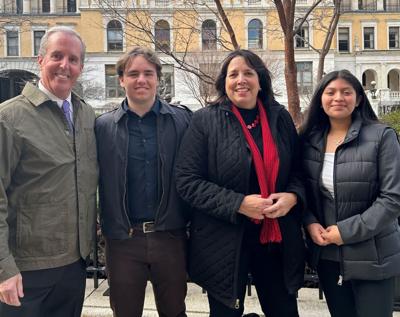





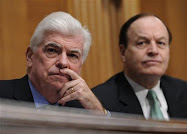
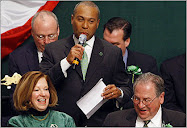










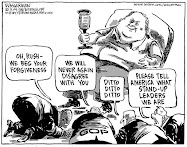












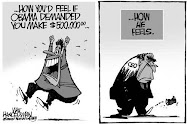










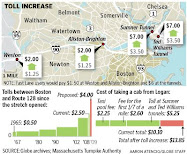




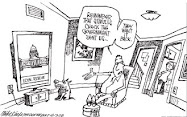


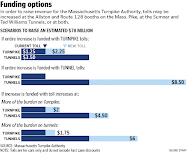



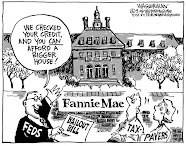



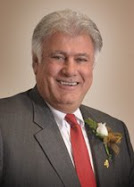





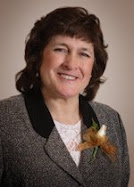

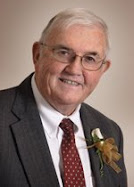


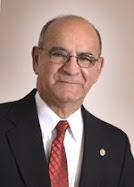







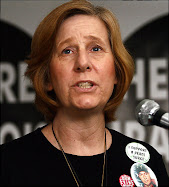




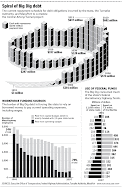





















































.png)
